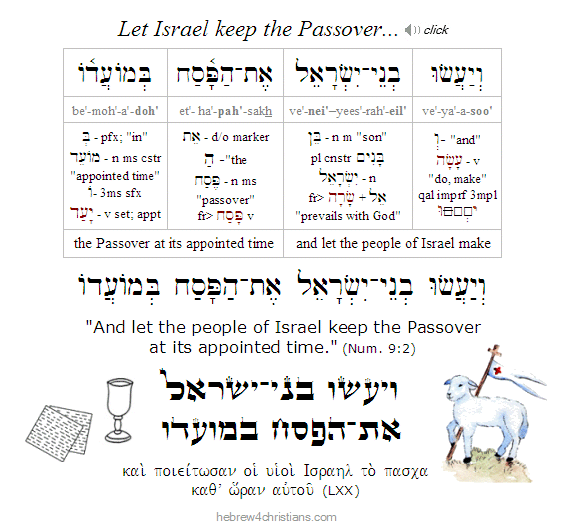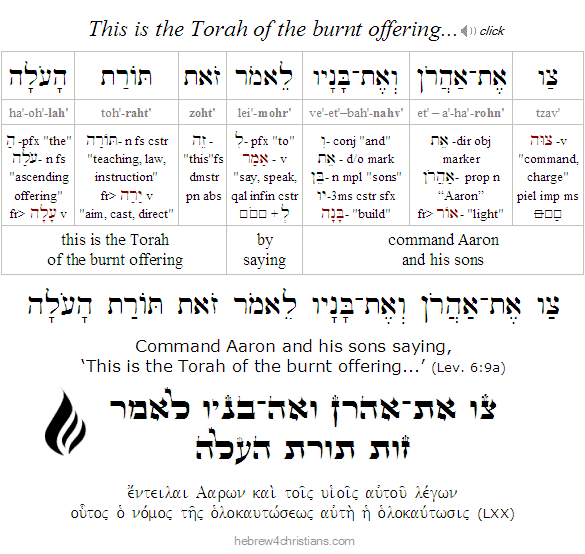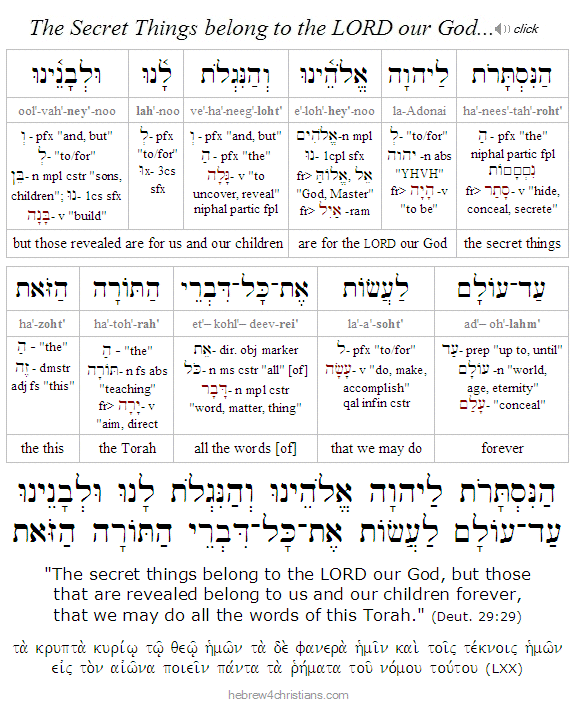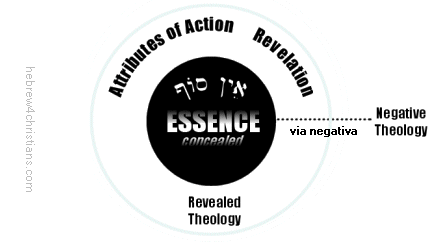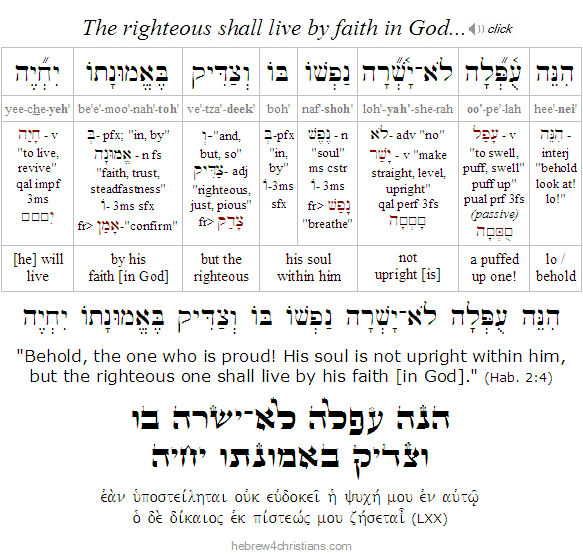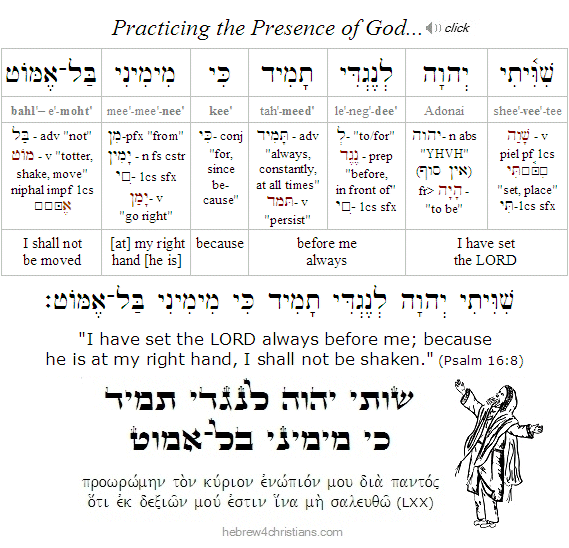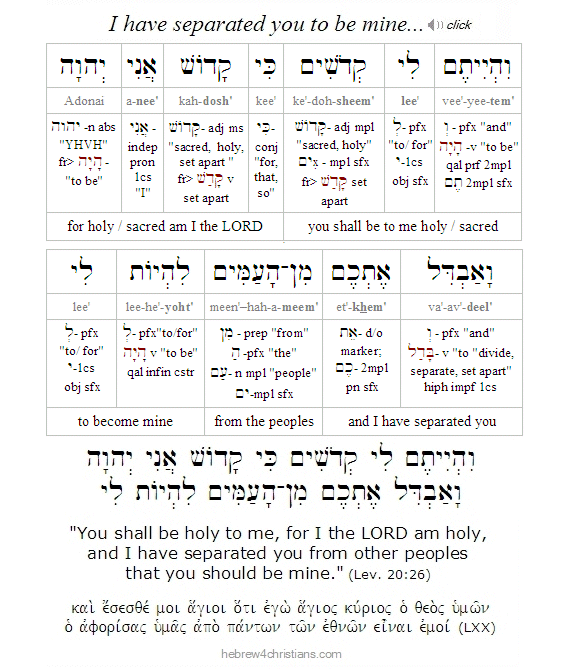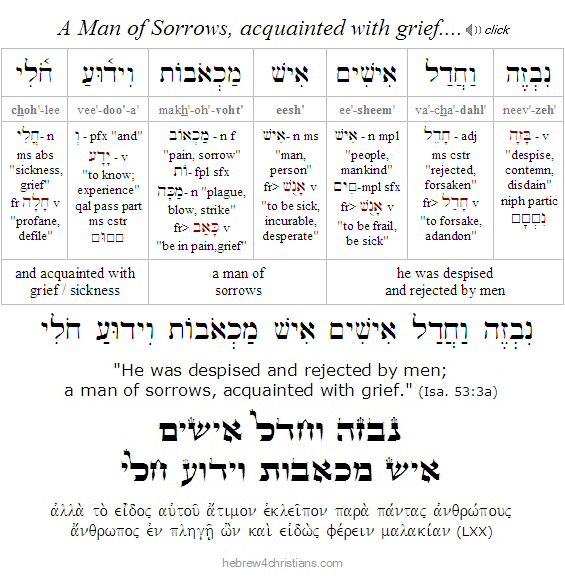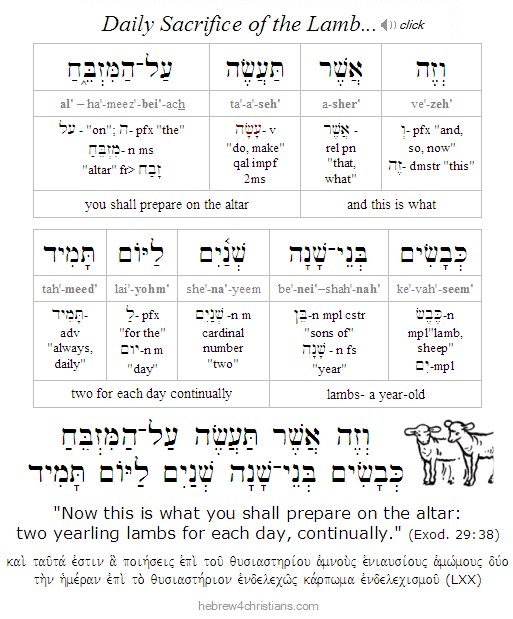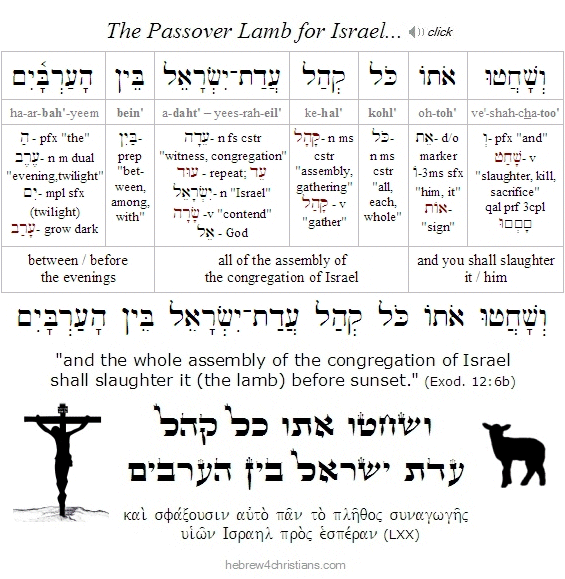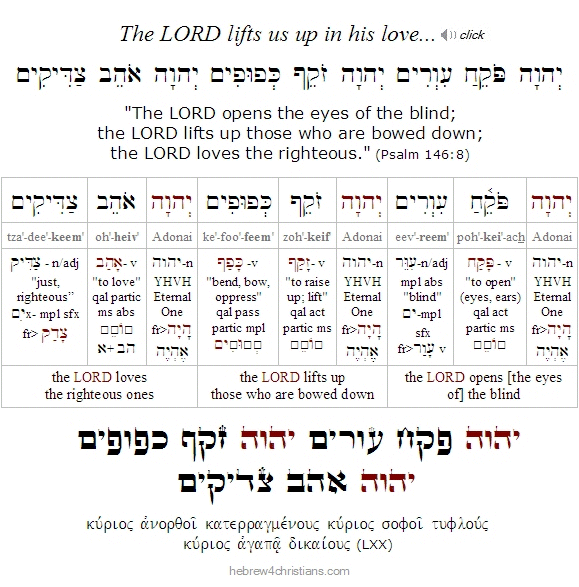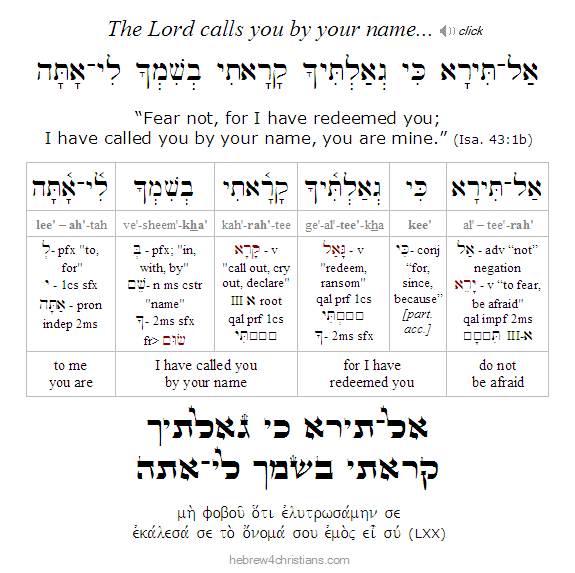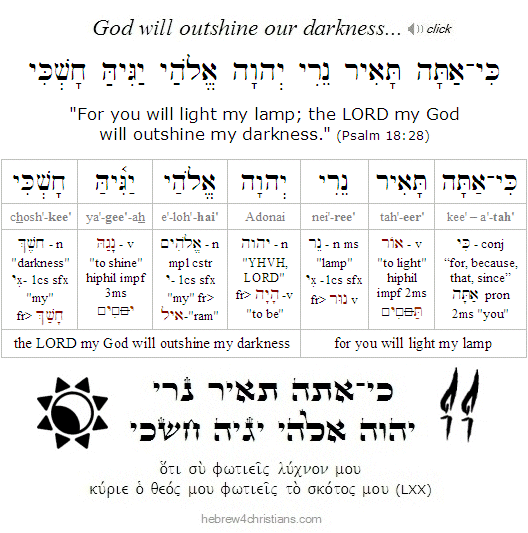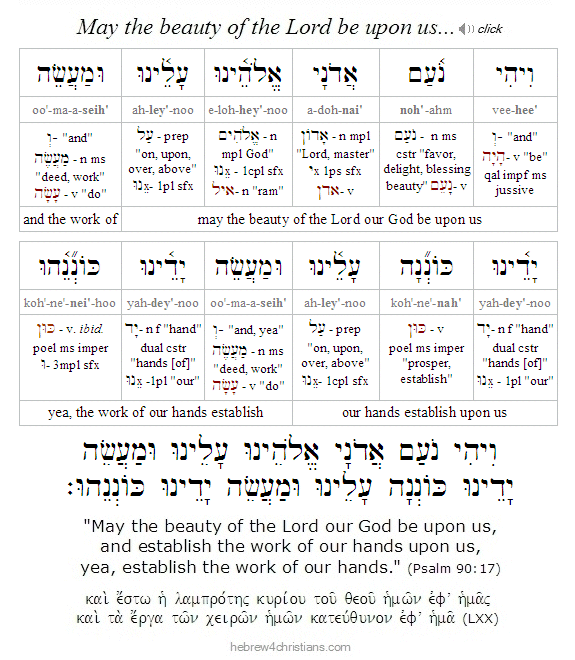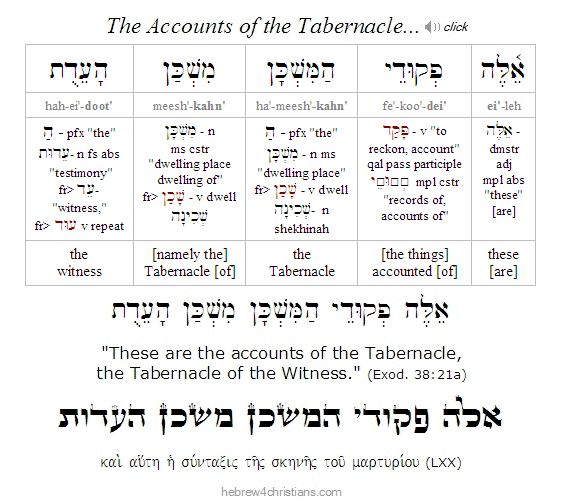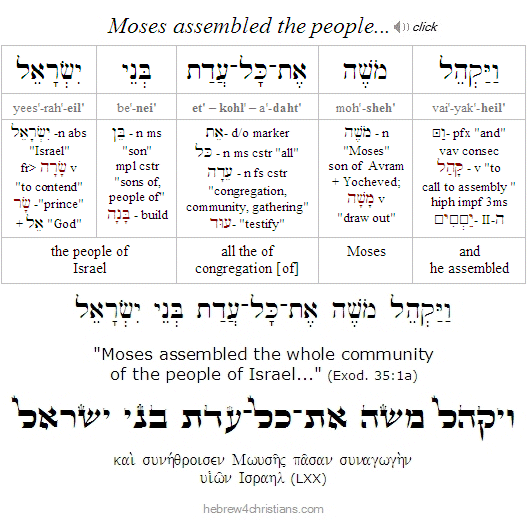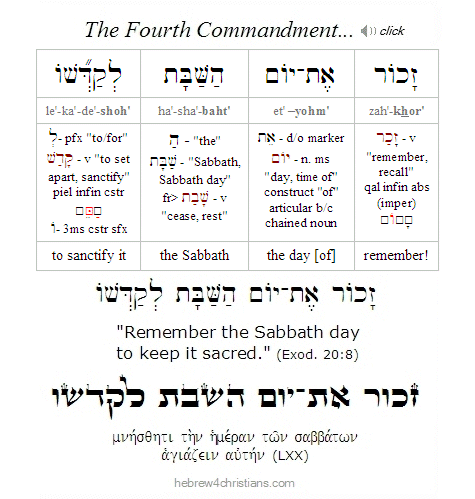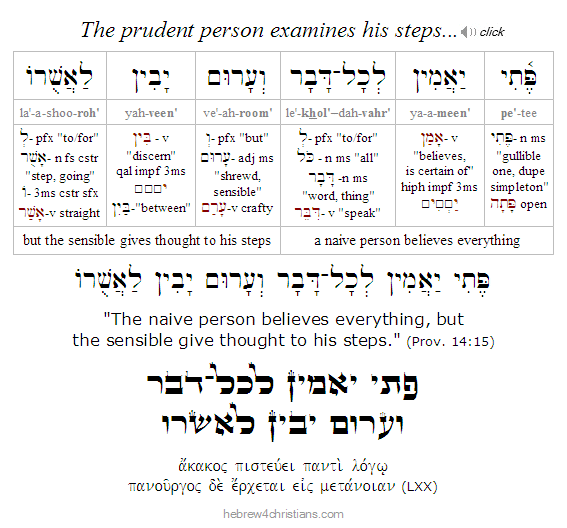|
Jewish Holiday Calendar
For March 2023 site updates, please scroll past this entry....
The Torah divides the calendar into two symmetrical halves: the Spring and the Fall, indicating the two advents of Messiah. The Biblical year officially begins during the month of the Passover from Egypt (called Rosh Chodashim, see Exod. 12:2), and the spring holidays of Passover, Unleavened Bread, and Firstfruits both recall our deliverance from Egypt and also our greater deliverance given by means of the death, burial, and resurrection of the Messiah, the great Passover Lamb of God. The holiday of Shavuot (i.e., "Pentecost") both commemorates the revelation of the Torah at Sinai as well as the revelation of the Ruach HaKodesh (Holy Spirit) at Zion, in fulfillment of the promise given by our Lord....
The intermediate months of summer end with the advent of the sixth month of the calendar, the month of Elul, which recalls the time Moses interceded on behalf of Israel after the sin of the Golden Calf. To commemorate this time of our history, we likewise focus on teshuvah (repentance) in anticipation of Rosh Hashanah and especially in anticipation of Yom Kippur, the great "Day of Atonement." In Jewish tradition the 30 days of Elul are combined with the first ten days of the seventh month (called the "Days of Awe") to set apart "Forty Days of Teshuvah" leading up to the Day of Forgiveness for Israel. Immediately following Yom Kippur, the mood changes as we begin preparing for a joyous week-long celebration called Sukkot (i.e., "Tabernacles") that concludes with the holiday of Simchat Torah.
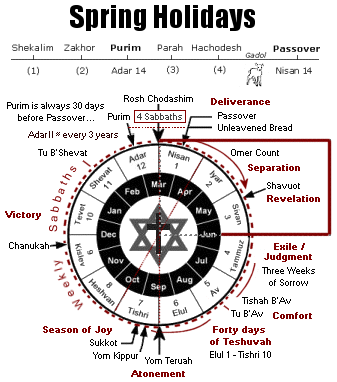 |
The Spring Holidays:
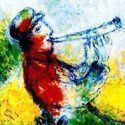
The spring holidays (חגי האביב) provide a portrait of the death, burial, and resurrection of the Messiah: Yeshua was crucified on erev Pesach (during the time of the sacrifice of the Passover lambs), buried during Chag Hamotzi (the festival of Unleavened Bread), and was resurrected from the dead on Yom Habikkurim (the Day of Firstfruits). Fifty days after Passover, on the climactic holiday of Shavuot (i.e., the feast of Pentecost), the Ruach HaKodesh (Holy Spirit) fell on the believers in fulfillment of the promise given by our Lord. Note that the giving of the Holy Spirit occurred precisely according to the calendar countdown given in the Torah (Lev. 23:15-16), and that it occurred after the resurrection of Yeshua -- just as our Messiah foretold (John 16:7; Acts 1:6-8, 2:1-4). This proves that the feasts of the LORD (מוֹעדי יהוה) were not abolished after the crucifixion. The meaning of the gospel is prefigured in the holidays given in Torah. See Luke 24:27, 24:44; John 5:46; Acts 26:22, etc.
![Spring Holiday Timeline (H4C]](../../../../About_HFC/Site_News/Archive-2023/roshchodeshim-line.gif) |
Kindly note that in accordance with both Torah and Jewish tradition, the following holiday dates begin at sundown (ויהי־ערב ויהי־בקר; Gen. 1:5):
- Month of Adar (Mon. Feb. 20th [eve]) - Wed. March 22nd [day])
Dates for Passover Week 2023:
Free Seder Guide
- Month of Nisan (Wed. March 22nd [eve]) - Thurs. April 20th [day])
- Month of Iyyar (Thurs. April 20th [eve] - Sat. May 20th [day])
- Month of Sivan (Sat. May 20th [eve] - Sun. June 18th [day])
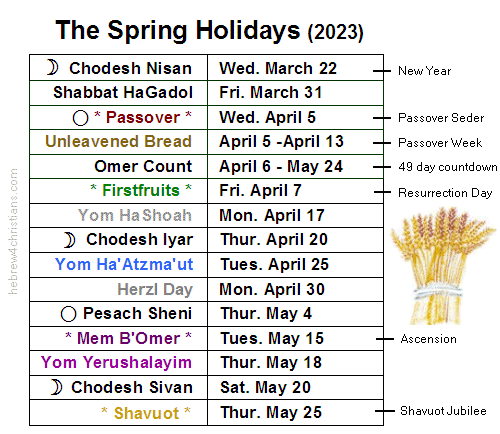 |
Note: For more information, see the Calendar Pages....
March 2023 Updates
Note: Please refresh the page (or press F5) to see the latest updates...
Passover Comfort....
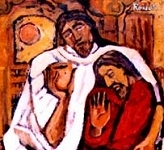
03.31.23 (Nisan 9, 5783) We don't have to needlessly complicate the Passover Seder... After all, it is the foundation for what Christian tradition calls "communion" or "the Lord's Supper." In other words, don't "over think" how to do it correctly, but focus instead on its significance in terms of Yeshua and his suffering, death, and resurrection. If you have any guests over for the evening, focus on the people present rather than following any sort of script. Yes, the traditional Seder has 15 steps that we perform, but these are simply a guide to the greater end of retelling the story of our redemption. Reviewing the great story of God's deliverance in Messiah "sets the table" for the rest of the year, and re-frames our understanding of the meaning of the gospel message itself.
There are some questions about how Yeshua actually observed the (early) Passover Seder with his disciples, and it is a bit difficult reconstructing the order of his service because we are unsure of the exact customs of that time. It is likely, however, that as a Torah-true Jew he would have performed Kiddush for the holiday (i.e., the First Cup), which recalls how God set apart his people by delivering them from bondage in Egypt, and it is also likely that he would have begun the seder with dipping karpas into salt water, followed by the breaking of the matzah (yachatz). After this, he would have retold the story of the Exodus, though he would have explained its ultimate significance in his sacrificial role as the Lamb of God. It is therefore likely he would have blessed the "Cup of Deliverance" (i.e., the Second Cup) and then ate matzah with his disciples in accordance with the Torah's instruction (Exod. 12:15). The Passover meal itself would then be eaten.
After the meal, Yeshua would have taken the matzah that was broken during the "breaking" (or yachatz) step of the service and blessed it, giving it to the disciples as a symbol of his body that would be broken for them. He then would have taken up the third cup, called the "Cup of Redemption," and sanctified it as a memorial of his blood shed for the disciples' forgiveness. This is called the barech ("blessing") step of the traditional Seder.
Since the New Testament explicitly says that Yeshua took the bread and wine "after (the Passover) supper" (Luke 22:20, 1 Cor. 11:25) it is clear that third cup, the "Cup of Redemption," is the one He raised when He said, "This cup is the New Covenant in my blood, which is shed for you" (Matt. 26:27-39). The Cup of Redemption recalls both the shed blood of the innocent lamb offered as redemption from Egypt, but it more fully commemorates the greater redemption provided by the shed blood of Yeshua our Savior, the Lamb of God and the greater Exodus from slavery to sin (Luke 9:30-31). "Unless you eat the flesh of the Son of Man and drink His blood, you have no life in you" (John 6:53).
Finally, Yeshua's seder with his disciples would have ended with the "Hallel" (ההלל לפסח), a time of singing psalms and offering thanks to God. Note that it was directly after singing Hallel that Yeshua went out to the Mount of Olives where his passionate intercession took place and where he was later betrayed by Judas Iscariot and arrested (see Matt. 26:30-50).
There are additional details about doing a Seder given in the H4C Passover Seder Guide, but I hope this entry may suffice as a succinct overview. And it should be evident that anyone can joyfully celebrate the Passover with just a few basic items such as some cups, grape juice, some matzah, a plate to hold food, a simple water basin, a Bible, and so on (there is a simple list found in the Seder Guide). God loves the humble of heart.
Shabbat HaGadol Shalom and happy Passover, chaverim!
Hebrew Lesson
Revelation 5:12 reading (click for audio):
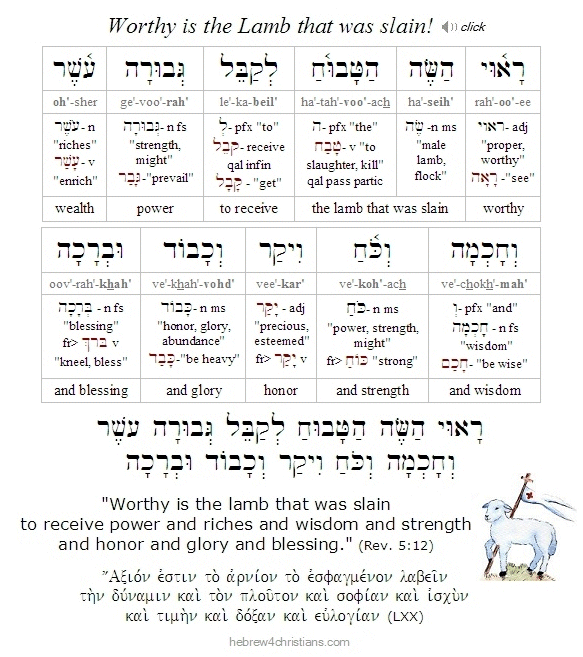 |
Our Broken Matzah...
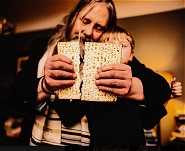
[ The holiday of Passover begins Wednesday April 5th at sundown this year... ]
03.31.23 (Nisan 9, 5783) During our Passover Seder, we will place three matzahs on the table, said to represent Abraham, Isaac and Jacob, respectively. During the fourth step of the seder, called "Yachatz" ("breaking"), the middle matzah (representing Isaac) will be broken to recall how Isaac submitted himself to be bound and sacrificed upon an altar of wood, in obedience to his father, foreshadowing the sacrifice of Yeshua by God the Father. Indeed, the Talmud states, "We break the middle matzah in tribute to Yitzchak (Isaac), who accepted the sins of the people upon himself" (Shabbos 89b). The smaller half of this broken matzah will be eaten later during the Motzi Matzah step, while the larger half will be hidden and eaten during the Afikomen step, near the end of the night...
In Hebrew, the middle of something is it's heart - the heart of the heavens, the heart of the earth, the heart of the sea, the heart of a person... Since the offering of Isaac by Abraham foretold of the greater offering of Yeshua by God Himself, when we break the middle matzah, then, we recall the broken heart of God over the pain Yeshua endured by taking our sins upon Him at the cross...."For our sake he made him to be sin who knew no sin, so that in him we might become the righteousness of God" (2 Cor. 5:21).
During his early Passover seder with his disciples, Yeshua "took matzah, and after blessing it broke it and gave it to the disciples, and said, "Take, eat; this is my body" (Matt. 26:26). Since Yeshua did this while they were eating dinner, the matzah he broke would have been the Afikomen, thereby making the connection between the hidden bread (lechem ha-nistar) that would be broken given for our deliverance. The matzah we eat during Passover is called lechem oni (לֶחֶם ענִי) - "the bread of [His] suffering" - and eating the Bread of Life that was "broken for us" remembers ish makhovot, the man of sorrows, the suffering of our LORD...
Hebrew Lesson
Deuteronomy 16:3b reading (click):
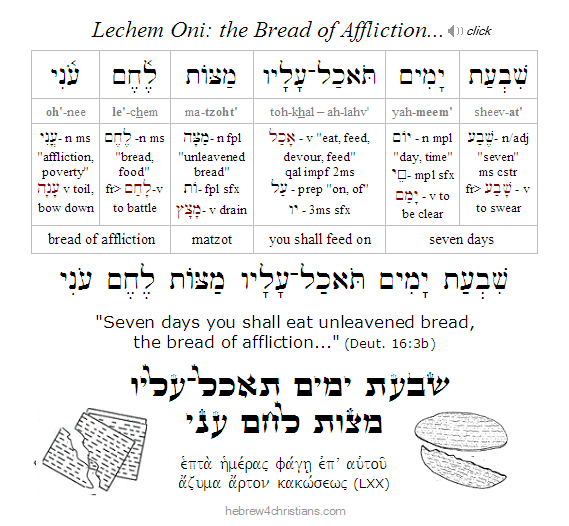 |
Our Need to Think Clearly...

[ "Clear thinking requires courage more than intelligence." -- Thomas Szasz ]
03.31.23 (Nisan 9, 5783) An axiom of (fallen) human nature is that people tend to believe what they want to believe, and that they project their biases and preconceptions while assuming they are genuinely thinking... Yeshua warned us against making hasty judgments based on superficial appearances without taking time to investigate a matter carefully: "Do not judge according to appearance, but judge with righteous judgment" (John 7:24). He also warned that "wisdom is justified by her children," meaning that reason is often a servant to the passions (Luke 7:35).
Rarely do people examine evidence and then form their conclusions but instead think selectively - listening to what appeals to them while ignoring questions that might threaten their preconceptions and prejudices. Many people allow their personal feelings about an issue to so overwhelm them that they are incapable of coherent thinking at all. This leads to the strange phenomenon that the most opinionated of people often literally do not know what they are talking about, since they rarely define their terms, they are reluctant to seriously question their own predispositions and presuppositions, and they experience "emotional incontinence" when they are challenged about their convictions. This is quite common in today's colleges and universities, which have become bastions of irrationality and cultural programming. Such people are intellectually lazy, meaning they do not want to do the work that clear thinking requires but prefer to have their intolerance confirmed, to oversimplify topics, and to find their convictions in the propaganda of the crowd, pop culture, the snobbery of their clique, or in mass media...
We must learn to be aware of how our emotional needs can be exploited by other people, and in particular, by politicians, social engineers, activists, advertisers, scaremongers, agitators, racists, anarchists, and so on. Everyone has a real need to be loved, accepted, affirmed, and so on, though it is vital to have these needs met by God, not by man.... Manipulators know how to play with our emotions, perhaps by flattery or by appealing to our anxieties, and thereby they can deceive us into accepting as true what is untrue. When we are flattered, for example, we may transfer our positive feelings of affirmation with what the person is trying to con us into accepting. Often flatterers seem earnest and sincere, but this disguises ulterior motives at work. In political rallies appeals to the crowd abound: glistening generalities, appeals to snobbery or fear, sanctimonious humbug, and feel-good groupthink are common deceptive techniques. "Yes we can! yes we can!"
Professional propagandists (e.g., mass media news) regularly employ emotional appeals and obfuscated "thinking" to intimidate us, presenting false dilemmas designed to circulate carefully scripted words and rumors intended to win our confidence and to control our thinking (i.e., disinformation, "brain washing," "fake news," etc.). Often it's not what is being said, but what is not being said - namely, the unspoken assumption that God is not real, that government is our savior, and so on. They often employ neuro-linguistic techniques of various kinds to disseminate a narrative or "politically correct" version of the "news" that is deliberately misleading and which serves the interests of the ruling elite. The use of slogans, the repetition of mantras expressing unquestioned assumptions, the dishonest tactic of making "straw men" out of other viewpoints, and the ongoing fraud that purports to provide "unbiased, objective" news is all part of the charade of our age...
It is important to discern the "bottom line" or hidden agenda at work when listening to the voices or opinions that the mass media injects into the "vocabulary" and conversation of mass culture. Our feelings are important, of course, though they are easily manipulated by the unscrupulous. Those who manipulate our emotions are bullies of the soul, trying to frighten us into joining their cause, warning us not to question their ideals at the risk of violence. The constant barrage of mass media disinformation attempts to enslave the minds of people, proclaiming the "godless gospel" that God is not in control of the world, that we must live in fear, and that we must not think too deeply or dare to question the narratives of the oligarchs and "princes" of this evil world. Like a person of moral conviction, a logical person is an "enemy of the state" these days, because the godless manipulators of our age employ deceptive techniques to suppress the truth of God and the truth about reality.
Hebrew Lesson
Psalm 37:30-31 reading (click):
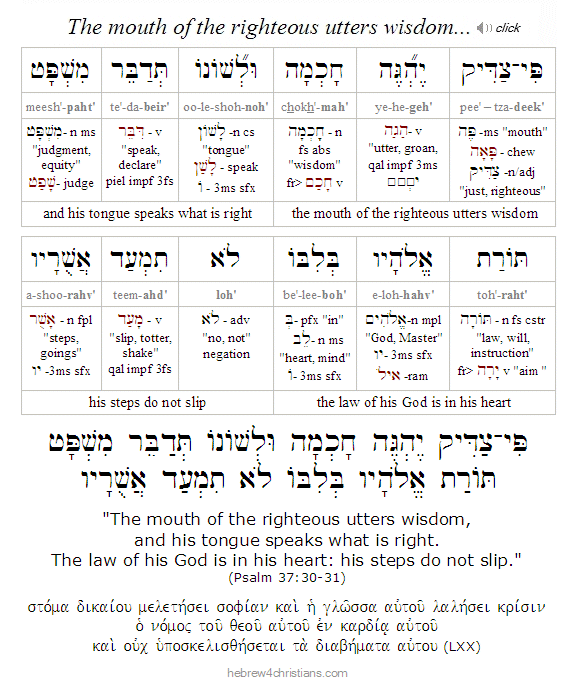 |
Believing to See...
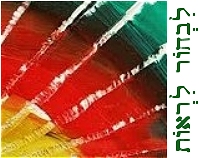
[ We do not understand in order to believe, but believe in order to understand... ]
03.31.23 (Nisan 9, 5783) Faith believes in the invisible light and accepts the truth of love that overcomes all darkness, hate, and fear. "I believe..." "I believe to see...." "I believe to see the goodness of the LORD..." "I believe to see the goodness of the LORD in the land of the living" (Psalm 27:13). I believe; I look upward; my chest aches and I long for relief; I look forward; my heart hopes even in these passing shadows, even in the midst of my fears, my afflictions, my struggles. My heart chooses to see the unseen good, the good limned by God's promise, the substance of his kindness, his blessing whispered over my fears...
The heart of faith testifies that there is "unfinished business," that there is more than meets the eye, that evil will not have the last word, and that our tears will one day forever be wiped away. Despite the ambiguity, faith "hopes against hope" that the LORD God will intervene and bring everlasting healing to us all. As it says, "Let him who walks in darkness and has no light trust in the Name of the LORD (יִבְטַח בְּשֵׁם יְהוָה) and rely on his God."
Bittachon (trust) is a word for this world, which says, "Though he slay me, I will trust in him..." Those who call upon the LORD can trust not only in concealed good behind ambiguous appearances ("all things work together for good") but also in a future, real, substantive good that will one day be clearly manifest for us all. Meanwhile, may the LORD our God keep us from such depth of sorrow that leads to sickness, darkness and despair. Amen.
Hebrew Lesson
Psalm 27:13 Hebrew (click):
Accepting True Freedom...
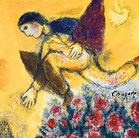
03.30.23 (Nisan 8, 5783) "If the Son shall set you free, you shall be free indeed" (John 8:36). The sages say, "Being free means that I am in the place I am supposed to be." In other words, freedom means surrendering, accepting, and yielding to God's path of blessing for you. This a place of great spiritual contentment where you are liberated from the slavery of fear and disappointment. Yeshua lived in this freedom, since He completely yielded Himself to His father's daily care (John 5:19; 8:29; 14:10).
Surrendering yourself to God's care is also the means of finding self-acceptance. God knows all your sins and has paid for them upon the cross, and therefore His love for you is the basis for which you can properly forgive and accept yourself... A Yiddish proverb reads, "If I try to be someone else, who then will be like me?" When you die, God won't ask why you weren't more like Moses, Elijah, etc., but rather, why you weren't more like the person He created you to be. No one else can do the things you are called to do, and therefore God created you as a distinct individual who reflects His glory in a unique way... "To the one who conquers I will give a white stone, with a new name written on the stone that no one knows except the one who receives it" (Rev. 2:17). Those who follow Yeshua can intellectually understand and emotionally trust that God is working all things together for good in their lives (Rom. 8:28).
Hebrew Lesson
Psalm 103:13-14 reading (click):
Every Prayer Answered...
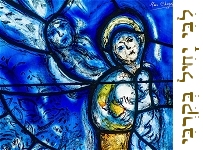
03.30.23 (Nisan 8, 5783) If you have earnestly prayed but are tempted to think that God is not responding, remind yourself that every prayer uttered to God from a heart that trusts in His redemptive love given in Messiah is indeed answered, and not a syllable goes unheeded or will be lost before heaven (Psalm 145:18; Matt. 7:7; Matt. 21:22). Just as we earnestly believe that justice will eventually be manifest and all wrongs fully redressed at the bar of Eternal Judgment -- so we understand that every utterance of the heart of faith finds compassionate response from the heart of heaven. Indeed the essence of teshuvah (return, "repentance") is heartfelt prayer, and therefore when we bring honest words and turn back to accept the truth, God's mercy and compassion are decisively evoked (1 John 1:9). The most important thing is not to lose faith, however, but to believe that God hears you and will indeed answer the cry of your heart. Decide to believe and settle your expectation. Never give up hope. God is faithful; He will do it (1 Thess. 5:24).
King David asked for God's direct and miraculous intervention to heal his soul: "Cause me to me hear your lovingkindness in the morning, for in You do I trust. Cause me to know the way I should go, for I lift up my soul to you" (Psalm 143:8). David's request was that he would be empowered to hear God's loving voice calling to his heart at the start the day, to be assured of God's kindness and favor. Note that the Hebrew verbs used in this verse are both hiphal imperatives, implying that God is the agent or cause of the action. We lift up our heart in expectation, understanding that the LORD alone is the One who is able to draw us near to Him: "You [God] cause me to hear... You [God] cause me to know..."
Hebrew Lesson
Psalm 143:8 Hebrew Reading (click):
Returning Back Home...
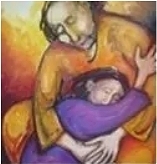
03.29.23 (Nisan 7, 5783) We must be careful not to worship an idol, that is, a false concept of God! It is entirely possible to study the Bible, to go to church or synagogue, and yet worship a pagan god. How so? By not knowing the heart of the Father; by not honoring the One who passionately seeks our healing. We know the Father (i.e., God) by the Son, that is, in "the language of Son" (Heb. 1:2; Luke 10:21-24) and in the truth of his passion. Our heavenly Father is eager to forgive and embrace all of his children (John 3:16-17). In Yeshua's famous parable of the "prodigal son," the father saw his wayward child a "long way off" and ran to embrace and kiss him - no questions asked, no explanations needed about his past. When the son nevertheless began reciting his carefully prepared speech of regret and repentance, the father barely listened, and in his overwhelming joy instructed his servants, 'Bring quickly the best robe, and put it on him, and put a ring on his hand, and shoes on his feet. And bring the fattened calf and kill it, and let us eat and celebrate. For this my son was dead, and is alive again; he was lost, and is found...' (see Luke 15:20-25).
Know the heart of the Father... God sees you while you are still "a long way off" (Rom. 5:8). He runs to you with affection when you first begin to turn your heart toward Him. Indeed, God's compassion is so great that He willingly embraces the shame of your sins and then adorns you with "a fine robe, a ring, and sandals." Your Heavenly Father even slaughters the "fattened calf" (Yeshua) so that a meal that celebrates your life may be served.
It is never too late to turn to God... The prophet Jeremiah spoke in the Name of the LORD: "Return, faithless Israel, declares the LORD. I will not look on you in anger, for I am kind (כִּי־חָסִיד אֲנִי), declares the LORD" (Jer. 3:12). When the people drew back in shame, however, God encouraged them by saying "My children, if you return, will you not be returning to your Father? Return, O faithless sons; I will heal your faithlessness. "Behold, we come to you, for you are the LORD our God."
Hebrew Lesson
Psalm 80:3 Hebrew (click):
Brokenness and Service...
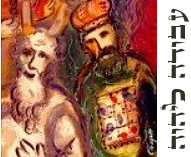
03.29.23 (Nisan 7, 5783) The service of God requires the death of the ego (Luke 9:23). Rashi says that Aaron was still deeply ashamed over the Sin of the Calf, and that is why Moses urged his brother forward: "Draw near to the altar" (Lev. 9:7). And though Aaron felt inadequate and unworthy to be the High Priest of Israel, Rashi comments that he was chosen precisely because of this. His reluctance and sense of utter unworthiness was the very reason why he was granted the role of Israel's High Priest. Likewise you might feel unworthy of your high calling in the Messiah and yet you are called to come before the Divine Presence and function as God's holy priest, no less than Aaron... You are chosen in your weakness; you are beloved because of your lowly standing; you are made "pure in heart" because you realize your own inner nothingness and need before the Savior.... Your brokenness is a gift that magnifies God's unending love and grace (1 Cor. 1:26-29).
The sages sometimes say that God is closer to sinners than to "saints." Anthony de Mello once wrote: "God in heaven holds each person by a string. When you sin, you cut the string; but then God ties it up again, making a knot - and thereby you are brought a little closer to him. Again and again your sins cut the string - and with each further knot God keeps drawing you closer and closer." Amen. Though we abhor our sin and lament our transgressions, the LORD is tender in his compassionate love to us, drawing us close to him as we reach out for his forgiveness and restoration. He binds up our wounds. That is the essence of teshuvah, after all, to turn to the Lord for life and acceptance, despite our failures and brokenness.
Hebrew Lesson
Psalm 34:18 reading (click):
Choosing to Believe...
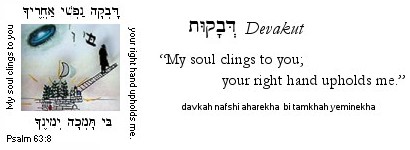
03.29.23 (Nisan 7, 5783) The Spirit of God cries out, "choose life that you may live!" (Deut. 30:19), which implies that is our responsibility to believe in the Reality of God, to trust in his providential care, to affirm that "all is well and all manner of thing shall be well," and to understand that our present struggle is designed by heaven to help us grow in grace and the knowledge of the truth (1 Pet. 3:16). Our faith affirms that "all things work for our good" (Rom. 8:28) and therefore we are constrained to "choose life" -- both in happier moments when all goes well, but also (and especially) in the midst of our afflictions, in the panting of our hearts for deliverance, in the loneliness of our heartache, and in the lament of our soul over the pain of our sins (Psalm 25:16).
Faith refuses the messages of fear, silences the angry voices of this world, and resists the idols of the age that offer spurious respite from the struggle at hand... "If we live by the Spirit let us also walk in the Spirit" (Gal. 5:25). We may ask God to help us choose life, but what does that mean if not asking God to grant us the ability to believe in the miracle of love - despite everything else? Choosing life involves the surrender of the heart and the will to the promise of God, choosing to receive the blessing of the Divine Presence – his word, his promise, and his healing – and resolutely deciding to live in light of that hope today...
To de-cide means to "cut away" other options. Yeshua tells us to "take up the cross and die" because that which is dead no longer suffers from ambivalence and carnal inner conflict... "I have been crucified with Messiah (Χριστῷ συνεσταύρωμαι): it is no longer I who live, but Messiah who lives in me. And the life I now live in the flesh I live by faith in the Son of God, who loved me and gave himself for me" (Gal. 2:20). There are no "half-measures" here; when we accept that we have already been crucified with Messiah, we confess that our true life is not here, in this world, but is bound up in Him, and that God alone is our ultimate concern and end. In that sense, the life we now live in the flesh "catches up" with the truth and power that God has decreed for our salvation.
If we are spiritually identified with Yeshua, we are both made "dead" to this age (olam hazeh) and awakened to a realm that transcends the appeals of the flesh (olam habah). We no longer live chayei sha'ah (חַיֵּי שָׁעָה, "fleeting life") but chayei olam (חַיֵּי עוֹלָם, "eternal life"). "If then you have been raised with Messiah, seek the things that are above (τὰ ἄνω ζητεῖτε), where the Messiah is seated at the right hand of God; focus your thoughts on the things above - not on things here on earth - for you have died, and your life has been hidden with Messiah in God" (Col. 3:1-4). The aorist verb "you have died" indicates "you have died once for all," that is, that this is a condition granted by the power and agency of God on your behalf. You don't "try to die" to the flesh; you accept what God has done by killing its power over you through Yeshua...
All this takes faith of course. Affirm then that you are dead to this world; you are dead to sin's power; you are set free and no longer enslaved to the deception of the worldly matrix, etc. Now you are made alive to an entirely greater and more powerful order and dimension of reality, namely, the spiritual reality that is not disclosed to the vanity of this age. Therefore we are to consciously focus our thoughts (φρονέω) on the hidden reality of God rather than on the temporal world that is passing away: "For we are looking not to the things that are seen but to the things that are unseen. For the things that are seen are transient (i.e., "just for a season," καιρός), but the things that are unseen are eternal" (2 Cor. 4:18). Amen.
Hebrew Lesson
Psalm 25:16-17 reading (click for audio):
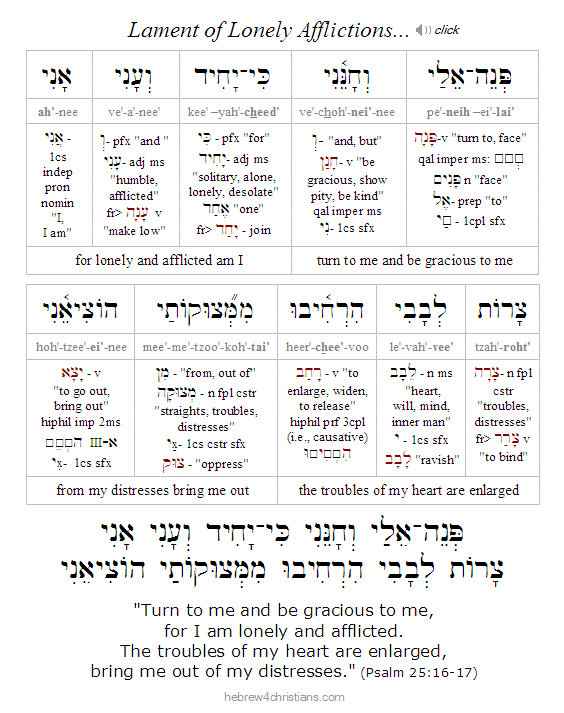 |
Affirming the Light...
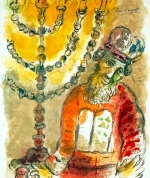
[ "O house of Jacob, come and let us walk In the light of the LORD" - Isaiah 2:5 ]
03.29.23 (Nisan 7, 5783) From our Torah for this week (i.e., Tzav) we read: "The fire on the altar shall be kept burning on it; it shall not be extinguished" (Lev. 6:12). The sages say do not read "burning on it" but rather "burning in him" (בּוֹ), referring to the heart of the priest. And where the text says "it (i.e., the fire) shall not be extinguished" (לא תכבה), read instead "extinguish (תִכְבֶּה) the negative (לא)" by trusting in God's promise for our good, despite any temporary setbacks or apparent failures. The Holy Spirit imparts the fire of faith that fills our hearts with hope (רוח נכון), affirming with "tongues of fire" words of life and light that vanquish darkness. As it is written: "Light dawns in the darkness for the upright; He is gracious, full of compassion, and righteous" (Psalm 112:4).
זָרַח בַּחשֶׁךְ אוֹר לַיְשָׁרִים
חַנּוּן וְרַחוּם וְצַדִּיק
zah·rach · ba·choh'·shekh · ohr · lai·shah·reem
cha·noon · ve·ra·choom · ve·tza·deek

"Light dawns in the darkness for the upright;
He is gracious, full of compassion, and righteous."
(Psalm 112:4)
Download Study Card

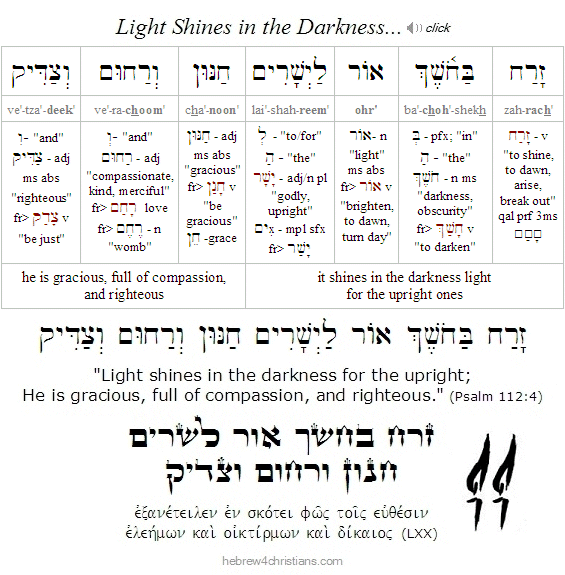
Spiritually speaking, the first step is to find hope... The Divine Light is seen by means of the eye of faith (עין האמונה), and therefore we find strength by trusting in God's Presence, even though we cannot presently see Him (2 Cor. 4:18; 5:7). "Trust in the LORD with all your heart, and do not lean on your own understanding. Know Him in all your ways, and He will straighten your paths. Be not wise in your own eyes; fear the LORD, and turn away from evil" (Prov. 3:5-7). Wait on the LORD and He will strengthen your heart....
We must keep courage, remain steady as we fight the good fight of faith. As it is written, "The LORD is my light and my salvation; whom shall I fear? The LORD is the stronghold of my life; of whom shall I be afraid? When evil men attack me to devour my flesh, when my adversaries and enemies attack me, they totter and fall. Even if an army is deployed against me, I do not fear; even if war is rises against me, I remain full of trust" (Psalm 27:1-3).
The Midrash says, "The Holy One Himself, as it were, made light for the upright. Thus it says, "The LORD is my light and my salvation" (Psalm 27:1) and "When I sit in darkness, the LORD will be a light to me" (Micah 7:8). While I sit in darkness in this world, during these latter days before the promised return of Yeshua, when troubles may afflict me and lawlessness may abound – then God's light will shine brighter still, for the LORD is gracious to all who put their hope in Him, and this favor and love will be manifest for me.
Let us affirm our confidence: The darkness of this world forever is swept back before the overmastering radiance and power of Yeshua, the King of Glory, the Root and Descendant of David, and the Bright Morning Star (Rev. 22:16). Those who believe in Him are given the "light of life" that overcomes the darkness of this world (John 8:12).
 |
nivchan le'ahavah
Testing of the Reins...
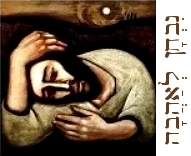
03.28.23 (Nisan 6, 5783) The phrase "mitzvah haba'ah ba'aveirah (מִצְוָה הַבָּאָה בַּעֲבֵירָה) means a mitzvah that comes about by means of a transgression of another mitzvah. The sages cite the example of working on the Mishkan during the Sabbath day because even though working on the Sanctuary is indeed a blessing, it is not truly so if it violates God's will (Exod. 35:1-2). The sages liken this to making bread from stolen wheat -- and then reciting the "ha'motzi" blessing over the bread (Bava Kamma 94). Likewise, giving tzedakah that has been gained through illicit means (such as stealing) is forbidden, as is the offering of any sacrifice that is defective or unwanted (Deut. 15:21).
Such considerations reveal that there are "weightier matters" of Torah, and therefore Yeshua warned against making a pretense of obedience at the expense of what is more important to God's heart. For example, tithing "mint and cummin" should not preempt the duty to care for the welfare of parents who are in need (Luke 11:42; Mark 7:9-13). Nor should "religious" activities be regarded as a substitute for surrender of the heart. On the other hand, working to pull a sheep that has fallen into a well on the Sabbath is more important than disregarding the suffering of the animal and the loss to the owner (Matt. 12:11). After all, what good is keeping a commandment in a selfish or self-serving way? Holiness is not about self-preservation as much as it is a form of surrender. We must always remember that God looks upon the heart and "tests the reigns" (Psalm 7:9; Jer. 17:10).
The inner attitude of the heart (יַחַס לֵב) is essential. In ancient Hebrew, the "kidneys" (i.e., keliyot: כְּלָיוֹת) were thought to produce the "gut feelings" or "inner life" of a person, perhaps because they filtered the blood. Indeed your attitude and affections are foundational to the Torah of life. John Calvin wrote: "The Law is kept only when men are just and kind and true toward each other, for thus they testify that they love and fear God." In Jewish thinking, the basic respect for others is sometimes called "derekh eretz" (דֶּרֶך אֶרֶץְ).
We have to be careful not to miss the goal of our redemption, which is to become sanctified by embracing the heart, vision, and character of our Lord (Lev. 11:44). Yeshua is the pattern, and his life was unquestionably marked by qualities of mercy, forgiveness, and love. He overlooked our sins and transgressions by focusing on the weightier matters of our need for healing and reconciliation with God. On the other hand, he receives us as his children and therefore we will undergo "scourging" or testing of our "kishkas" (Deut. 8:5; Heb. 12:6). Indeed the Lord will allow "scorching" experiences by which our character defects are exposed and through which we may be refined by teshuvah. In the furnace of trials, God will separate us from our bad qualities, lifting off the dross to reveal the clear brilliance of his heart within us. As C.S. Lewis once said, "God does not love us because we are good, but God will make us good because He loves us." Amen.
Hebrew Lesson
Jeremiah 17:10 reading (click):
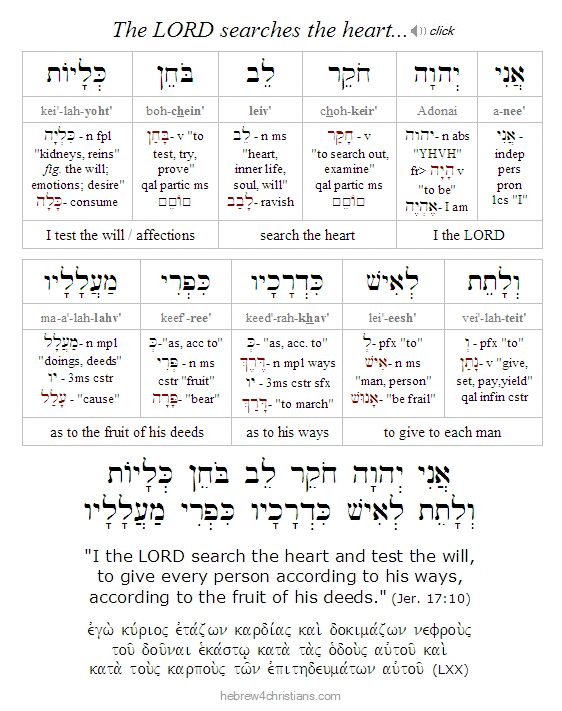 |
Passion's Inner Fire...

[ The following is related to our Torah reading this week, parashat Tzav. Please read the Torah portion to find your place here... ]
03.28.23 (Nisan 6, 5783) "This is the law for the burnt offering (olah): it is what ascends on the hearth of the altar all night long, until morning..." (Lev. 6:9). In a Sefer Torah (i.e., handwritten Torah scroll), the Hebrew word for "hearth," or the floor of the altar's fireplace, is mokdah (מוֹקְדָה), written by the scribes using a miniature Mem (מ). The Kotzker Rebbe comments that since the altar symbolizes inner life, the smaller Mem teaches that the fire in one's soul should be understated - that it should burn within as an steady inner passion - not with flash, ostentation, or flamboyance. People sometimes get confused and think that passion for God means hype, loud music, special experiences, and so on, though it was steady "inner fire" that moved Yeshua to remain focused to endure the cross.
Hebrew Lesson
Psalm 39:7 Hebrew (click):
Dear friends, the Lord has not taken us this far only to abandon us now... He has solemnly promised never to leave nor forsake us (Deut. 31:8; Isa. 41:10; Heb. 13:5). There is wonderful joy ahead, even though you have to endure many trials for a little while (1 Pet. 1:6). Therefore let your heart of faith give thanks to the LORD, for His love and mercy endure forever. Shalom and every blessing be yours in Yeshua...
Lamentation and Healing...
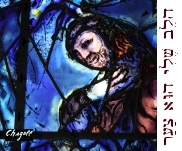
03.28.23 (Nisan 6, 5783) "My eye grows dim through sorrow; every day I call upon you, O LORD; I spread out my hands to you... Help me, O LORD my God; save me according to your love" (Psalm 88:9; 109:26). How long, O LORD, will you forget me forever? (Psalm 13:1). Such words pierce through the clichés and chatter about religion, theology, and so on, voicing the lament of a soul in trouble, desperately crying out to God for help...
The language of prayer is often quickened by affliction and trouble, for the heart senses it must find God or die. "The troubles of my heart are enlarged..." (Psalm 25:17). "Heal me, O LORD, and I will be healed..." for if you will not help, O Lord, then I will perish; I will be consumed in my grief, I will waste away in the void of darkness... "Why is my pain unceasing, my wound incurable, refusing to be healed? Will you be to me like a deceitful brook, like waters that fail?" (Jer. 15:18). O Lord, "I am poor and needy; my heart is pierced within me" (Psalm 109:22). "Have mercy upon me, O LORD; for I am weak: O LORD, heal me; for my bones are vexed. My soul is also sore vexed: but thou, O LORD, how long?" (Psalm 6:2-3).
During hours of pain or mental anguish prayer becomes spontaneous, raw, unscripted and devoid of empty words. Anguish moves us right to the point, bypassing other concerns, distilling the heart's cry for God's help. If you feel overwhelmed, pour out your heart in prayer... It is not the words of the prayer that matter as much as it is the fervor, the intensity of the heart, and the passion that yields itself before God. "Blessed are they that mourn, for they shall be comforted" (Matt. 5:4). "The LORD is near to the broken of heart and saves the contrite of spirit" (Psalm 34:18).
צָרוֹת לְבָבִי הִרְחִיבוּ
מִמְּצוּקוֹתַי הוֹצִיאֵנִי
tzah-roht · le-vah-vee · heer-chee'-voo
mee-me-tzoo-koh-tai · hoh-tzee-ei'-nee

"The troubles of my heart are enlarged;
O bring me out of my distresses."
(Psalm 25:17)

The Torah of Passover...
[ The holiday of Passover (i.e., Pesach) begins Wednesday, April 5th at sundown this year... ]
03.27.23 (Nisan 5, 5783) All of the Biblical holidays (חגי תורה) begin with the primordial holiday of Passover (חג הפסח). On the first of Nisan, two weeks before the Exodus, God showed Moses the new moon and commenced the divine calendar. Two weeks later, the Israelites kept the Passover by daubing the blood of the lamb on their doorposts. At the stroke of midnight of Nisan 15 God sent the last of the ten plagues on the Egyptians, killing all their firstborn. On the 6th of Sivan, exactly seven weeks after the Exodus (49 days), Moses first ascended Sinai to receive the Torah (Shavuot). Forty days later, on the 17th of Tammuz, the tablets were broken. Moses then interceded for Israel for another forty days until he was called back up to Sinai on Elul 1 and received the revelation of the Name (YHVH). After this, he was given the second tablets and returned to the camp on Tishri 10, which later was called Yom Kippur, or the "Day of Atonement." Later the holiday of Sukkot ("Tabernacles") was instituted to commemorate God's care for the people as they trekked through the desert en route to the promised land.
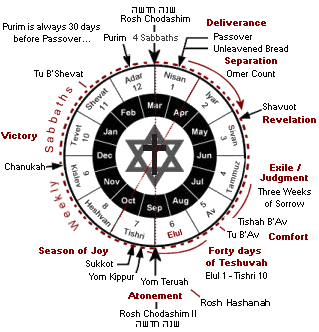 |
The Exodus from Egypt (סיפור יציאת מצרים) is perhaps the most fundamental event of Jewish history. In addition to being commemorated every year during Passover (Exod. 12:24-27; Num. 9:2-3; Deut. 16:1), it is explicitly mentioned in the very first of the Ten Commandments (Exod. 20:2), and it is recalled every Sabbath day (Deut. 5:12-15). The festivals of Shavuot ("Pentecost") and Sukkot ("Tabernacles") derive from it (the former recalling the giving of the Torah at Sinai and the latter recalling God's care as the Exodus generation journeyed from Egypt to the Promised Land). Indeed, nearly every commandment of the Torah (including the laws of the Mishkan (i.e., "Tabernacle") and the sacrificial system) may be traced back to the story of the Exodus. Most importantly, the Exodus prefigures and exemplifies the work of redemption given through the sacrificial life of Yeshua the Messiah, the true King of the Jews and the great Lamb of God (שׂה האלהים).
Notice something very important, friends. The very first occurrence of the word "Torah" (תורה) in the Scriptures refers to the obedient faith of Abraham (Gen. 26:5), and the second occurrence refers to the law of Passover: "There shall be one law (תורה אחת) for the native and for the stranger who sojourns among you" (Exod. 12:49). There is a link between these two occurrences. Abraham lived before the time of the Exodus, of course, and therefore he obeyed the law of Passover by means of the Akedah (the sacrifice of his "only begotten" son Isaac). Despite offering his son up upon the altar at Moriah, Abraham believed in the LORD and it was credited to him as tzedakah (righteousness). Abraham's obedience revealed that the inner meaning of Torah is that the "righteous shall live by faith" (Hab. 2:4, Rom. 1:17). The Torah of Passover (תורת הפסח) likewise teaches that redemption from death is possible through the exchange of an innocent sacrificial victim. The blood of the Passover was "a sign" of imputed righteousness that was obtained entirely by faith. This is the "korban" principle of "life-for-life" that underlies the Torah of the sacrificial system of the Tabernacle as well.
Ultimately all true Torah points to Yeshua, who is the divinely appointed Redeemer and the beginning and goal of all of creation... "When the fullness of time (τὸ πλήρωμα τοῦ χρόνου) had come, God sent forth his Son, born of woman, born under the Torah, to redeem those who were under the Torah, so that we might receive adoption as sons" (Gal. 4:4-5).
Hebrew Lesson
Numbers 9:2 Hebrew reading:
Related Topics for Passover:
The Sabbath before Passover...
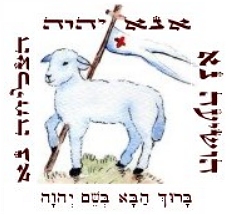
03.26.23 (Nisan 4, 5783) The Sabbath that immediately precedes the holiday of Passover is called the "Great Sabbath" (i.e., Shabbat HaGadol: שבת הגדול), in honor of the time when the first generation set aside the lamb for the Passover Sacrifice (i.e., korban Pesach: קרבן פסח).
During the time of the Temple it was customary to obtain the Korban Pesach (i.e., Passover lamb) four days before Passover so that worshipers could make sure that their lambs had no blemishes which would preclude them from being offered as sacrifices. This was done to fulfill the instructions given in Exodus 12 that the lamb for Passover be "without spot or blemish." Interestingly, this period of time allowed time for each family to become personally attached to their lamb, so that it would no longer simply be "a lamb" (Exod. 12:3) but rather their lamb" (Exod. 12:5). Indeed the Torah refers to "the" Lamb of God, as if there was only one: "You shall keep it [i.e., the Passover lamb] until the fourteenth day of this month, when the whole assembly of the congregation of Israel shall slaughter him (אתוֹ) at twilight (Exod. 12:6). Note that the direct object "him" (i.e., oto) can be read as Aleph-Tav (את) combined with the letter Vav (ו), signifying the Son of Man who is First and Last.
![Spring Holiday Timeline (H4C]](../../../../About_HFC/Site_News/Archive-2023/March/shabbathagaolline.gif) |
Shabbat HaGadol foreshadowed the offering of Yeshua as the "Lamb of God" who takes away the sins of the world. The New Testament notes that it was a few days before Passover when Yeshua made His triumphant entry into Jerusalem riding on a donkey, signifying His Messiahship, in fulfillment of the prophecy of Zechariah: "Rejoice greatly, O daughter of Zion! Shout aloud, O daughter of Jerusalem! Behold, your king is coming to you; righteous and having salvation is he, humble and mounted on a donkey, on a colt, the foal of a donkey" (Zech. 9:9). During this time, when the pilgrims had come to select the lamb for the Passover sacrifice - they saw Yeshua and cried out: hoshiah na (הושׁיעה נא), meaning "please save" or "save now" (in English this phrase was translated from the Latin to form "Hosanna!"). The people spontaneously began singing Psalm 118:25-26 in anticipation of the fulfillment of the great Messianic hope:
אָנּא יְהוָה הוֹשִׁיעָה נָּא
אָנָּא יְהוָה הַצְלִיחָה נָּא
בָּרוּךְ הַבָּא בְּשֵׁם יְהוָה
בֵּרַכְנוּכֶם מִבֵּית יְהוָה
ah·nah · Adonai · hoh·shee·ah · nah
ah·nah · Adonai · hatz·lee·chah · nah
bah·rookh · ha·bah · be·shem · Adonai
be·rakh·noo·khem · mee·beit · Adonai

"Please, LORD save us! Please, LORD rescue us!
Blessed is He who comes in the Name of the LORD
We bless you from the house of the LORD."
(Psalm 118:25-26)
Hebrew Study Card
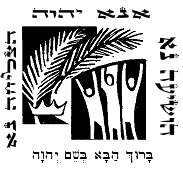
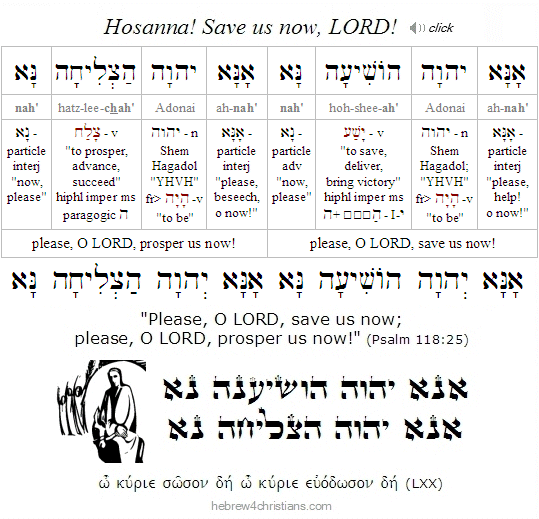
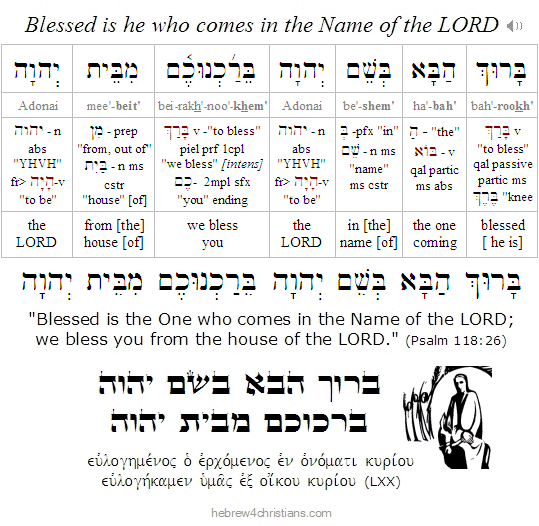
The Haftarah for Shabbat HaGadol (Malachi 3:4-24) foretells of Yom Adonai (יוֹם יהוה), the great Day of the LORD, and the return of Yeshua as Mashiach ben David. May that day come soon, chaverim. For more information, click here.
Parashat Tzav - פרשת צו
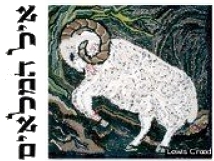
[ Every year we read Parashat Tzav before the holiday of Passover... ]
03.26.23 (Nisan 4, 5783) Shavuah tov, chaverim! In our Torah reading for the Sabbath before Passover (i.e., parashat Tzav) we learn how the first priests of Israel were consecrated for service by the blood of the lamb. First Aaron and his sons were washed with water, arrayed in priestly garments, and anointed with holy oil. During this ordination ceremony, a sin offering and burnt offering were offered on their behalf, and then a special "ram of ordination" (i.e., eil ha-milu'im: איל המלאים, lit. "ram of abundance [מָלֵא]") was slaughtered. Some of this ram's blood was applied to the right ear, right thumb, and big toe of the Aaron and his sons (a picture of Yeshua as our suffering High Priest), and the rest of the blood was dashed upon the sides of the altar. After its slaughter, Moses took some unleavened bread and put it in the hands of the priests to perform tenufah (a wave offering) before the altar (a picture of the resurrection).
 |
As followers of Yeshua, we too have been anointed with the blood from the "Ordained Lamb" -- Yeshua as our Kohen Gadol of the better covenant (Heb. 8:6). And we too have been anointed with the sacred shemen (oil) that symbolizes the presence and aroma of the LORD in our lives. As followers of Yeshua we are therefore truly "...a chosen race, a royal priesthood, a holy nation, a people for his own possession, that you may proclaim the excellencies of him who called you out of darkness into his marvelous light" (1 Peter 2:9). As Yeshua said: "You did not choose me, but I chose you and appointed you that you should go and bear fruit and that your fruit should abide, so that whatever you ask the Father in my name, he may give it to you" (John 15:16). May the LORD God of Israel be pleased to help you serve Him in the truth...
Mystery of Knowing God...
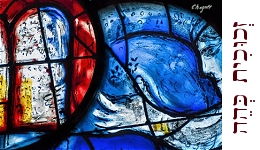
03.26.23 (Nisan 4, 5783) I had mentioned in another place that the letter Aleph (א) at the end of the word vayikra ("and he called") is written smaller than the other letters in the word, which the sages say represents the humility of God - both in his condescension to be known by human beings, but also in his willingness to be "sacrificed" by making room for us within the creation. Just as the Cloud of Glory so overwhelmed the Mishkan (Tabernacle) so that Moses himself was unable to enter (Exod. 40:35), so all of reality is filled with God's glory, and thankfully God has made a place for us by means of his sacrifice... This idea is sometimes called "tzitzum" (צימצום) in Jewish theology, which means God had to "contract" or "empty" himself in order to make space for the created universe (the idea was expressed in the Christian doctrine of "kenosis," or the emptying of God in the incarnation of Yeshua).
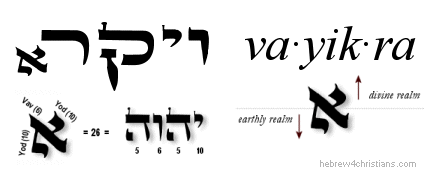 |
Existentially speaking, there is an ambivalence regarding how we may relate to God. On the one hand, drawing close to God is a dangerous prospect. When Moses first encountered the LORD at the burning bush, for example, he was afraid to look upon God and was told not to draw near because the place was holy (Exod. 3:5). Moses was afraid because God was transcendent, holy, unapproachable, incomprehensibly powerful and unutterably glorious. This unease or dread is called yirat Adonai (יראת ה), or the "fear of the LORD."
On the other hand, drawing close to God is the heart's greatest desire (and need), and blessedness is found as we learn to trust in Him and know Him in all our ways (Prov. 3:5-6). This is called devakut (דבקות), or "cleaving" to the LORD in communion and surrender to his grace (Deut. 10:20). The ambivalence arises because the Scriptures teach that we should both fear and love the Lord -- seemingly contradictory and antithetical passions within the soul (Deut. 10:12; Psalm 2:11; Heb. 10:31).
Recall that after Israel's sin with golden calf, Moses despaired over his life and underwent a 40 day period of teshuvah and "face-to-face" (פָּנִים אֶל־פָּנִים) prayer before the Lord. When God finally reassured him he had found grace in his eyes and that he would remain faithful to Israel because of his intercession, Moses asked God to show him his glory (Exod. 33:12-18). The Lord then replied: "I will make all my goodness pass before you and will proclaim my name 'The LORD' before you (וקָרָאתִי בְשֵׁם יְהוָה לְפָנֶיךָ). And I will be gracious to whom I will be gracious, and will show mercy on whom I will show mercy." But he further said, "you cannot see my face, for man shall not see me and live" (Exod. 3:19-20). The Lord then said to Moses, "there is a place by me where you shall stand on the rock (וְנִצַּבְתָּ עַל־הַצּוּר), and while my glory passes by I will put you in a cleft of the rock, and I will shield you with my hand until I have passed by. Then I will take away my hand, and you shall see my back (וְרָאִיתָ אֶת־אֲחֹרָי), but my face shall not be seen (וּפָנַי לֹא יֵרָאוּ)."
Now this is a fascinating and puzzling narrative, because first we are told Moses spoke with God "face to face" but then God told Moses no one can see his face and live, and furthermore, though Moses would not be given a direct vision of God's face, God would permit Moses to see his "back" (אֲחֹרָי), that is, a vision apprehended at some sort of a distance, or at least in some sort of indirect way....
Perhaps Moses could not see the glory of God (כּבוד יהוה) because it is simply too intense to be apprehended by a human being. God's essence is beyond all human comprehension and therefore is ultimately mysterious (Isa. 40:28; 55:8; Psalm 145:3; 147:5). No more can you stare directly at the sun without damaging your eyes that you can look directly upon the face of God without blowing your mind.... The "back side" of God then represents his accessibility to us - his reflection "through the glass" - wherein his face remains veiled from view.
As I mentioned above, there is a sort of tension implied in the very act of creation whereby God must limit or "empty" himself in order to "make a place" for anything outside of himself. God is the only Necessary Being, which is alluded to in the original definition of YHVH (יהוה) as ehyeh (אהיה), the great "I am." As Life or Being itself, God is essential to all that exists, though all that exists is contingent (i.e., dependently derivative) and therefore fundamentally different in its ontology (being-status) than the Being of God. So there is this dualism or eternal gap between the infinite and the finite.
Now the divine act of "making a place" for creation is, from a human and cognitive perspective, a sort of divine disguise, or a "hiding of face," and the meaning of special revelation presents an invitation to seek God's presence despite the ambiguity and uncertainties of the venture. We must exercise care as we seek God, however, because we are explicitly commanded not to make any image or likeness of God, and yet it is difficult not to use language that is analogical when we think about spiritual matters (1 Cor. 2:13). If we are forbidden to make any image of God, how can we draw close to that which is beyond all the power of our imagination (Isa. 40:25)?
So the life of faith is paradoxical, since (by definition) the idea of the infinite overwhelms and annihilates the finite, and yet we desire to connect with God, to cleave to him and to be made safe in terms that we can understand... Theologically this dilemma (or paradox) may be stated that we are to both fear the Lord and yet love the Lord with all our heart, soul, and strength. I realize that this is somewhat abstract, though the question resolves to how we are to relate to God in very practical terms. Yeshua, our tender and loving Good Shepherd, the one upon whose breast the apostle John did lean, is yet the one whose eyes are as blazing fire, who bears a name that no one knows but he himself, and from before whom the nations flee in dread (John 13:23; Rev. 1:13-17).
Our relationship with God therefore defies a "tidy theology" that attempts to catalog and explain the mysteries of walking by faith in the Living God. Like the proverbial "fiddler on the roof" we must balance well lest we fall into trouble. The thought that an infinite God cannot be satisfied with anything less than absolute surrender can lead us to despair; the thought that God's love is unconditional can lead to a false sense of intimacy....
The "back side" of God is where we can find stability. Though God is indeed inexpressibly glorious and incomprehensible in his essence, he empties himself of glory so that human language and words have real meaning. That is the miracle of the incarnation, after all: God the Infinite disclosed in finite space-time. Therefore as YHVH passes by Moses the words are heard: "Merciful and gracious, long-suffering, full of steadfast love, and willing to forgive all who trust in Him (Exod. 34:6-7). These are human words; these are words of the heart. The moral attributes of God are indicative of his character (or "face") after all, even if the attributes of his power and inscrutable essence transcend our understanding. We can know more than what God is not, after all; we can know truth revealed in words that we can understand. In the last analysis, it is mercy and grace that connects us with God, and indeed the Infinite One who clothed himself in finitude and mortality heals the breach and despair of the wounded heart that trusts in his sacrificial love.
So does it matter that we cannot know the "essence" of God, that is, his "incommunicable" attributes, and that indeed we will never be able to do so, no, not even in eternity? In a sense not at all, because what matters most is not what we know about God as much as what he knows about us. Moreover, since the LORD is infinite and entirely omnipotent, he has both the unlimited ability and the means to reveal himself to us in terms that we can genuinely understand, even if our knowledge of him will be necessarily incomplete. As it says: "The secret things belong to the LORD our God, but those that are revealed belong to us and our children forever, that we may do all the words of this Torah" (Deut. 29:29).
Yeshua is the Language ("Word"), the Message, and the Revelation of the Infinite clothed in the finite, and therefore he is the greatest expression of heaven represented in human form. Such revelation is sometimes called argumentum spiritus sancti, or the "argument from the Holy Spirit." Kierkegaard wrote in his journals: "In 1 John 5:9 we read: 'If we receive the testimony of men' (this is all the historical proofs and considerations) 'the testimony of God is greater' -- that is, the inward testimony is greater. And then in verse 10: 'He who believes in the son of God has the testimony in himself.' Therefore genuine faith is more than a creed or "doctrine"; it is existence itself, a matter of spirit, wherein new life is expressed in relationship to God through Yeshua the Savior. Regarding the rational enterprise of theology proper, Kierkegaard wrote: "A dogmatic system ought not to be erected on the basis: to comprehend faith, but on the basis: to comprehend that faith cannot be comprehended" (Journals and Papers).
Our lives are surrounded by miracles, mysteries, and wonders. We cannot "live, move, and have our being" apart from the surpassing glory that pervades reality, and particularly that which makes our hearts alive. Faith sees the hidden mystery and celebrates God's love.
Hebrew Lesson
Deuteronomy 29:29 Hebrew reading:
Addendum:
Meaning and Religious Language
The problem of understanding God's essence concerns the limits of human language and meaning. For instance, if we say that God is infinite (i.e., non-finite) the words we normally use to describe finite creation suddenly become inadequate. (Even in mathematics we run into paradoxes regarding infinity: are there as many prime numbers as there are nonprime?) The attributes we use to describe finite beings cannot be directly applied to infinite Being without ambiguity. Indeed, some philosophers have said that the very idea of "infinity" is incomprehensible or incoherent. We see this in the case of the "predicate of existence," for example. God's existence is not like the existence of finite and contingent things that are subject to change, dissolution, and decay. Therefore we cannot say that "God exists" without qualification; we cannot ascribe properties to God based on the observed properties of creatures. This has led some theologians to say God's existence is "necessary," by which is meant that God cannot not exist, though this mode of existence is entirely different from all other forms of contingent existence known...
When it comes to language about God, either the predicates we use are equivocal (they mean entirely different things when applied to things in the world than they do for God), or they're univocal (they mean the exactly the same thing), or they're analogical (they mean more or less the same thing):
 |
For Maimonides (and other rationalist thinkers) the "Torah is written in the language of men," by which is meant that there is a great gap between language about the world and the language about God. Saying "God is merciful," for example, means that actions of God are interpreted as merciful by human beings (analogical reasoning), but strictly speaking, there is no correspondence or "relation of similarity" between God's essential nature and human beings, and therefore we cannot say this is a true statement about God's essence. This distinction sometimes leads to paradoxes in theological discussion, when the attributes of action are confused with God's essential (or "negative") attributes.
The Day Fast Approaches...

[ "This much is certain: The greatest thing each person can is to give himself to God utterly and unconditionally—weakness, fears, and all." - Kierkegaard ]
03.24.23 (Nisan 2 5783) Our present age is marked by anomie, lawlessness, deception, unconscionable treason, political propaganda and disinformation (i.e., socialized violence), and a Nietzschean "transmutation of values" which has inspired the present "postmodern" wasteland of narcissistic evil and moral amnesia... The foretold divine judgment is drawing close and soon the nations will be brought together in conflagration and self-immolation....
In light of our "place" on the divine timeline, the dispensations of God, we must stress the importance and value the life of the authentic individual, that is, the person of faith who is marked by moral courage and integrity that transcends the indoctrination and "scripted stupor" inculcated by mass media and its relentless propaganda.... It is as common as a coin of the realm to see the schemes of various unwitting "change agents" fabricating problems for their unknown reasons, in order to foment the social order according the divine agenda of judgment. Indeed this is the age of engineered terror, the antithesis of which is not some nebulous "freedom" as suggested from the princes of this world, but rather a new form of slavery unlike anything before seen on this earth.
Find comfort, friend of Yeshua. Of this evil world it is written, "Why do the people rage and the nations devise schemes that will fail? The kings of the earth set themselves, and the rulers take counsel together, against the LORD and against his Messiah saying, 'Let us tear off the shackles of their yoke, and throw off their ropes from us!' But the enthroned LORD laughs at their insolence and holds them in derision, until the appointed hour when He will speak to them in his wrath and terrify them in his fury" (Psalm 2:1-5). Amen, amen! καὶ αὕτη ἐστὶν ἡ νίκη ἡ νικήσασα τὸν κόσμον, ἡ πίστις ἡμῶν - "This is the victory that overcomes this world, even our faith" (1 John 5:4).
The LORD God Almighty will surely break the pride of the "kings of the earth" with a rod of iron and dash them in pieces like a potter's vessel, and the shattering will be so complete that among its fragments not a shard will be found with which to take fire from the hearth, or to dip up water out of the cistern (Psalm 2:9; Isa. 30:14). For from His mouth comes a sharp sword with which to strike down the nations, and He will rule them with a rod of iron. He will tread the winepress of the fury of the wrath of God the Almighty (Rev. 19:15).
"As you looked, a stone was cut out by no human hand, and it struck the image on its feet of iron and clay, breaking them in pieces. Then the iron, the clay, the bronze, the silver, and the gold, all together were broken in pieces, and became like the chaff of the summer threshing floors; and the wind carried them away, so that not a trace of them could be found. But the stone that struck the image became a great mountain and filled the whole earth" (Dan. 2:34-35). "And the God of heaven will set up a kingdom that shall never be destroyed ... and it shall stand forever" (Dan. 2:44). One day the edifice of man's godless pride will come crashing down, and there will be no trace of its rubble. The day and the hour draws near.
The prophet Isaiah foresaw the glory of the Coming Kingdom: "It shall come to pass in the latter days that the mountain of the house of the LORD shall be established as the highest of the mountains, and shall be lifted up above the hills; and all the nations shall flow to it, and many peoples shall come, and say: "Come, let us go up to the mountain of the LORD (הַר־יְהוָה), to the house of the God of Jacob (בֵּית אֱלהֵי יַעֲקב), that he may teach us his ways and that we may walk in his paths." For out of Zion shall go the law, and the word of the LORD from Jerusalem. He shall judge between the nations, and shall decide disputes for many peoples; and they shall beat their swords into plowshares, and their spears into pruning hooks; nation shall not lift up sword against nation, neither shall they learn war anymore" (Isa. 2:2-4; see also Jer. 3:17, Micah 4:1, etc.).
Before this glorious time of the Millennial Kingdom, however, the great "Day of the LORD" will come - a time of worldwide, catastrophic judgment that will befall the kings and princes of this world... "The great day of the LORD is near, it is near and hastening quickly; the sound of the day of the LORD is bitter; the mighty man will cry loud there" (Zeph. 1:14).
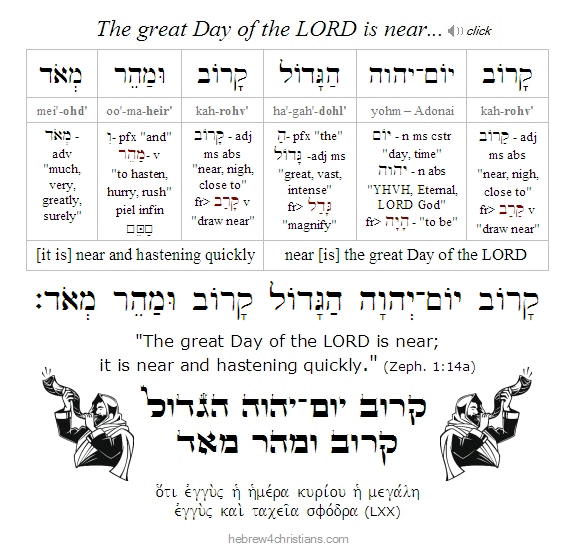 |
In light of all this, we must be be careful not to cling to this world or be "disheartened when the desolation of the wicked comes" (1 John 2:15; Prov. 3:25). The kingdom of man is at war with the kingdom of God, and whoever wishes to be a "friend" of this evil world makes himself an enemy of God (James 4:4). Regarding this doomed world the LORD speaks thus to His children: "Come out of the midst of her and be ye separate, lest you take part in her sins, lest you share in her plagues." This call to be separate may be more difficult for those who live in the midst of present-day "Babylon" than in other places of the world, because in Babylon it is far too easy to coddle the flesh and to avoid taking a costly stand for the truth... However, the reign of Babylon is spreading like a cancer throughout the world, consolidating power, and soon it will demand complete allegiance of all who dwell upon the earth. During that time of tribulation, all the peoples of the world will be forced to chose whether to accept the "mark of the beast" (i.e., citizenship in world order) or to face persecution, etc. We must not fear man or his devices, for the LORD will protect and strengthen His people.
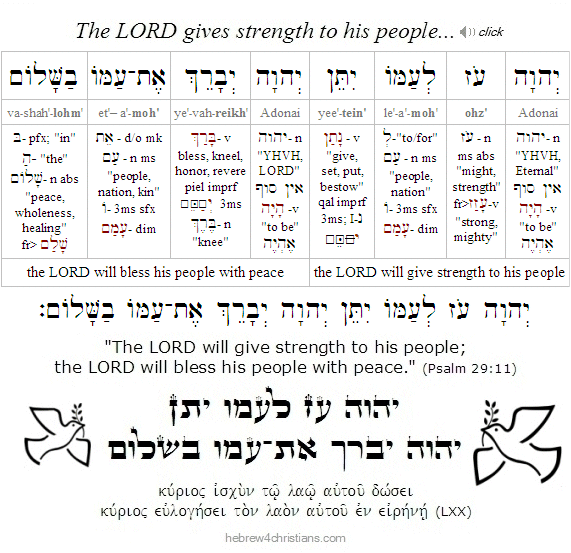 |
Atonement with Trembling...
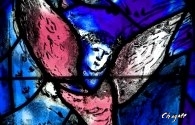
03.24.23 (Nisan 2 5783) Our faith affirms that the LORD personally cares whether we do teshuvah, that our choices matter and bear an eternal weight of significance (Matt. 12:36; Heb. 4:13; Psalm 90:8; Prov. 5:21; Job 31:4, etc.). If we gaze upward toward the starry depths of heaven we may feel that our lives are insignificant and useless; however if we look within we intuitively sense that everything we say, do, and think has eternal weight.
This paradox was well expressed by Immanuel Kant: "Two things fill the mind with ever new and increasing admiration and awe, the more often and steadily we reflect upon them: the starry heavens above me and the moral law within me. I do not seek or conjecture either of them as if they were veiled obscurities or extravagances beyond the horizon of my vision; I see them before me and connect them immediately with the consciousness of my existence" (Critique of Practical Reason).
Genuine humility doesn't mean regarding your life as vain or meaningless but instead "locates" the self in spiritually realistic terms. Both the grand whorl of the cosmos and the inner mystery of the self reveal God's Presence; the LORD fills all in all, and this includes both our inner world as well as the depths of creation, yea, before heaven itself. And since God in Messiah regards your life as worthy of an infinite redemption, true humility means respecting yourself, honoring the miracle of God's presence within you and valuing your identity as a beloved child of God...
You are both a "bit of nothing" (i.e., klume: כְּלוּם) and yet you are segulah, a treasure before heaven. An old Chassidic tale says that every person should walk through life with two notes, one in each pocket. On one note should be the words anokhi afar ve'efer (אָנכִי עָפָר וָאֵפֶר) - "I am but dust and ashes," and on the other note should be the words, bishvili nivra ha'olam (בִּשְׁבִילִי נִבְרָא הָעוֹלָם) - "For my sake was this world created." We are dust, yes indeed, but we are glorious dust because of God's love: "Just as we have borne the image of the man of dust, we shall also bear the image of the man of heaven" (1 Cor. 15:49).
Those who do not tremble before the cross do not understand God's holiness and anger against sin; those who do not rejoice before the cross do not understand God's great compassion and love....
We are to fear God and yet love God with all our hearts... It is a balance - the reverential "trembling of love." We fear God because our sins reveal divine justice and invoke the curse, and yet we trust what Yeshua does for us is perfect and evidences God's great compassion and mercy for our lives. So we do both - we fear God yet we rejoice that we are reconciled to him by means of the sacrificial life and death of the Messiah. We cannot choose one at the expense of the other: fear without love leads to legalism and hypocrisy; love without fear leads to presumption and profanity... Therefore we must guard against falling into despair over ourselves by affirming God's acceptance and blessing; on the other hand we must guard against smugness and pride by affirming God's holiness, justice, and the terrible cost he paid to redeem us from the verdict of the law. Those who do not tremble before the cross do not understand God's holiness and anger against sin; those who do not rejoice before the cross do not understand God's great compassion and love.
Hebrew Lesson
Psalm 89:14 Hebrew reading (click):
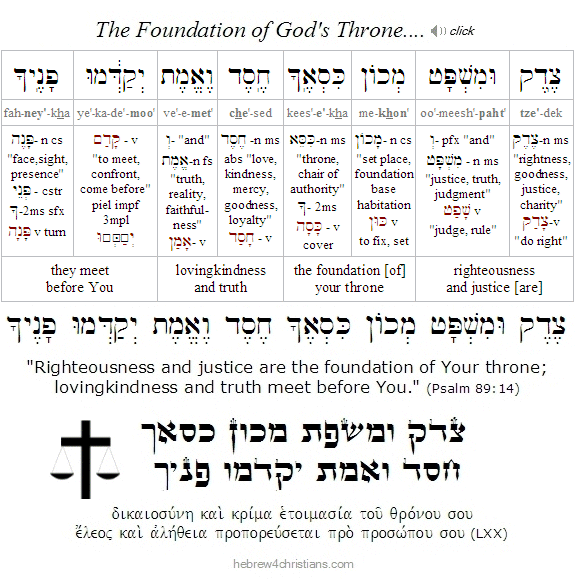 |
"Teshuvah" for a New Year...

03.24.23 (Nisan 2 5783) The central message of the Scriptures is to turn to God for life. Rabbi Sussya once said: "There are five verses in the bible that constitute the essence of the Torah. These verses begin in Hebrew with one of these letters: Tav (תּ), Shin (שׁ), Vav (ו), Bet (בּ), and Hey (ה), which form the word for repentance, "teshuvah" (תְּשׁובָה). The five verses are 1) Tamim tiheyeh (תָּמִים תִּהְיֶה): "Be wholehearted before God" (Deut. 18:13); 2) Shiviti Adonai (שִׁוִּיתִי יְהוָה): "I have set the LORD always before me" (Psalm 16:8); 3) Va'ahavta lere'akha (וְאָהַבְתָּ לְרֵעֲךָ): "Love your neighbor as yourself" (Lev. 19:18); 4) Bekhol derakekha (בְּכָל־דְּרָכֶיךָ): "In all your ways know Him" (Prov. 3:6); and 5) Higgid lekha (הִגִּיד לְךָ): "Walk humbly with your God" (Micah 6:8).
In other words, the way of teshuvah, of answering God's call for you to return to Him, is to wholeheartedly "set" the LORD before you (i.e., to believe), to respect others, and to know God's Presence as you walk in humility with Him....
Aren't you grateful that the Lord asks this of us -- and not some long litany of commandments to juggle? Do justice, love mercy, and walk humbly with God (Micah 6:8).
Hebrew Lesson
Micah 6:8 reading (click for audio):
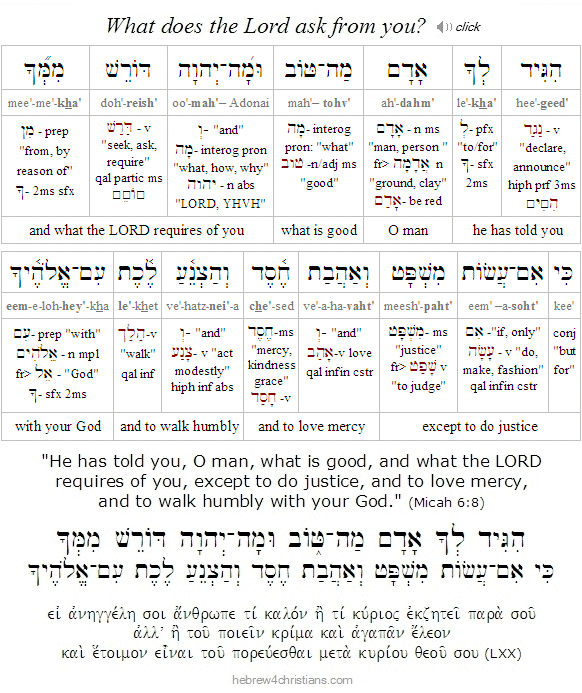 |
The Righteousness of God...

03.24.23 (Nisan 2 5783) It is not "I obey, therefore I am accepted," but rather, "I am accepted, and that is the obedience (ὑπακούω) of faith." The opposite of sin is not virtue but faith, as Paul said: πᾶν δὲ ὃ οὐκ ἐκ πίστεως, ἁμαρτία ἐστίν, "whatever does not proceed from faith is sin" (Rom. 14:23). Putting it the other way around, trust is the means of attaining God's righteousness and blessing (Eph. 2:8, Rom. 3:20-27). Paul calls this the "law of faith" (i.e., torat ha'emunah: תּוֹרַת הָאֱמוּנָה). Accepting that God is "for you" and "with you," and trusting that you are accepted -- despite your unacceptability -- is the first and most fundamental step of faith, since this honors the love and blessing of God. It is not your wisdom or cleverness that enlightens your way in the truth, however, but the miracle of disclosure from heaven. It is all a gift: you need God to even see that you need God! Right thinking is indeed a path to God, but it is the givenness of truth that enables the seeker to seek; it is the reality of the Teacher (the Savior) that is all-important. By itself true belief does not conjure divine favor, and indeed it may hide the deeper truth that the heart exists in untruth despite the head's "true" doctrine. Likewise, while goodness is indeed a path to God, true goodness is found in God's righteousness that makes the way right for the trusting heart... Genuine obedience to the truth of God - inner connectedness rather than merely outer obedience - marks the divine mercy of transformation.
"Not by works of righteousness (מַעֲשֵׂי הַצְּדָקָה) which we have done, but according to his mercy he saved us (ἀλλὰ κατὰ τὸναὐτοῦ ἔλεον ἔσωσεν ἡμᾶς), by the washing of regeneration, and renewing of the Holy Spirit (רוּחַ הַקּדֶשׁ), whom he poured out on us richly through Yeshua our Savior, so that being justified by His grace we might become heirs according to the hope of eternal life" (Titus 3:5-7). The meaning of the gospel is, among other things, that you believe in the love of God that heals us through the life of Yeshua. To those who have ears to hear, this is the deeper meaning of "shabbat" (שַׁבָּת), chaverim!
Hebrew Lesson
Habakkuk 2:4 reading (click for audio):
Sin and Despondency...
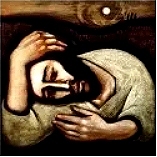
03.23.23 (Nisan 1 5783) "Whoever battles with monsters had better see to it that it does not turn him into a monster" (Nietzsche). A God-fearing man once complained to a sage that he was tormented by evil desire and had become despondent over it. The sage listened intently and then said, "Guard yourself from such despondency above all else, for it is worse than sin. When the yetzer [evil impulse] awakens desire in us, it is not concerned with plunging us into sin, but with plunging us into despair by way of our sinning."
We recall the words of James the Righteous: "Each person is tempted when he is lured and enticed by his own desire. Then when desire has conceived, it gives birth to sin; and sin when it is fully grown brings forth death. Do not be deceived..." (James 1:14-16). In other words, sin begins with selfish desire, but the "fruit" or "end" of sin is death, understood as separation from life, healing, love, peace, and so on. Sin "crouches" at the door; its desire is for you, but you must master it (Gen. 4:7).
How we choose to think inevitably leads to decisions and actions... In our warfare against the yetzer and the devil, we must be sure to rely upon God's love and grace, lest we find ourselves fighting "evil with evil," thereby amusing the powers of darkness... Tzedek tzedek tirdorf (צֶדֶק צֶדֶק תִּרְדּף) means that we must pursue righteousness righteously (Deut. 16:20). Some people seem to be so afraid that sin and evil will overtake them that they quite forget to exercise caution that they resist sin and evil in sinful ways... May God help us to see our sin and our battle against evil only in the light of His glorious Presence.
 |
Hebrew Lesson
Psalm 16:8 Shiviti Adonai (click):
Note: The quote (above) comes from Fredrich Nietzsche (1844-1900), who was the son of a Lutheran minister (named Carl), but who later fell away from God and went literally insane... I am not endorsing Nietzsche's "anti-theology," of course, though his point that people can become "monsters" over a "cause" is a valid one. Indeed there are atheistic ideologies that so "deify" their dogmas that they murder those who disagree with them. Advocates of such absolutist doctrines of man become monsters for the sake of their godless religion.
Awakening to Holiness...
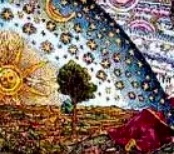
03.23.23 (Nisan 1 5783) The Torah records God's first act of creation with the imperative utterance: "Let there be light" (i.e., yehi or: יְהִי אוֹר), and then goes on to say that "God separated (וַיַּבְדֵּל) the light from the darkness (Gen. 1:3-4). It is this "separation," or distinction, that is foundational to the concept of kedushah (קְדֻשָּׁה), or "holiness." Holiness is also expressed in the distinction between ordinary and sacred time: "God blessed the seventh day and made it holy" (יְקַדֵּשׁ) because on it God rested from all his work that he had done in creation" (Gen. 2:3).
The overall theme of the Book of Leviticus is kedushah, and indeed the Hebrew root (קדשׁ) occurs over 150 times in the book. Since God is kadosh (קדשׁ), we must be kadosh in our lives as well, and this means first of all being conscious of the distinction between the sacred and the profane, the "clean" and the unclean, and so on. "You are to distinguish between the holy and the common, and between the unclean and the clean" (Lev. 10:10). Note that the word translated "to distinguish" (וּלֲהַבְדִּיל) comes from the same root (בדל) used to describe how God separated the light from the darkness. Now in order to do this, that is, to perceive what is holy and what is profane, we need godly understanding (i.e., binah: בִּינָה), or the ability to distinguish between (בֵּין) realms of reality, and that presupposes that we understand our identity as the "called out" children of God, benei ha'ohr, the children of light, who are set apart to love the truth and to honor the the LORD God who is the only Creator of everything that exists. As it is written, "You shall be holy to me, for I the LORD am holy and I have separated you (וָאַבְדִּל) from other peoples that you should be mine" (Lev. 20:26).
Hebrew Lesson
Lev. 20:26 reading (click):
There is no other way to approach the Holy One apart from consciousness of His infinite glory and unsurpassable worth. "I will lift up my eyes to the hills" (Psalm 121:1). As the Holy One (i.e., ha-kadosh: הַקָּדוֹשׁ), the LORD (יהוה) is utterly unique, distinct, sacred, and set apart as the only One of its kind. He alone is worthy of true worship and adoration, since He alone is utterly peerless, without rival, and stands in relation to the world as its personal Creator, Redeemer, and Lord. To affirm that the LORD is holy is to be conscious that He is utterly sacred, and that you are chosen to draw near and personally know Him as well.
Holiness involves first of all the awareness that there is a realm of reality "higher than" the material world (the light God created and separated from darkness was not physical), and this realm of reality is centered on Person and Will of God. A denial of this leads to the idolatrous view that material (i.e., profane) reality is absolute and therefore ascribed eternal worth. As it is writen: "The fear of the LORD is the beginning of wisdom; good understanding is for those who fear him" (Psalm 111:10). However, the LORD does not want us to merely recognize His holiness (in some abstract or intellectual sense) but calls us to be in relationship with Him, and this implies personal sanctity and separation: Again, "you shall be holy to me, for I the LORD am holy and I have separated you (וָאַבְדִּל) from other peoples that you should be mine" (Lev. 20:26). The purpose of the sacrificial system was to draw near to God, and this "drawing near" required a separation from the profane world and its habitual uncleanness. The call to be holy is therefore the call to wake up and become alive to God's Presence in this world; it is to turn away from ordinary to behold the extraordinary...
Note: Being "holy" does not mean being sanctimonious or having a sour face about the world and its carnal pleasures. It has nothing at all to do with affected spirituality, 'holier-than-thou' pride, or the fear of becoming unclean... Indeed, some of the most holy moments are not just those of love, joy, peace, but times of struggle, sorrow, affliction, and fiery temptation. Consider the dark cloud that surrounded the cross when Yeshua bled out and suffered in great agony for our redemption... Holiness is ultimately "ontological," which means it has to do with reality. A person can be holy and yet sinful; he can also be holy and yet feel lost or abandoned. On the other hand, a person can be seemingly sinless, morally upright, and yet be completely unholy.
Hebrew Lesson
Isa. 53:3a reading (click):
Leviticus and the Lamb...

[ The following is related our Torah reading for this week, parashat Vayikra... ]
03.22.23 (Adar 29 5783) The Book of Leviticus (ספר ויקרא) is the third of the Torah, representing another stage in our spiritual journey. Genesis reveals both our divine origin but also our tragic fallenness, and the book ends with our need for deliverance from bondage to Egypt. Exodus reveals that we are liberated from slavery by trusting in the provision of God demonstrated by the sacrifice of the Passover lamb, and the book ends with the climax of the revelation of Torah given at Sinai, namely, the building of the Mishkan (Tabernacle) where the the need for blood atonement was enshrined. Indeed blood atonement is the central theme of the central book of Torah, i.e., Leviticus, where we are called to draw near to God through sacrificial rites, the foremost of which was the ongoing offering (i.e., korban tamid: קרבן תמיד) of a defect-free male lamb, together with unleavened bread and wine. The LORD called this "My offering, My bread" (Num. 28:1-8). In other words, the very center of the Torah is the altar that constantly prefigured the Lamb of God who would be offered up to secure our eternal redemption (John 1:29; Heb. 9:11-12).
Though God instructed each household to select its own defect-free lamb for the family Passover, the Torah refers to "the" Lamb of God, as if there was only one: "You shall keep it [i.e., the Passover lamb] until the fourteenth day of this month, and the whole assembly of the congregation of Israel shall slaughter him (אתוֹ) at twilight (Exod. 12:6). Indeed there is only one great Lamb of God "slain from the foundation of the world," namely, the One given in the Garden of Eden (Gen. 3:21), sacrificed in place of Isaac during the Akedah, selected for the Passover from Egypt (and later commemorated as korban tamid (the daily offering) at the Temple (Num. 28:1-8)), later incarnated as our Savior, the great Lamb of God who offered Himself upon the cross for our sins (John 1:29), and who ascended to eternal victory to be seated upon the very Throne of God's Glory (Rev. 5:12-13; Rev. 22:1). Amen, the Torah centers on the Great Passover Lamb of God....
Hebrew Lesson
Rev. 5:12 Hebrew reading:
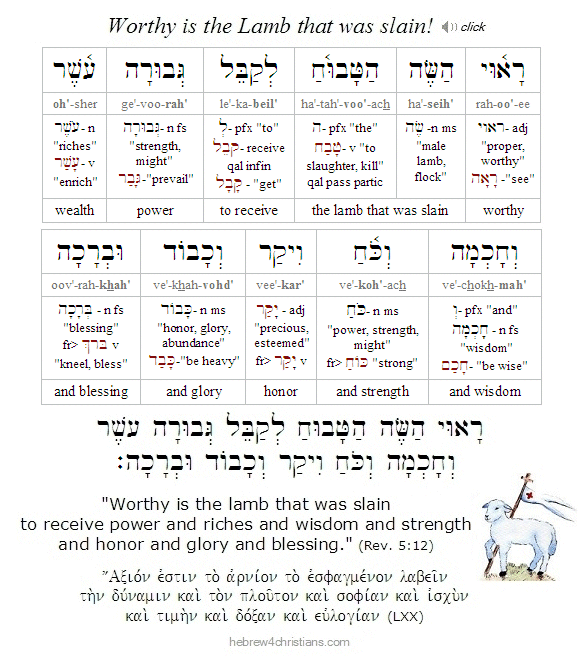 |
Passover and Soul Searching...
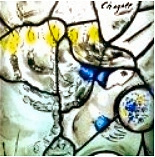
[ The following is related to the theme of repentance before the holiday of Passover... ]
03.22.23 (Adar 29 5783) The search for chametz (חפש חמץ) before Passover may be likened to the soul searching we do before the High Holidays in the fall, when we take an inventory of our spiritual condition (חשבון נפש) and do teshuvah. The Torah instructs us to carefully search and remove sources of inner impurity so that we might experience the truth that we are a "new lump" - that is, a new substance that is purged from the sour and rotting influences of our past lives... And since Yeshua has been sacrificed as your Passover Lamb, you are indeed a new creation (בּריה חדשׁה) made "unleavened" (pure) by the power of the Holy Spirit (2 Cor. 5:17). Therefore you are likewise commanded put away the "old nature" (יצר הרע) and purge from your life the old influences that inwardly canker you and make you sick (Eph. 4:22; Col. 3:9). Walk without hypocrisy in the truth of the love of God for your soul.
חָקְרֵנִי אֵל וְדַע לְבָבִי
בְּחָנֵנִי וְדַע שַׂרְעַפָּי
וּרְאֵה אִם־דֶּרֶךְ־עֹצֶב בִּי
וּנְחֵנִי בְּדֶרֶךְ עוֹלָם
chohk·rei'·nee · el · ve·da · le·vah·vee
be·chah·nei'·nee · ve'da · sar·ah·pai
oor·eih · eem-de'·rekh-oh'·tzev · bee
oo·ne·chei'·nee · be·de'·rekh · oh·lam

"Search me, O God, and know my heart!
Test me and know my anxious thoughts!
And see if there be any idolatrous way in me,
and lead me in the way of eternity."
(Psalm 139:23-24)

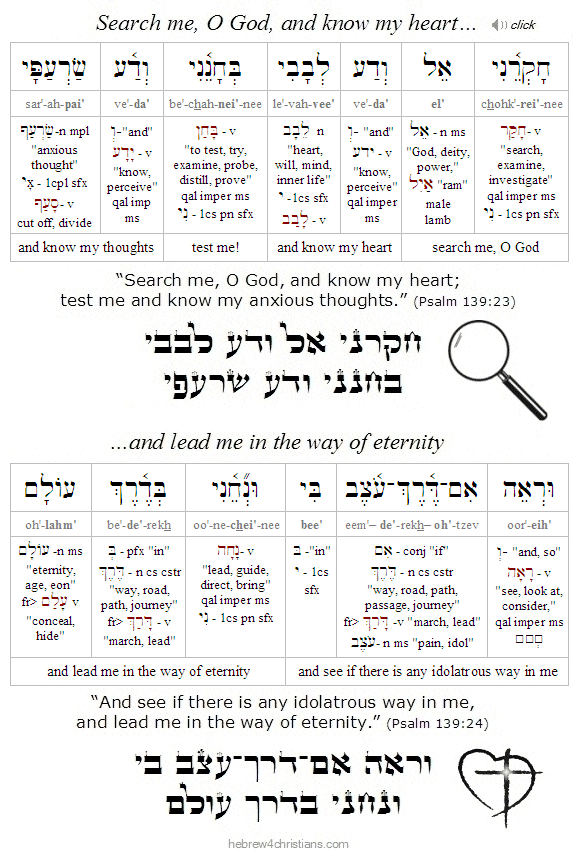
At the end of the age...
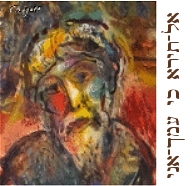
03.22.23 (Adar 29 5783) I have been feeling a bit uncertain and bewildered lately -- not regarding the truth of the LORD and his promises -- but rather about how we are to live our faith in the midst of the techno-fascist postmodern wasteland that marks our world today.... Maybe you can relate? The judgments of God are increasingly falling upon the world system, and the godless world-spirit is hardening for its last stand. In this connection note how the world economies are being strategically undermined and systematically devalued to create a new global currency (based on a digital "credit" scheme), and how political forces seek a "coerced unity" under the banner of a global health "mandates" designed to catalog our biochemistry and DNA for the controlling powers... Note further how weak-mindedness, heartlessness, anarchy and despair are defining characteristics of the postmodern soul. Propaganda and cognitive dissonance are the "warp and woof" of the godless mass media monopoly that suppresses free speech, discounts those who question the "science" used to justify political oppression, and otherwise "cancels" those might dare to think clearly without following the scripted "group think" of the day.
These are prophetic times, to be sure, and God is in the midst of this whirlwind. We are not to live in dread as those with no hope. Nevertheless we must pray with fervor and ask our Lord for wisdom and grace for such a time as this... Keep the Lord first in your heart and trust that he will protect and guide your ways, chaverim. Chazak - take courage! The time draws near; keep the oil in your lamps. God has promised never to leave nor forsake you: he loves you and will deliver you from evil...
"Do not be anxious about anything, but in everything by prayer and supplication with thanksgiving let your requests be made known to God. And the peace of God that passes all understanding (ἡ εἰρήνη τοῦ θεοῦ ἡ ὑπερέχουσα πάντα νοῦν) shall guard your hearts and minds in Yeshua the true King of Glory (Phil. 4:6-7). Amen.
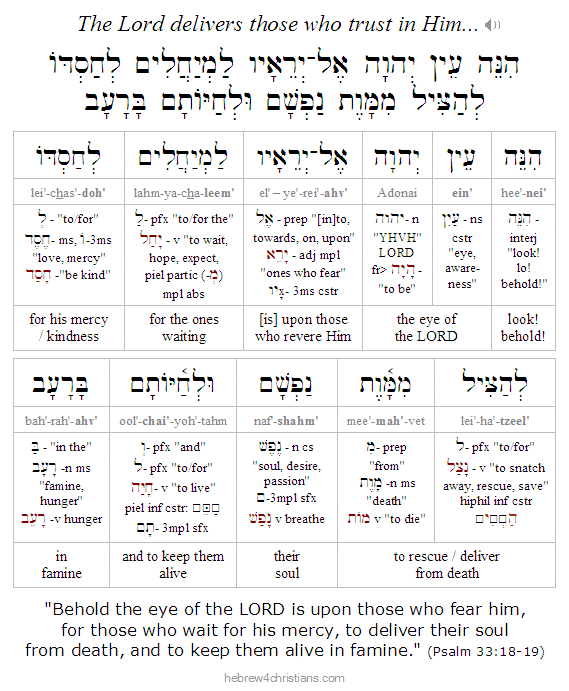 |
"Small Aleph" Revelation...

[ The following is related our Torah reading for this week, parashat Vayikra... ]
03.21.23 (Adar 28 5783) The first verse of the Book of Leviticus is usually translated: "And the LORD called to Moses and spoke to him," where the subject of the verb vayikra (וַיִּקְרָא), "and he called," has an implied antecedent, which if expressed would read: "And the LORD called to Moses and the LORD spoke to him..."
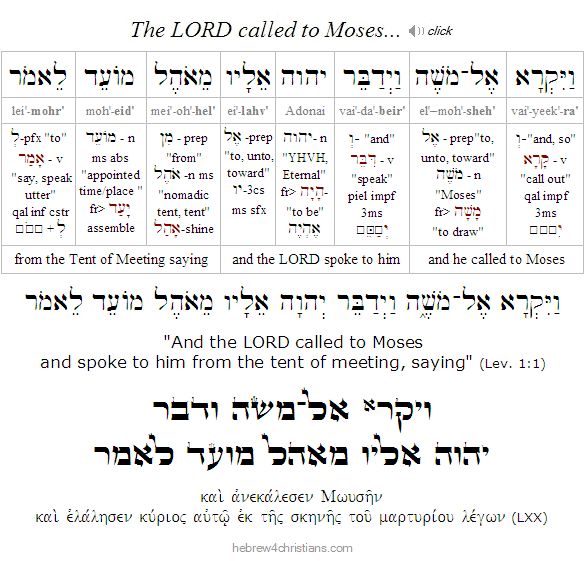 |
The Hebrew text of the Torah scroll is written with a small Aleph (א) at the end of the verb vayikra, however, indicating something of textual and grammatical interest. Note that the Hebrew letter Aleph is constructed from two Yods (each that represent a yad, or "hand") joined by a diagonal Vav (that represents a man). One Yod (י) reaches upward while the other reaches downward, and both extend from the "fallen" Vav (ו), picturing Yeshua, the humble One who was "wounded for our transgressions, and bruised for our iniquities" as our Mediator between heaven and earth (Isa. 53:5; 1 Tim. 2:5). The subject, then, of vayikra can be seen to be the "small Aleph," the Humble One who calls out from the Tent of Meeting...
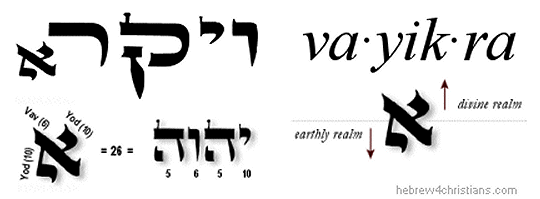 |
Aleph is the first letter of the first word of the first commandment of God: anokhi (אָנכִי): "I AM" (Exod. 20:2), which also designates the Name ehyeh (אֶהְיֶה) first revealed to Moses (Exod. 3:14). The numerical value of Aleph is one, indicating its preeminence, and it is a silent letter, alluding to the ineffable mystery of God's sovereign will (the related word aluph (אַלּוּף) means "Master" or "Champion"). In the Hebrew script used for writing Torah scrolls (ketav Ashurit), Aleph is constructed from two Yods (that represent "hands") joined by a diagonal Vav (that represents man). One Yod (י) reaches upward while the other reaches downward, and both extend from the "fallen" Vav (ו), picturing a "wounded Man" or Mediator (1 Tim. 2:5). In the Hebrew numbering system (i.e., gematria), Yod = 10 and Vav = 6, so adding up the three parts of Aleph yields 26, the same value as the Name of the LORD: YHVH (יהוה). The very first letter of the Hebrew Alphabet, then, pictures the three-in-one LORD who mediates all of life for our salvation. And just as there are three parts to Aleph, but Aleph is One (echad: אֶחָד), so there are three Persons to the Godhead, yet God is absolutely One. Indeed, the gematria of the word Aleph (אָלֶף) is 111 (Aleph=1, Lamed=30, and Pey=80). As Yeshua said, every "jot and tittle" of Scripture is significant...
"And he called" is written anonymously, but once you understand that this is the Word of the LORD speaking, you will turn back to the Creator and then YHVH will speak to you from within the Tent of Meeting...
 |
New Psalm 1 Reader
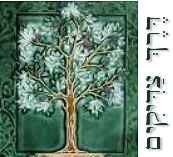
03.21.23 (Adar 28 5783) I have just written a new Psalm 1 study page for students of Biblical Hebrew that I hope will be helpful. The Hebrew text is given for each verse, with Hebrew grammatical helps listed as footnotes (see reader link below). A separate table is provided at the end listing the Hebrew vocabulary used in the Psalm. My goal is to help people learn to fluently read the Hebrew text without relying on interlinear helps...
Presently I am trying different formatting ideas. Once I find one that I think works well, I may collate them into a PDF book (with audio) for reading the Hebrew Psalms. Shalom friends.
Loving one another...

03.21.23 (Adar 28 5783) Mark Twain once said: "Let us consider that we are all partially insane. It will explain us to each other; it will unriddle many riddles; it will make clear and simple many things which are involved in haunting and harassing difficulties and obscurities now." Amen, we are all frail people in need of forgiveness, encouragement, and acceptance. Therefore may we all be patient and forgiving toward one another, since we are all children of Adam who struggle with sin, despair, and loneliness, and we all suffer from cognitive dysfunction... We all need healing, we all need help, and we all desperately need God.
Each of us, such as we are, is on the "road of life," and each passing day draws us closer to our end. Therefore we should treasure our time, the remains of our day. "Any time you are with anyone or think of anyone you must say to yourself: I am dying and this person too is dying, attempting the while to experience the truth of the words you are saying. If every one of you agrees to practice this, bitterness will die out, harmony will arise" (de Mello).
Time is short. We are must love others, and that includes "the stranger." "Be merciful, even as your Father is merciful; be kind to one another, tenderhearted, forgiving one another, as God in Yeshua forgave you. Therefore be imitators of God, as beloved children."
Hebrew Lesson
Lev. 19:18b Hebrew reading:
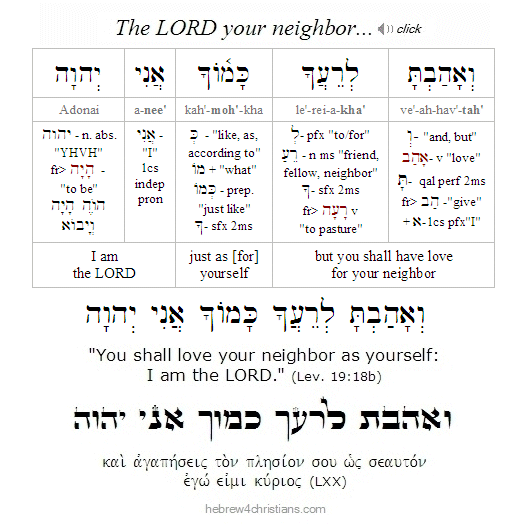 |
Centrality of the Lamb...

03.21.23 (Adar 28 5783) The goal of the great Sinai revelation was not to simply impart a set of moral or social laws, but rather to "accommodate" the Divine Presence in the midst of the people. This is not to suggest that the various laws and decrees given to Israel were unimportant, of course, since they reflect the holy character and moral will of God. Nonetheless, the climax of the revelation of the Torah - its goal or purpose or "end" - was the revelation of the altar which prefigured the sacrificial work of the Lamb of God. Indeed, the central sacrifice upon this altar was the daily sacrifice (i.e., korban tamid: קָרְבַּן תָּמִיד) of a defect-free male lamb with unleavened bread and wine. The LORD calls this "My offering, My bread..." (see Num. 28:1-8). In other words, the service and ministry of the Mishkan (i.e., Tabernacle) constantly foreshadowed the coming Lamb of God who would be offered upon the altar "made without hands" to secure our eternal redemption (Heb. 9:11-12). The sacrifice of the lamb is therefore central to the meaning and purpose of the Torah.
The Talmud says "All the world was created for the Messiah" (Sanhedrin 98b). The Apostle Paul had earlier said the same thing: "All things were created by Him (i.e., Yeshua), and for Him" and in Him all things consist (συνεστηκεν, lit. "stick together") (Col. 1:16-17). Indeed, all of creation is being constantly upheld by the word of the Messiah's power (Heb. 1:3). Creation begins and ends with the redemptive love of God as manifested in the Person of Yeshua our LORD... The Messiah is the Center of Creation - its beginning and end. As it is written: אָנכִי אָלֶף וְתָו רִאשׁוֹן וְאַחֲרוֹן ראשׁ וָסוֹף / "I am the 'Aleph' and the 'Tav,' the First and the Last, the Beginning and the End" (Rev. 22:13). "For from him and through him and to him are all things. To him be glory forever. Amen" (Rom. 11:36). In everything Yeshua has the preeminence (Col. 1:18), and his "work" is of first importance (1 Cor. 2:2, 1 Cor. 15:3-4). Yeshua our Messiah is called מֶלֶךְ מַלְכֵי הַמְּלָכִים / Melech Malchei Hamelachim: The "King of kings of kings." He is LORD of all possible worlds -- from the highest celestial glory to the dust of death upon a cross. Yehi shem Adonai mevorakh: "Let the Name of the LORD be blessed" forever and ever (Psalm 113:2). So while we can agree with the Talmud's general statement that the world was created for the Messiah, we would insist that the Messiah is none other than Yeshua, God's Son, and indeed, the Messiah could be no other...
Hebrew Lesson
Exodus 29:38 reading (click):
Trusting God's love for you...
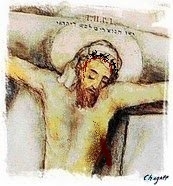
[ "When you think of what you are, and despair; think also of what He is, and take heart." - Charles Spurgeon ]
03.20.23 (Adar 27 5783) "Father forgive them, for they know not what they do" (Luke 23:34). Yeshua's intercession is not just for the sins we have consciously committed but to the sins done in the blindness of our unconscious; his sacrifice was offered not just for our known acts of sin, but for the wayward condition of our darkened hearts...
This is essential. When God forgives our sin, it goes beyond forgiveness of the sinful behavior to the innate sickness of the heart. Divine forgiveness is remedy for our alienation, our lostness. It is healing of our deepest self, our secret heart, wherein we become a new creation. If God accepts us at all, he accepts us completely, and that means we are made righteous by means of his love and grace.
Teshuvah ("repentance") is not about becoming better but about becoming different. It is about newness of life. As Yeshua said, "Unless you are born again, you cannot see the kingdom of heaven." Believe that you have received it and it will be yours (Mark 11:24).
Hebrew Lesson
Psalm 63:3 Hebrew reading:
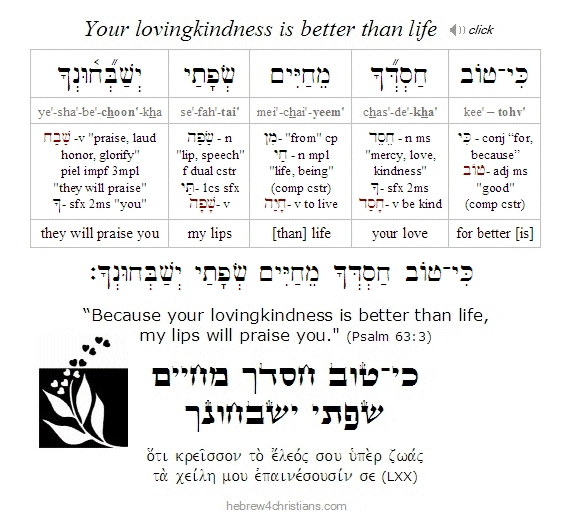 |
If there's hope for eternal life, it is found in the one who "loved me and gave himself for me" (Gal. 2:20). I put no trust in religion, nor in the reformation of my character, nor in my will to believe, but solely in the kindness of the one who heals me from the ruin of my self.
New Psalm 23 Reader
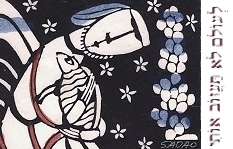
03.19.23 (Adar 26 5783) I wrote a new Psalm 23 page for students of Biblical Hebrew that I hope will be helpful. The Hebrew text is given for each verse of the Psalm, with Hebrew grammatical helps listed as footnotes (see reader link below). My goal is to help people learn to read the Hebrew text without relying on the interlinear transliteration and grammatical information listed directly below each word... Presently I am trying different format ideas. Once I find one that I think works well, I may collate them into a PDF book (with audio) for reading the Hebrew Psalms. Shalom friends.
The Centrality of Leviticus...

03.19.23 (Adar 26 5783) The Book of Leviticus (ספר ויקרא) is to the Torah what the Book of Hebrews is to the New Testament. Leviticus is both the physical and spiritual center of the Five Books of Moses and comprises its ritual expression. The sages count 246 of the 613 commandments of the Torah in this book (over 40%), and many of the Talmud's discussions regarding ritual purity and holiness are based on it.
The story of the Exodus reveals that the nation of Israel was "born" by means of the blood of the Passover lamb. But the Passover was a means to the revelation given at Sinai, and the revelation at Sinai found its ritual expression in a system that required the constant shedding of the blood of sacrificial animals (i.e., the Tabernacle). "For the life of a creature is in the blood, and I have given it to you to make atonement for yourselves on the altar (of the Mishkan); it is the blood that makes atonement for one's life" (Lev. 17:11).
Sometimes it seems as if there are two different sacrificial themes given in the Torah (and the New Testament, as well). First we have Passover -- and the redemption given through the blood of the Passover lamb -- and then we have Yom Kippur, with atonement given through the blood of the goat. Passover represents the blood of redemption (i.e., freedom from slavery, deliverance, salvation, etc.) and Yom Kippur represents the blood of atonement (i.e., freedom from guilt, cleansing from sin, etc.).
Note that the original Passover sacrifice (קרבן פסח) was not given to the Levitical priesthood as a sin offering, since it preceded Sinai and the giving of the various laws concerning the Mishkan/Temple sacrificial rites. In the same way, Yeshua's sacrifice was directed from Heaven itself by means of the prophetic office of Malki-Tzedek (מַלְכִּי־צֶדֶק) - a higher order of priesthood (Gen. 14:18; Psalm 110:4; Heb. 7). Yeshua both offered Himself up as the "Lamb of God" that causes the wrath of God to (eternally) pass over those who personally trust in Him, and He also offered himself as the "Goat of God" whose blood was sprinkled in the Holy of Holies to cleanse us from sin and give us (everlasting) atonement. (Other metaphors are also given in Scripture, for example, Yeshua offered Himself as a Snake lifted up (John 3:14-15; cp. Num. 21:4-9), as a Red Cow (parah adumah), and so on).
For Yom Kippur, of course, two goats were required: one goat was for blood sacrifice in the Holy of Holies (the Goat of the LORD) and the other was used as a "scapegoat" for the sins of the community (the goat of Azazel / the devil). The Gospels seem to emphasize the connection between Yeshua as the "Lamb of God who takes away the sins of the world" with Passover/Exodus more than the connection between Yeshua as the "Goat of the LORD" whose blood was sprinkled upon the Mercy Seat with Yom Kippur - though the author of the Book of Hebrews explicitly makes this connection (Heb. 9:11-12; 24-ff).
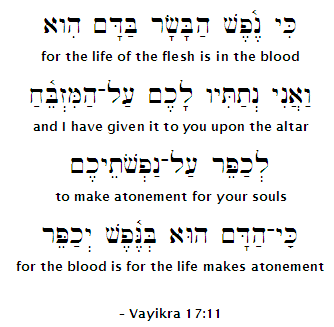 |
Yeshua as the "Lamb of God" pictures personal redemption from slavery to Satan and freedom from the wrath of God. This is the greater Passover/Exodus connection. By means of Yeshua's shed blood and broken body, the wrath of God passes over us and we are set free to serve God.... Yeshua as the "Goat of God" pictures both personal cleansing (i.e., "propitiation" or "expiation" for our sins: the Greek word (ἱλαστήριον) is used in the LXX for the kapporet (Mercy Seat) in the Holy of Holies which was sprinkled with the blood of the sacrifice on Yom Kippur) as well as national teshuvah and cleansing for ethnic Israel at the end of the Great Tribulation period. At that time Yeshua will function as Israel's true High Priest whose sacrifice is applied for Israel's Atonement. This is the Yom Kippur connection.
Since the destruction of the Second Temple in AD 70, Judaism has struggled to make sense of the Book of Leviticus' significance. After all, the Rabbis of the Mishnah and Talmud redefined Jewish worship to bypass the Torah's commandments for blood atonement rituals by substituting Torah study, daily prayer, and acts of loving kindness. Thus the Pirke Avot says, "The world stands on three things: Torah, service, and acts of loving kindness (1:2)," and Yochanan ben Zakkai (a primary contributor to the Mishnah who established Judaism without the Temple) appealed to Hosea 6:6 to substitute prayer for sacrifice.
Later, the medieval scholar Moses Maimonides (the "Rambam") suggested that animal sacrifices were a temporary dispensation given by the LORD to counter the idolatrous impulses of ancient Israel. The theory goes that in ancient times, people worshipped animals and made sacrifices to idols, so the LORD came up with the idea of the Tabernacle to "constrain" such impulses. Animals could only be sacrificed (though not worshipped) at the designated place (i.e., the Tabernacle) under the supervision of the LORD's priests, though ultimately this practice would be phased out as Israel became more "enlightened."
The Jewish commentator Isaac Abrabanel (1437-1508) supported Maimonides' claim and wrote: "It's analogous to the case of a prince who turned villainous and acquired the habit of eating disgusting food. Said the king: Let him eat the disgusting food at my table and he'll come to break the habit. Likewise, the Israelites were steeped in idol worship, including sacrifices. Said God: Let them bring those sacrifices to me at the Tent of Meeting, and from this they'll come to break the habit."
Of course Modern Judaism followed the lead of Yochanan ben Zakkai and the later medievalists by saying that avodah (Temple service) has been replaced by prayer.... "Atonement" has become a system consisting of performing "good deeds" of Torah study, prayer, fasting and acts of lovingkindness (gemilut chasidim). However, given that 246 of the 613 commandments of the Torah concern details of the sacrificial system, this conclusion seems warranted only if we assume that Oral Torah (and Jewish tradition) can directly contradict (i.e., "preempt") the written commandments given by Moses himself...
Jewish tradition is not without its witness, however. In the Talmud it is recorded that "during the last forty years before the destruction of the Temple the lot ['for the Lord'] did not come up in the right hand; nor did the crimson-colored strap become white; nor did the westernmost light shine; and the doors of the Hekhal would open by themselves" (Yoma 39b). Forty years before the destruction of the Second Temple would be around 30 AD -- the time of the sacrificial death of Yeshua for the sins of Israel and the world. The requirement for the blood of atonement forever stands, just as every word of the Torah is true...
Audio Podcast:
The LORD Calls Out - ויקרא

[ This week we begin a new book of Torah, sefer Vayikra (i.e., the book of Leviticus)... ]
03.19.23 (Adar 26 5783) The first Torah portion for the new Biblical New year is parashat Vayikra ("and he called"), the very first section from the Book of Leviticus (ספר ויקרא). In Jewish tradition, Leviticus is sometimes called the "Book of Sacrifices" (i.e., sefer ha'zevachim: ספר הזבחים) since it deals largely with the various sacrificial offerings brought to the altar at the Mishkan (i.e., Tabernacle). Indeed, over 40 percent of all the Torah's commandments are found in this central book of the Scriptures, highlighting that blood atonement is essential to the Torah. Moreover, since the revelation of the Tabernacle was the climax of the revelation given at Sinai, the Book of Leviticus reveals its ritual significance, as it is written: "For the life of the flesh is in the blood, and I have given it for you on the altar to make atonement for your souls, for it is the blood that makes atonement (kapparah) by the life" (Lev. 17:11).
Unlike narrative portions of other books of the Torah, the Book of Leviticus begins with the LORD himself "calling out" (i.e., vayikra) to Moses to explain that the way to draw near to Him is by means of atoning sacrifice. It is noteworthy that throughout the book, only the sacred name of the LORD (יהוה) is used in connection with sacrificial offerings, and never the name Elohim (אלוהים). This suggests that sacrificial offerings were given to draw us near to experience God's mercy and compassion rather than to simply appease His anger.... In other words, the Name of the LORD represents salvation (i.e., yeshuah: ישועה) and healing for the sinner, not God's judgment (John 3:17). Indeed, the word korban (קרבן), often translated as "sacrifice" or "offering," comes from a root word karov (קרב) that means to "draw close" or "to come near" (James 4:8). The sinner who approached the LORD trusting in the efficacy of the sacrificial blood shed on his or her behalf would find healing and life...
In this connection we note that the ancient Greek translation of the Torah (called the Septuagint) translated the Hebrew word kapporet (i.e., כפרת, "mercy seat") as hilasterion (ἱλαστήριον), sometimes translated "propitiation." The New Testament picks up this usage in Romans 3:25: "God put forward Yeshua as a propitiation (ἱλαστήριον) through faith in His blood." In other words, the shedding of Yeshua's blood - represented by His Passion upon the cross - was "presented" upon the Heavenly Kapporet, before the very Throne of God Himself for our atoning sacrifice (i.e., kapparah: כפרה) before God.
Deliverance from Evil...
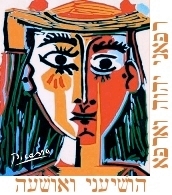
[ It is opportune during this time of year -- just before Nisan 1 and the start of the Torah's calendar for the new year -- to seek a more earnest teshuvah, or turning to the Lord. Passover is just in a few weeks, and during that time we especially recall the blessing of our redemption paid for by our Messiah's sacrifice for us... ]
03.17.23 (Adar 24 5783) There is the great danger of squandering and dissipating our lives... Examine yourself; consider what really moves you. Be careful not to deceive yourself by "reasoning around the truth" (i.e., παρα + λογίζομαι), as James the Righteous puts it (James 1:22). Many people fool themselves by assuming they know or understand what is good, but they confine this ideal to a matter of opinion rather than experiencing it as a matter of the will (or they confuse their opinion of the ideal with what is real).
Some of the ancient Greek philosophers assumed that moral evil was the result of ignorance, and that simply knowing the good would lead to doing the good. For example Socrates states (in the Protagoras) that no one knowingly does the wrong thing, and therefore all evil is the result of ignorance. He argued this way because he assumed that doing wrong harms the soul, and since no one willingly acts against his own interests, wrongdoing must be result of ignorance. This optimistic view implies that the answer to the problem of moral evil is "education," or leading people out of the dark cave of their lower nature to experience the light of reason. If we just really understood why doing this or that sinful thing hurts us, we would change our ways and repent, or so the theory goes... Alas, human experience proves that such "head knowledge" often does not change the way we choose, and we all know people who have habits they realize are harmful but continue to indulge in them anyway.
There may be some truth to the idea that evil is a matter of ignorance however, since ignoring what is good, being indifferent, apathetic, and cynical is a defect of character (ἀκρασία), and learning to be honest, upright, courageous, unselfish, and so on, requires personal struggle to make the "ought" of moral reality an expression of the "is" of inner life. What is often most shocking about moral evil is that it expresses apathy or indifference toward the objections of conscience. Moral evil is essentially heartless and devoid of empathy, a state of cold-heartedness and callousness for the feelings and dignity of others. According to the Jewish philosopher Hannah Arendt, the lack of moral thought and reflection creates what she called the "banality of evil," that is, the unthinking acceptance of evil so that it is no longer regarded as outrageous or strange. People deaden their conscience by refusing to honestly engage questions such as: "What is goodness?" "Is evil real?" "Do we have an obligation to observe moral truth?" "What is the good life?" "How should we live?" "Do our actions really matter?" "Will God judge my life?" and so on. On the other hand, our culture has been so shocked by the ongoing practice of lawlessness wickedness that people have lost their sense of shame. We are no longer shocked and outraged when we hear of the latest crimes or abuses of power in our postmodern world.... We must be careful, however, not to become evil by despising what is evil. For instance, we may feel so outraged and threatened by the evil actions of others that we deny their humanity, thereby becoming the very thing we hate.
"The heart is deceitful above all things and desperately sick; who can understand it?" (Jer. 17:9). "Oh there is nothing as deceitful and as cunning as a human heart, resourceful in seeking escapes and finding excuses; and there surely is nothing as difficult and as rare as genuine honesty before God." (Kierkegaard: Discourses). Therefore we pray: "Heal me, O LORD, and I shall be healed; save me, and I shall be saved (Jer. 17:14).
Shabbat Ha'Chodesh Shalom chaverim!
Hebrew Lesson
Jeremiah 17:14 reading (click):
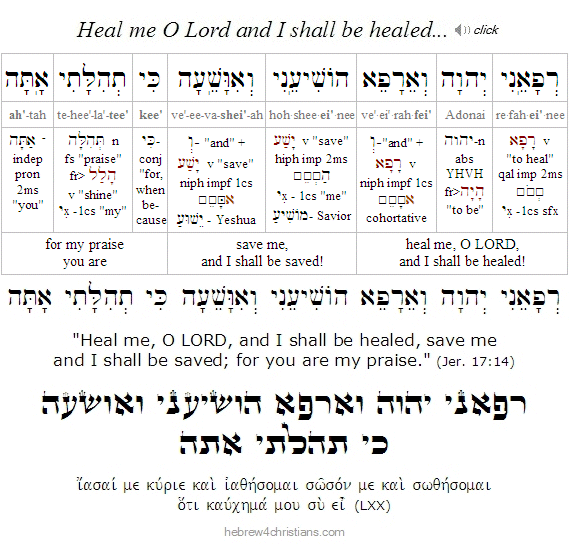 |
Treasuring God's Promise...

03.17.23 (Adar 24 5783) A basic principle of Bible interpretation is succinctly stated in the axiom: "a text without a context is a pretext," and therefore we must endeavor to understand the New Testament in light of the Torah, not the other way around... Without the context of Torah, the meaning and terms of the New Testament will be obscure and subject to misunderstanding. Indeed, we must remember that the Messiah was "embedded" in the Jewish culture of his day (see Gal. 4:4-5), and that he was fluent in Torah reading and study (see Luke 4:16-21; John 4:22). Moreover, Yeshua plainly said that the Jewish Scriptures testify of Him: "And beginning with Moses and all the Prophets, he interpreted (διερμηνεύω) to them in all the Scriptures the things concerning himself" (Luke 24:27; John 5:39). We study Torah to know Yeshua, the "Living Torah" better, as he said: "Therefore every scribe who has been trained for the kingdom of heaven is like a master of a house, who brings out of his treasure what is new and what is old" (Matt. 13:52).
בלבי צפנתי אמרתך
למען לא אחטא־לך
be·lee·bee · tzah·fan'·tee · eem·rah·te'·kha
le·ma'·an · loh · e·che·tah'-lakh

"In my heart I have treasured your word
so that I might not sin against you.
(Psalm 119:11)

Click to listen to the Hebrew text with some commentary:
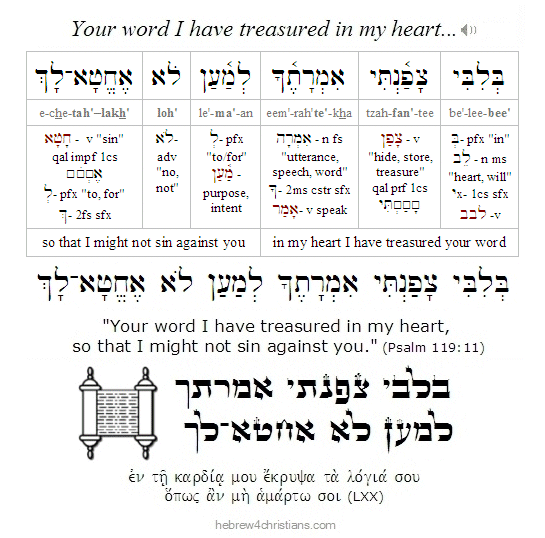
Some so-called Bible scholars claim that Jesus spoke Aramaic, not Hebrew. Well, consider this. If the law required that the king of the Jews was required to "make a copy of sefer Torah" (see Deut. 17:18-19), then surely Yeshua, the great King of the Jews, the Mashiach, read Hebrew and understood kotzo shel yod (קוֹצוֹ שֶׁל יוֹד) - "every jot and tittle" of its meaning (see Matt. 5:17-19). Indeed, Yeshua knew the traditional Hebrew blessings, prayers, and hymns (Matt. 26:26-30); he chanted Hebrew in synagogue (Luke 4:16), and he reasoned with the sages in Jerusalem, even as a young boy (Luke 2:42-27). Surely the true King of the Jews spoke lashon hakodesh, the holy language of Hebrew!
Idolatry and Rage...

03.17.23 (Adar 24 5783) We are warned not to destroy ourselves by allowing bitterness, anger, or fear to consume our hearts. In the Torah we read: "And you shall not bring an abominable thing (תּוֹעֵבָה) into your house and become devoted to destruction like it" (Deut. 7:26). The sages of the Mishnah said that yielding to rage is equivalent to idol worship and should never be brought into the home. Indeed, rage is linked with avodah zarah - idolatry - because it exalts the ego and claims that God can't (or won't) help you in your moment of testing or need. Being quick to anger reveals foolishness within the heart (Eccl. 7:9).
The Scriptures affirm, however, that "there is no test given to you that you cannot handle with God's help" (1 Cor. 10:13), and we invited to come boldly before the Divine Presence to find help in our time of need (Heb. 4:16). Believing that you can't overcome your fear or anger problem is therefore a form of idolatry. As is written: Lo yiheyeh vekha el zar (לא־יִהְיֶה בְךָ אֵל זָר) -- "there shall be no foreign god within you" (Psalm 81:9), which means that we must expressly deny the ego's demand to have its will be done (even if that demand is to cling to indignation or fear).
Being full of a sense of self-importance is to be enslaved to vanity and to have a foreign god "within you." God and human arrogance cannot coexist - since the inner world of the arrogant person denies God's rightful place as King (Psalm 14:1). As it is written in our Scriptures: "The wrath of man (קֶצֶף אָדָם) does not work the righteousness of God" (James 1:20). God will indeed help us if we ask according to his will (1 John 5:14-15). Thank you, God. "Blessed is the LORD who delivers us from self-destruction." Amen.
Hebrew Lesson
Ecclesiastes 7:9 reading (click for audio):
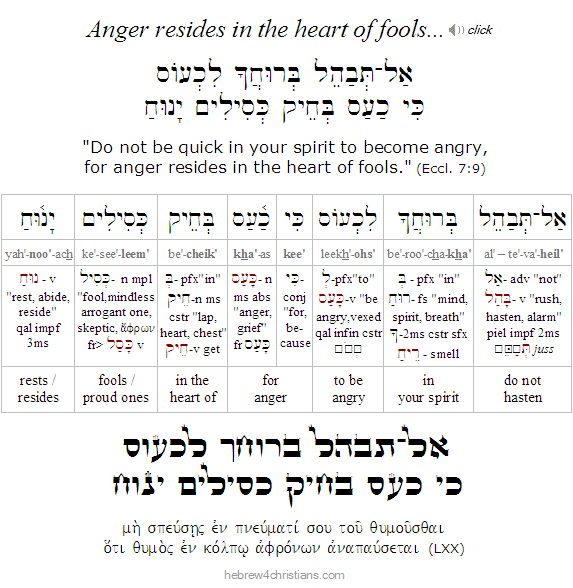 |
Torah of Eternal Life (חַיֵּי עוֹלָם)

[ "The object of our faith is not the teaching but the Teacher..." - Kierkegaard ]
03.17.23 (Adar 24 5783) Yeshua reveals the heart of God to us, teaching us about the meaning of life and death and why we suffer... Most radically, however, he offers us the cure for the sickness of "spiritual death" (i.e., separation from God) by offering the gift of his life for us. Yeshua heals us from alienation and separation from the Eternal by means of spiritual regeneration (Eph. 2:1,5; John 3:3-7). Your relationship with Messiah constitutes eternal life (חַיֵּי עוֹלָם), for it is He who "makes you alive together with him" (i.e., συζωοποιέω, the Greek word here means you are brought into a new realm of existence by participating in the life in Messiah). He offers us daily deliverance from the power of sin by means of the Spirit of Faithfulness (רוּחַ הָאֱמֶת), though we must remain receptive to the message of hope and be transformed by the renewing our minds (Rom. 12:2; Eph. 4:23; Col. 3:10).
We must be careful not to "drift away" from the truth, since that forfeits the integrity of our lives and leads us into darkness and despair: "For what benefit is it for a person to gain the whole world, yet forfeit his life?" (Mark 8:36). Faith is the means or agency of connection with what is real, though we can lose that connection by hardening our hearts and returning to our former illusions (Heb. 3:13). Exile from God is therefore self-imposed; the gates of repentance are always open to those who seek God's compassion; everyone is welcome to find life in the blessing of Messiah (Luke 14:16-23; Luke 15:11-32). Therefore, draw near to God and God will draw near to you. "Let us then with confidence draw near to the throne of grace, that we may receive mercy and find grace to help in time of need" (Heb. 4:16).
Hebrew Lesson
Psalm 18:31 reading (click):
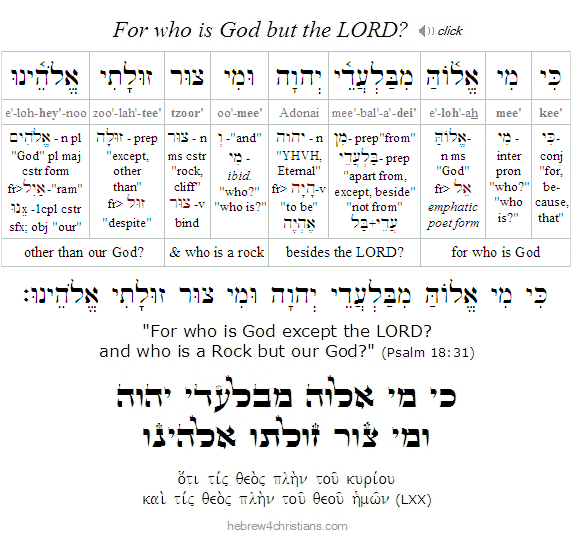 |
Trusting God's Heart...

03.17.23 (Adar 24 5783) There is no fear in love, and therefore over and over the Spirit of God says, al tira (אל־תירא), "don't be afraid..." When we are afraid, we are believing the lie there is something beyond God's control or reach, and therefore God is "not enough"... In times of testing you must remind yourself of what is real. God formed you in your mother's womb, breathed into you nishmat chayim, the breath of life, and numbers all your days... Every breath you take, every heartbeat in your chest is ordained from heaven, and indeed, there is not a moment of your life apart from God's sovereign and sustaining grace. So what, then, are you afraid of? Dying? Judgment in the world to come? Being left unloved, bereft of home, abandoned, consigned to outer darkness? King David said, "If I make my bed in Hell, behold, you are there" (Psalm 139:8). Look, the LORD God is not only present in your "happy moments," when you feel "put together" and respectable, but he is present in your desperate moments, in your hunger, your thirst, and in your secrets. May we never lose sight of God's love, especially in times of distress and trouble, since we trust that he is always working all things together for our ultimate good (Rom. 8:28).
The Name of the LORD (יהוה) means "Presence" and "Love" (Exod. 3:14; 34:6-7). Yeshua said, "I go to prepare a place for you," which means that his presence and love are waiting for you in whatever lies ahead (Rom. 8:35-39). To worry is "practicing the absence" of God instead of practicing His Presence... Trust the word of the Holy Spirit: "For I know the plans I have for you, declares the LORD, plans for healing peace and not for evil, to give you a future and a hope (Jer. 29:11). The Word always speaks hope.
Take comfort that your Heavenly Father sees when the sparrow falls; he arrays the flower in its hidden valley; and he calls each star by name. More importantly, the Lord sees you and knows your struggle with fear. Come to him with your needy heart and trust him to deliver you from the burdens of your soul (Matt. 11:28). Shalom means being free from fear.
This is a word for the exiles of every age: Be not afraid - al-tirah – not of man, nor of war, nor of tribulation, nor even of death itself (Rom. 8:35-39). If God be for us, who can be against us? Indeed, Yeshua came to die to destroy the power of death "and to release all those who through fear of death were subject to lifelong slavery" (Heb. 2:14-15). The resurrection of the Messiah is the focal point of history - not the "dust of death." Death does not have the final word. Indeed, because Yeshua is alive, we also shall live (John 14:19). "May your love, O LORD, be upon us, even as we hope for you" (Psalm 33:22).
Nachman of Breslov once is reported to have said that "The whole earth is a very narrow bridge (כָּל־הָעוֹלָם כֻּלּוֹ גֶּשֶׁר צַר מְאד), and the point of life is never to be afraid." Likewise we understand Yeshua to be the Bridge to the Father, the narrow way of passage that leads to life. He calls out to us in the storm of this world, "Take heart. It is I; be not afraid" (Matt. 14:27). When Peter answered the call and attempted to walk across the stormy waters, he lost courage and began to sink, but Yeshua immediately reached out his hand and took hold of him, saying, "O you of little faith, why did you doubt (lit., think twice)?"
We must be careful not to let the light in us become darkness (see Luke 11:35). The love and acceptance of God is the answer to our fear, not the thought of being judged by Him or attempting to merit his favor through religion. God's love is our hope, and this hope gives us courage to persevere the storms of the day... "May your love, O LORD, be upon us, even as we hope for you" (Psalm 33:22).
Hebrew Lesson
Psalm 33:22 reading (click):
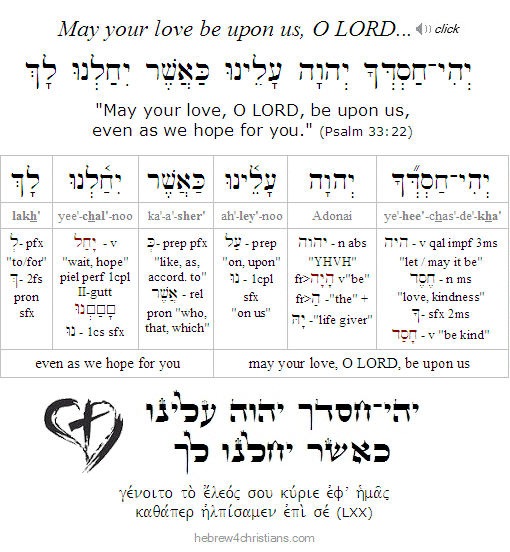 |
From Faith to Faith...
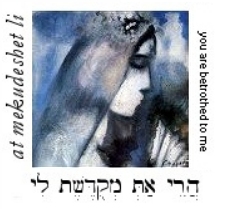
03.16.23 (Adar 23 5783) If you were ask to God for just one thing, what would it be? Our desires and yearnings are like prayers. Whatever the heart genuinely seeks, it will find. The person who pursues righteousness will find it, just as evil comes to the person who searches for it (Prov. 11:27). Therefore the voice of wisdom cries out, "I love those who love me, and those who seek me diligently find me" (Prov. 8:17), and the prophet shouts, "Seek the LORD while he may be found, call upon him while he is near" (Isa. 55:6). God is near to us in Yeshua, who said, "Ask, and it will be given to you; seek, and you will find; knock, and it will be opened to you. For everyone who asks receives, and the one who seeks finds, and to the one who knocks it will be opened." As you believe, so you will receive (Matt. 21:22).
This is the "like for like" principle of faith. Forgive us as we forgive; judge us as we judge; love us as we love; make us righteous as we take hold of righteousness, give us courage as we believe, and so on. As Isaiah said to fearful king Ahaz: "If you will not be firm in faith, you will not be firm at all" (Isa. 7:9). Your "amen" echoes the "amen" of heaven: "Let it be done for you according to your faith" (Matt. 9:29).
The principle of "let it be according to your faith" is profound and is a two-edged sword, since it applies not just to matters of velleity and hope, but also to murmurs of the heart and discontent. The sages said that the manna in the desert would taste good or bad depending on the heart attitude of the person. Likewise, when the people arrived at Marah, they could not drink the water because it was "bitter" (מָרָה), though the Hebrew text allows us to read that it was the people themselves who were bitter - ki marim hem (כִּי מָרִים הֵם), and their bitterness made the waters seem bitter as well (Exod. 15:23).
Hebrew Lesson
Prov. 21:21 Hebrew reading (click):
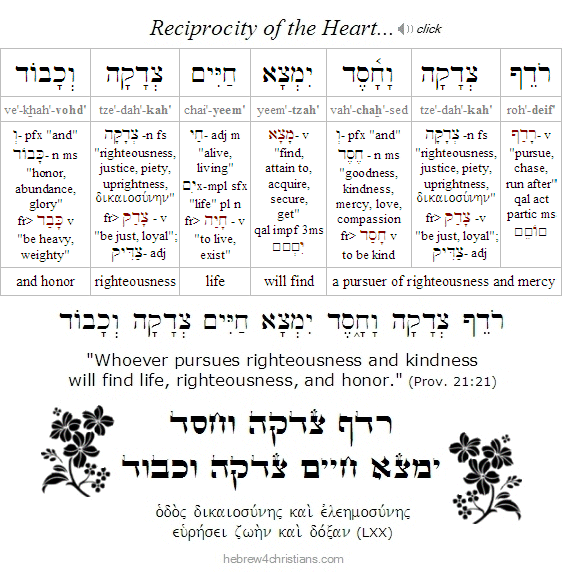 |
It is written in our Scriptures: "Whoever pursues righteousness and kindness will find life, righteousness, and honor" (Prov. 21:21). Notice that the subject of this verse is a participle that comes from the verb radaf (רָדַף), which means to follow after, or to pursue, as in a chase or a hunt. This same verb is used when King David exclaimed, "surely goodness and love will pursue me (יִרְדְּפוּנִי) all the days of my life" (Psalm 23:6). King David understood that as he pursued God, so God's love would pursue him! In other words, as we seek, so we are sought by God; as we draw near to God, so He will draw near to us (James 4:8).
Notice further the repeated use of the word "righteousness" (i.e., tzedakah: צְדָקָה) in this verse. When we pursue God's righteousness, we will find it, and we will be declared righteous (i.e., tzaddik: צַדִּיק) and given life (i.e., chayim: חַיִּים) and honor (i.e., kavod: כָּבוֹד). "In the path of righteousness is life, and in its pathway there is no death" (Prov. 12:28). Therefore Yeshua calls us to "seek first the kingdom of God and His righteousness, and all these things will be added to you" (Matt 6:33).
The prophet expresses hope: "Let us know; let us press on to know the LORD; his going out is sure as the dawn; he will come to us as the showers, as the spring rains that water the earth" (Hos. 6:3). Salvation is "of the LORD." May God help us pursue him b'khol levavkha - with all our heart - because the He has promised, "You will seek me and find me, when you seek me with all your heart" (Jer. 29:13).
 |
Anxious for Nothing...

03.16.23 (Adar 23 5783) If you are anxious over the latest rumor (or outrage) of the day, remind yourself that there is far more to life than what's going on in this world... "Look up into the heavens. Who created all the stars? He brings them out like an army, one after another, calling each by its name" (Isa. 40:26). The invisible things of Him are "clearly seen" by the eye of faith (Rom. 1:20; Psalm 19:1). Therefore let us refuse to agree with this world's way of seeing and its darkened visions; let us abandon the godless news of this age; and let us take every thought captive to the truth of Messiah. As it says in our Scriptures: "Do not be conformed to this world, but be transformed by the renewal of your mind, that by testing you may discern what is the will of God, what is good and acceptable and perfect" (Rom. 12:2).
Hebrew Lesson
Psalm 146:8 Hebrew reading (click):
Dwelling in the Promise...
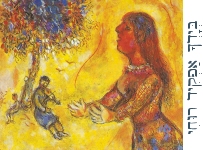
[ "These are the accounts of the tabernacle, the Tabernacle of the Witness." (Exod. 38:21) ]
03.16.23 (Adar 23 5783) The Torah commentator Rashi notes that the word mishkan (מִשְׁכָּן), often translated as "tabernacle," is spelled identically to the word mashkon (מַשְׁכֹּן), meaning a "pledge" or "promise." God gave his pledge to Israel to secure their redemption, and the mishkan illustrated the pattern of what was to come (הַתָּבְנִית שֶׁל מָה שֶׁעָתִיד לָבוֹא). Every day a defect-free lamb was offered upon the altar, both to recall the blood of the Passover lamb and to foreshadow the coming deliverance of Messiah as the great Lamb of God. This was the message from the very beginning, the sacrifice made for Adam and Eve, later dramatized by Abraham's offering of Isaac, foretelling that the One who was to come would finally rescue humanity from its lost estate. The message of the mishkan was the pledge that God's love would be assuredly be fulfilled.
Hebrew Lesson
Psalm 31:5 reading (click for audio):
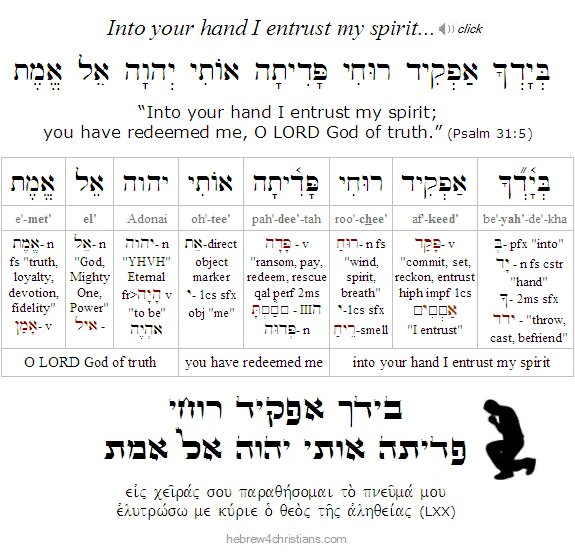 |
Choosing to Belong...
Taking the Exodus Story to Heart
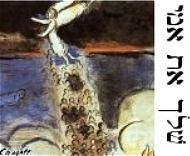
03.15.23 (Adar 22 5783) The theme of the Book of Exodus (סֶפֶר שְׁמוֹת) essentially turns on two great events, namely, the deliverance of the Israelites from bondage in Egypt (i.e., yetzi'at Mitzraim: יְצִיאַת מִצְרַיִם) and the subsequent revelation given at Sinai (i.e., mattan Torah: מַתַן תּוֹרָה). Both of these events, however, are grounded in the deeper theme of God's faithful love (chesed ne'eman: חֶסֶד נֶאֱמָן) expressed by the blessing of blood atonement (i.e., kapparat ha'dam: כָּפָרָת הַדָּם). With regard to the former, the blood of lamb (as foreshadowed in Eden) was required to cause death to "pass over" (לִפְסוֹחַ) the houses of the faithful of Israel; with regard to the latter, the sacrificial system represented by the Mishkan (i.e., "Tabernacle") was designed to teach what I call the "korban principle" (i.e., ikaron ha'keravah: עִקָרוֹן הַקרָבָה), that is, that the only way to draw near to God is by means of sacrificial blood offered in exchange for (or in place of) the trusting sinner, as stated in the Torah, "For the life of the flesh is in the blood, and I have given it for you on the altar to make atonement for your souls, for it is the blood that makes atonement by the life" (Lev. 17:11), and likewise in the New Testament we read: "without the shedding of blood there is no forgiveness of sins" (Heb. 9:22).
Jewish tradition tends to regard the giving of the law at Sinai to be the goal of the entire redemptive process, a sort of "return from Exile" to the full stature of God's chosen people. Some of the sages have taken this a step further by saying that God created the very universe so that Israel would accept the law. Such traditions, it should be understood, derive more from rabbinical thinking devised after the destruction of the Second Temple than from the narrative presented in the written Torah itself, since is clear that the climax of the revelation at Sinai was to impart the pattern of the Mishkan (תבנית המשכן) to Moses. In other words, the goal of revelation was not primarily to impart a set of moral or social laws, but rather to accommodate the Divine Presence in the midst of the people. This is not to suggest that the various laws and decrees given to Israel were unimportant, of course, since they reflect the holy character and moral will of God. Nonetheless, it is without question that the Torah was revealed concurrently with the revelation of the Sanctuary itself, and the two cannot be separated apart from "special pleading" and the suppression of the revelation given in the Torah itself... The meticulous account of the Mishkan is given twice in the Torah to emphasize its importance to God. This further explains why Leviticus is the central book of the Torah of Moses. (For more on this, see "The Eight Aliyot of Moses.")
 |
As we consider these things, however, it is important to realize that underlying the events surrounding deliverance and revelation is something even more fundamental, namely, the great theme of faith (אֱמוּנָה). This theme is our response to God's redemptive love. God's love is the question, and our response - our teshuvah - is the answer. The great command is always to "choose life!" We must chose to turn away from the darkness to behold the Light... Jewish tradition states there were many Jews who perished in Egypt during the Plague of Darkness because they refused to believe in God's love. Likewise, the revelation at Sinai failed to transform the hearts of many Jews because they despaired of finding hope.
As glorious as the redemption and revelation was, then, there was something even more foundational that gave "inward life" to God's gracious intervention. You must first believe that God loves you and regards you as worthy of His love; you must "accept that you are accepted." It is your faith that brings you near... This is the "Cinderella Story" of Exodus.
These themes of the Book of Exodus - and really of the Bible itself - will mean little to you unless you willingly identify with the calling of the Jewish people, and that implies that you reckon yourself as worth saving... You must see yourself as the recipient of divine affection and love. After all, without this as a first step, how will you make the rest of the journey? This is similar to the First Commandment revealed at Sinai: "I AM the LORD your God, who brought you out of the land of Egypt..." Notice that the statement, "I AM the LORD your God" (אנכי יהוה אלהיך) was uttered in the second person singular, rather than in the plural. In other words, you (personally) must be willing to accept the love of the LORD into your heart, since the rest of the Torah is merely commentary to this step of faith. Therefore the Book of Exodus is called Shemot (שְׁמוֹת), "names," because it sees every person as worthy of God's redeeming love and revelation. "For God so loved the world..." (John 3:16).
The midrash says that only one out of five of the children of Israel made it out of Egypt; some say one out of fifty, and some say one out of five hundred (see Mechilta). As Yeshua said: "Many are called, but few are chosen" (Matt. 22:14). Those who directly experienced God's deliverance in Egypt first of all believed they were redeemable people. Before anything else they made a decision to receive hope within their hearts. The blood of the original Passover lamb was a smeared as sign of their faith that God would accept them. We also must begin here. This is the start of the journey. We step out by faith, leaving behind the familiar - including the dark familiarity of our sin and shame - and venture out into the unknown. We venture out in hope because we trust the promises of God (הַבְטָחוֹת יהוה).
The journey of faith (מַסָע הַאֱמוּנָה) is marked with testing (בְּדִיקַת אֱמוּנָה). Being called out of the world leads you into the desert places. Faith is not something static, like a church creed or theology handbook. There are stony places, dangers, and difficulties that attend the way. We move out from "walled cities" into tents, traveling as "strangers and sojourners" on our way to a promised heavenly city. Therefore the Scriptures state that "by faith Abraham went to live in the land of promise, as in a foreign land, living in tents with Isaac and Jacob, heirs with him of the same promise. For he was looking forward to the city that has foundations, whose designer and builder is God" (Heb. 11:9-10). The way back home is the same for all who "cross over" from this world to the next. It is the way of hope, trust, and surrender.
The story of divine deliverance is not the story of "other people"; it is not a story told in the "third person." You must choose to belong. Again, your faith draws you near. That is why the sages teach: b'chol dor vador - in each and every generation an individual should look upon him or herself as if he or she (personally) had left Egypt. It's not enough to recall, in some abstract sense, the deliverance of the Jewish people in ancient Egypt, but each Jew is responsible to personally view Passover as a time to commemorate their own personal deliverance from the bondage of Pharaoh. The same must be said regarding Shavuot. Each person should consider himself as having personally received revelation at Sinai. The altar of the Mishkan was set up for you to draw near to God - you, not some people who lived long ago... This is why non-Jews who turn to the God of Israel by putting their trust in the Messiah are regarded equal members in the covenants and promises given to ethnic Israel. It is a brit milah (בְּרִית מִילָה) - literally, a "covenant of the word" - that makes us partakers of the covenantal blessings given to Abraham (Eph. 2:12-19; Gal. 3:7; Col. 2:11, etc.).
The narratives of the Book of Exodus, like other narratives of the Torah, often function as parables of faith (i.e., mishlei emunah: מִשְׁלֵי אֱמוּנָה). "The deeds of the fathers are signs for the children." Signs of what? Of the coming Messiah, as Yeshua Himself attested and the apostles likewise affirmed (John 5:46; Luke 24:27;44; Matt. 13:52; 2 Tim. 3:14-17). The Mishkan (i.e., "Tabernacle") itself was a metaphor of God's redemption (גְּאוּלַת יהוה) embodied in Yeshua. The Mercy Seat (kapporet) represented the Throne of God (Heb. 4:16; 2 Ki. 19:15) where propitiation for our sins was made (Rom. 3:25). Indeed, the word Mishkan (מִשְׁכָּן) is related to the word mashkon (מַשׁכּוֹן), a pledge or "promise on loan." The Tabernacle functioned as a "loan" to Israel until the Messiah came to establish the true Temple (הַאֲמִיתִי הַמִּקְדַשׁ) by means of His atoning sacrifice (Gal. 3:19). The law (ספר הברית) is called a "schoolmaster" meant to lead to the Messiah and His Kingdom rule (Gal. 3:23-26). The glory of the Torah of Moses was destined to fade away (2 Cor. 3:3-11), just as its ritual center (i.e., the Tabernacle/Temple) was a shadow (צֵל הַמִצִיאוֹת) to be replaced by the greater priesthood of the Messiah (כְּהוּנָת הַמָּשִׁיחַ; see Heb. 10:1; 13:10). "Now we are released from the law, having died to that which held us captive, so that we serve in the new way of the Spirit (הַדֶּרֶך הַחֲדָשָׁה שֶׁל הָרוּחַ) and not in the old way of the written code (Rom. 7:6). Yeshua is the Goal of salvation (מְטָרָת הַיְשׁוּעָה) and the "Goel" (i.e., גּאֵל, Redeemer) from the curse of the law... "For the law made nothing perfect, but on the other hand, a better hope is introduced, and that is how we draw near to God" (Heb. 7:19). When the veil is taken away, Yeshua appears on every page of Scripture... (For more on this, see "Why then the Law?," and "Paul's Midrash of the Veil").
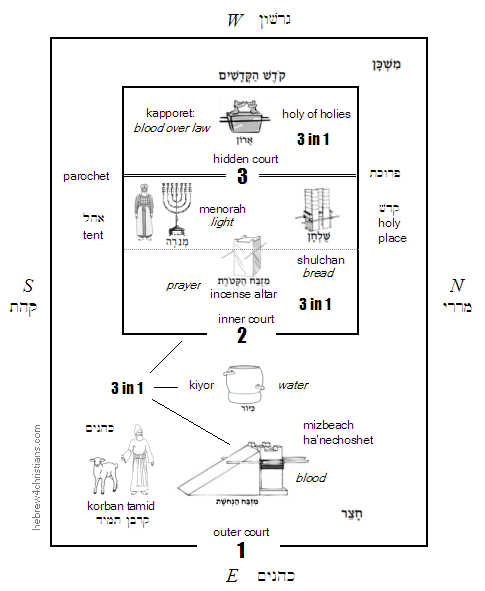 |
Outside the Mishkan, beyond the outer court, are the raw, "natural" experiences of life. This is the realm of the carnal flesh and the "dust to dust, ashes to ashes" despair of olam ha'mavet (עוֹלָם הַמָּוֶת). Genuine spiritual life (חיים רוחניים) is found when you come in through the gate (בְּדֶּרֶך הַשָׁעָר). You must understand that the gate is there for you to pass through. The cross of Yeshua is the altar where He died for you, personally, for your atonement with the Father (מִזְבֵּחַ הַכָּפָּרָה). His blood was presented between the outstretched wings of the cherubim so that you could come before God "panim el panim," that is, personally, "as a man speaks to his friend" (Heb. 4:16). Your faith bridges the gap between the Holy of Holies of the Cross (הַקֹדֶשׁ הַקֳּדָשִׁים שֶׁל הַצְּלָב) and the sanctuary of your heart...
Hebrew Lesson
Isa. 43:1b Hebrew reading:
The Friend of Sinners...
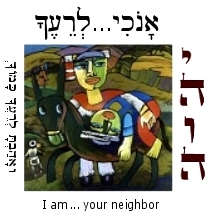
[ "God be praised that it is not because of my worthiness that God loves me. Otherwise, I might at any moment die of fear lest the next moment I cease to be worthy." - SK ]
03.15.23 (Adar 22 5783) "The Son of Man came ... and they say, 'Look at him! A glutton and a drunkard, a friend of tax collectors and sinners!'" (Matt. 11:19). People, especially the religious people, were scandalized by Yeshua because he was a "friend of tax collectors and sinners!" Yet what sickness of heart is this, to despise those who are sick? It is a sorrow of heart to realize that religion often creates an "in-group" mentality that attains its status at the expense of the "outsider," the "stranger," the "sinner," and so on... The prayer of the self-righteous is always: 'God, I thank you that I am not like other people: extortionists, unrighteous people, adulterers – or even like this tax collector" (Luke 18:11).
The religious leaders of Yeshua's day were offended because he "welcomed sinners" and enjoyed eating meals with them (Luke 15:2). We can almost hear their disapproving whispers and their dismissive accusations: "How could a good Jew behave like this? Does he not understand the call to personal holiness? Does he not know the Torah of "clean" and "unclean"? If a man is known by the company he keeps, we know enough about Yeshua to know that he's not truly pious..." And to this very day the self-righteous find offensive the idea that God welcomes the sinful, the needy, the broken, the despised, and the "outsider" into His presence... As Yeshua said, "those who are well have no need of a physician," and indeed offering them God's cure will always be regarded as a kind of poison...
We greatly rejoice that God indeed is the friend of sinners; He is the Good Shepherd who seeks and saves the lost. Thank the Lord that he comes not for the "righteous" but for those who are brokenhearted, for those mortally wounded by their own sin... Any so-called theology or religion that repudiates or minimizes God's love for the sinful, the needy, the broken, is little more than a shrine to human pride and vanity... On the contrary: the heart of the Compassionate One always welcomes a sinner who sincerely turns to Him.
Hebrew Lesson
Psalm 23:3 reading (click):
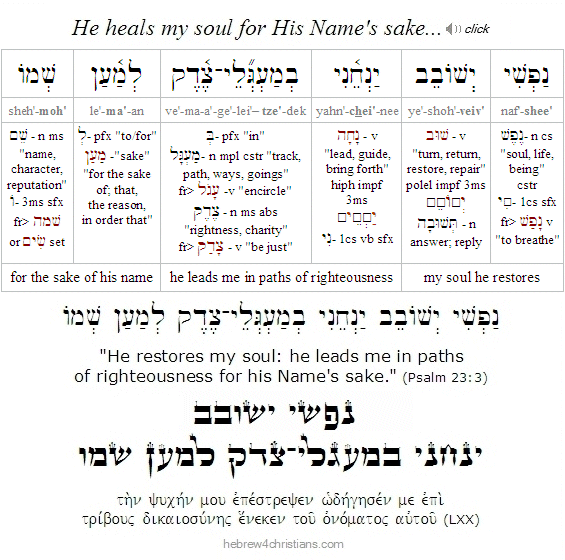 |
Seeing your Redeemed Face...

"And he (Betzalel) made the large basin of bronze and its pedestal of bronze from the mirrors of the women who served at the entrance of the tent of meeting" (Exod. 38:8).
03.14.23 (Adar 21 5783) At the entrance of the Mishkan (i.e., "Tabernacle") a copper "laver" (i.e., wash basin or cistern) was built, the place where we wash and prepare ourselves to come before the Divine Presence (Exod. 30:18). The Torah says the basin was made from the mirrors of women who offered them to help build the sanctuary (see Exod. 38:8). Spiritually understood, the mirror was transformed from a place where we encounter our own appearance to a place where we encounter God. Instead of focusing on our superficial face – how it looks and how we esteem ourselves, we now see ourselves in light of God's love, with our former self-image "sacrificed" or surrendered for the gift of a deeper self (2 Cor. 5:16). This is the "new self" cleansed by the Word of God, reflecting back the radiance of His Presence, as it says: "put on the new self (הָאָדָם הֶחָדָשׁ) created after the likeness of God in true righteousness and holiness" (Eph. 4:24).
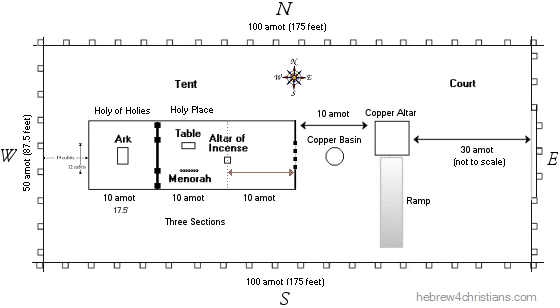 |
The "sacrificed mirror" represents turning to face reality, to see ourselves as God see us... Because of Yeshua, we have access to the inner heart of God (Heb. 4:16). Know who you are in Messiah: "And we all, with unveiled face, beholding the glory of the Lord, are being transformed into the same image from one degree of glory to another. For this comes from the Lord who is the Spirit" (2 Cor. 3:18).
Hebrew Lesson
Psalm 18:28 Hebrew reading (with comments):
Chaos and the End of Days...

03.14.23 (Adar 21 5783) We are living in stressful times; the world is drunk with its delusions and truth has fallen in the streets... Outrage and stupefied thinking are dark motifs of our moribund and cowardly culture. The Apostle Paul wrote that the time before the "End of Days" would be "perilous" and full of unrelenting human depravity and lawlessness (2 Tim. 3:1-5). Yeshua warned that apostasy would abound and that the hearts of many would run cold as ice (Matt. 24:12). In light of the raging spiritual war going on all around us, the following needs to be emphatically restated: "The important thing is to not lose your mind."
The mind is the "gateway" to your heart, and it is therefore essential to guard your thinking by immersing yourself in the truth... "Not losing your mind" therefore means being grounded in what is real, and it therefore means understanding your identity and provision as a child of God. "God has not given us the spirit of fear, but of power and of love, and of a sound mind" – literally, a "delivered" mind, "healed" from chaos and despair (2 Tim. 1:7). The Greek word "sound mind" (σωφρονισμός) comes from a verb meaning "to be made safe," in the sense of being under restraining influence of the Spirit of God... The closest Hebrew word might be musar, or "moral discipline."
Part of the task of "guarding your mind" is being able to discern between good and evil. "The fear of the LORD is to hate evil" (Prov. 8:13) and as the prophet cried out, "Hate what is wrong, love what is right" (Amos 5:15). We must love the truth and abhor the lie (Psalm 119:163, Zech. 8:19; Prov. 12:22). Tolerating sin in a world ripe for judgment is a tacit form of "collaboration" with the enemy. Indeed, the only thing regarded as intolerable in the devil's world is the denial that people have the "liberty" to sin. But the Lord is clear on this point: "Woe to those who call evil good and good evil, and who turn darkness into light and light into darkness, to those who turn bitter into sweet and sweet into bitter. Woe to those who are wise in their own eyes, and shrewd in their own sight!" (Isa. 5:20-21). It is the truth that sets people free, but this presupposes the ability to discern how we become enslaved to deception. Therefore we are instructed: "You are to distinguish between the holy and the common, and between the unclean and the clean" (Lev. 10:10).
Someone who loves you will to help you stay honest with yourself: The truth of God's moral law is likened to a Father's moral correction that leads his child to life (Prov. 6:23).
Hebrew Lesson
Proverbs 6:23 reading (click for audio):
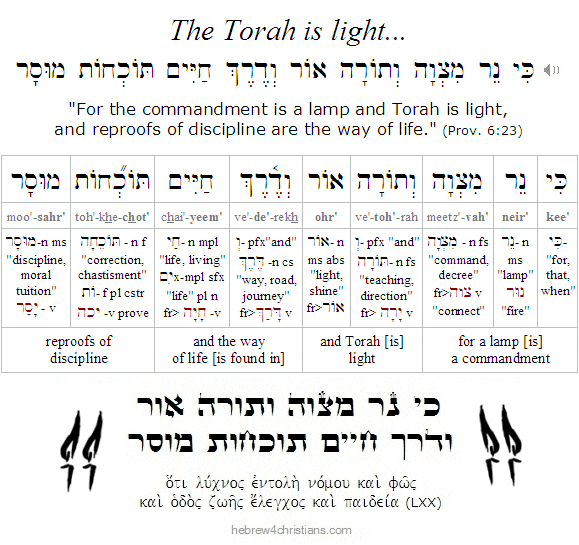 |
Audio Podcast:
End of Days Lawlessness..
I recorded the following in early 2020, though I believe it is still relevant today, and indeed, with the latest economic turmoil we are facing, it is perhaps more urgent than ever:
The Wise Hearted...

03.14.23 (Adar 21 5783) From our Torah portion this week (i.e., Vayakhel) we read: "Let every wise-hearted person among you come and make all that the LORD has commanded" (Exod. 35:10). Just as God creates the world in chesed (עוֹלָם חֶסֶד יִבָּנֶה), so the wise of heart are able to build up the sanctuary of God. "Love builds up." Being "wise of heart" (חֲכַם־לֵב) means having emotional maturity, humility, and rightly ordered affections. Such heart wisdom does not depend on how smart you are or what sort of education you might have, but rather whether you are able to emotionally comprehend a situation, whether you are willing to allow the heart to discern the inner meaning of a message. The wise of heart are those who "build up" God's kingdom and help provide sanctuary for others...
וְכָל־חֲכַם־לֵב בָּכֶם
יָבֹאוּ וְיַעֲשׂוּ אֵת כָּל־אֲשֶׁר צִוָּה יְהוָה
ve·khohl - cha·kham - lev · bah·khem
yah·voh'·oo · ve·ya·a·soo · et - kohl - a·sher · tzee·vah · Adonai

"Let every wise-hearted person among you come
and make all that the LORD has commanded"
(Exod. 35:10)

After Moses saw all the work that was done for the building of the Tabernacle, he blessed the people saying, "May it be the will of God that His Presence dwells within the work of your hands" (Exod. 39:33-43; Psalm 90:17). Rashi notes that even if a person feels entirely inadequate for the task, the Torah affirms that he should nevertheless do his or her part. "Every assembly for the sake of heaven must in the end stand" (Avot 4:11). When we apply our hearts to serve God, the Lord will give us the Spirit to empower our way; if we make ourselves his willing vessel, He will establish the work of our hands.... Amen.
Hebrew Lesson
Psalm 90:17 Hebrew reading:
Your Reason for Being...

03.13.23 (Adar 20 5783) What would Soren Kierkegaard think of the "mega" church phenomena of the post-modern world? He wrote that the "crowd is untruth," because the crowd reduces the existing soul to that of fractional significance. "It is a paralogism that one thousand human beings are worth more than one. The central point about being human is that the unit "1" is the highest; "1000" counts for less."
It has been said that God sends each soul into the world with a unique message to deliver, a revelation that only she or he can disclose... No one else can bring your message to this world - only you can do this. And since God is entirely unique, you are called to be precisely who you were created to be - and not someone else. However in order to "deliver" the message of your life you must be free from the delusions of the "false self," and that requires the decision to be honest with yourself.
Socrates' famous dictum that "the unexamined life is not worth living" means that we are willing to undergo self-examination (i.e., cheshbon ha'nefesh: חֶשְׁבּוֹן הַנֶּפֶשׁ), even if by doing so we discover our untruth, our disordered loves, our selfishness and sickness of heart. This the basis of confession of sin and healing... We must "own" who we are, take responsibility, and go "through the wound" to find freedom. This is not some trivially done but requires all of you heart. No wonder most people don't want to do teshuvah!
There are no shortcuts here; no half-measures. No one else can do this for you. Rabbi Zusya said, "In the world to come they will not ask me, 'Why were you not like Moses? They will ask me, 'Why were you not Zusya?" (Buber: Hassidim). As we ask searching questions about our heart motivations and ask God for wisdom, we move toward humility and discard our "need" for perfection. We can then accept ourselves for who we really are, namely, broken people in need of God's kindness and love.
Someone might say, 'Socrates, can you not go away from us and live quietly, without talking?' Now this is the hardest thing to make some of you believe. For if I say that such conduct would be disobedience to God and therefore I cannot keep quiet, you will think I am jesting and will not believe me; and if again I say that to talk every day about virtue (ἀρετῆς) and the other things about which you hear me talking and examining myself and others is the greatest good to man, and that the unexamined life is not worth living (ὁ δὲ ἀνεξέταστος βίος οὐ βιωτὸς ἀνθρώπῳ), you will believe me still less. This is as I say, gentlemen, but it is not easy to convince you." (Apology)
There are no "little people" in God's eyes, since each soul has been created by Him for His glory and purposes... In the eyes of heaven, the individual is higher than that of the collective, for the collective is an abstraction, whereas the individual is concreteness made in the image of God (בְּצֶלֶם אֱלֹהִים). As C.S. Lewis said: "There are no ordinary people. You have never talked to a mere mortal. Nations, cultures, arts, civilizations - these are mortal, and their life is to ours as the life of a gnat" (Weight of Glory).
The greatest blessing that has been given to you is the sheer fact of your existence. Life is a miracle and nothing is trivial. In the world to come you will be shocked to understand that everything you thought, everything you said, and everything you did was given to you from above, and therefore has tremendous significance (Matt. 12:36-37). May God open our hearts and eyes to truly come alive...
Hebrew Lesson
Psalm 139:23 reading (click for audio):
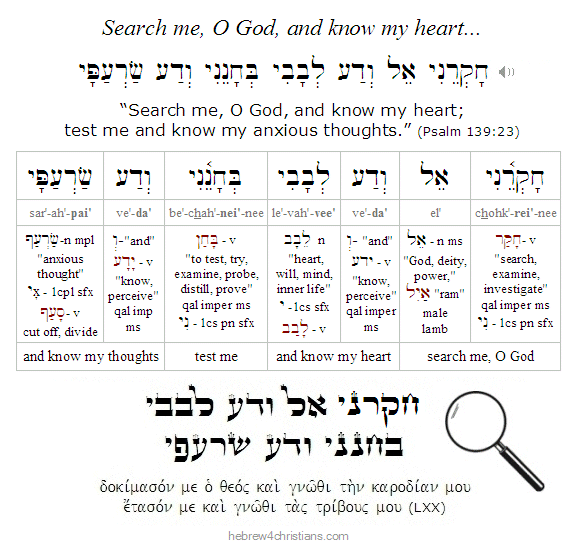 |
התהילה הנסתרת
The Hidden Glory...

03.13.23 (Adar 20 5783) So much depends on how you look at things... Take the Tabernacle, or "Mishkan," for instance. Compared to the glories of the Egyptian pyramids, the Sphinx, the enormous temples at Thebes and other places, the Mishkan must have seemed unimpressive and a bit underwheming. The Holy Place structure, for instance, measured just 20 x 20 cubits in size - a modest area covered in animal skins and curtains. Inside the tent structure (ohel) was placed the Menorah, the Shulchan (table), and the relatively small Golden Altar used to burn incense. The tent was further divided by a curtain (parochet) that cordoned off the Holy of Holies, a 10 x 10 cubit square section that contained the most sacred ritual object of all, namely, the Ark of the Covenant. All in all the Mishkan seemed to be a rather humble dwelling shrine when compared to the opulent structures of Egypt.
And yet it was here, hidden in plain sight, that the very Shekhinah Glory of the LORD was manifest, and it was here, in the midst of the darkness of the Holy of Holies, that the sacrificial blood was placed over the Ark that held the tablets of the law, representing our atonement in the Messiah. In the midst of the dark cloud, with the plume of incense rising, the High Priest offered up the blood "la'Adonai," designated as the Lord's, to heal us from our separation from his love and truth. And all this was a "pattern" to demonstrate the greater reality of the sacrificial death of Yeshua given on our behalf.
As the Book of Hebrews argues, Yeshua is the High Priest of the New Covenant of God, ordained of after the "order of Malki-Tzedek," the one who bears the office of High Priest not based on the Torah given at Sinai, based as it was on the weakness of the flesh, but by virtue of the power of the everlasting oath and the power of Almighty God (Psalm 110:4). As such Yeshua has made the New Covenant (הַבְּרִית הַחֲדָשָׁה) with those who trust in his sacrificial death offered for their sins. hose who belong to Him have a new altar not based on the temporary provision of the Levitical priesthood (Heb. 7:11; Heb. 13:10). And just as the humble tabernacle disguised the Divine Presence from the eyes of the proud, so the humility of Yeshua our High Priest was hidden. First he was born in obscurity and in poverty. He emptied Himself of regal glory to become "God with us," one who would bear our sorrows. For the cross at Calvary was the Altar by which His sacrificial blood was once and for all offered to secure for us an everlasting atonement (i.e., καταλλαγή, literally place of exchange: "life for life"). The cross of Messiah appears as "foolishness" to the proud eyes of this world, but to those who are saved it is the power of God (1 Cor. 1:18).
Hebrew Lesson
Isaiah 53:4 reading (click):
 |
Anticipating Passover:
Shabbat HaChodesh...

03.13.23 (Adar 20 5783) The world runs on a "clock" that operates under assumptions that are different than those revealed in the Scriptures.... The "wisdom of this world" (σοφία τοῦ κόσμου τούτου) is the prevailing cultural spirit that suppresses the reality of God's Presence and truth. Such "wisdom" is regarded as foolishness before God, and God has promised to "seize the so-called wise in their own craftiness" (1 Cor. 3:19). The life of faith, on the other hand, sees what is invisible. Faith (emunah) apprehends "the substance (ὑπόστασις) of things hoped for, the assurance (ἔλεγχος, conviction, "correction," "argument," i.e., hokhachah: הוכחה) of things not seen" (Heb 11:1). As the Scripture says, the heart of faith "looks not to the things seen but to the things unseen; for the things that are seen are transient, but the things that are unseen are eternal" (2 Cor. 4:18).
The Sabbath that immediately precedes (and sometimes falls on) the Biblical New Year is called Shabbat HaChodesh (שבת החודש), the "Sabbath of the Month" (of Nisan). This Sabbath is significant because it marks the start of the month of Redemption (i.e., the first month called Nisan) which God called "the beginning of months" (i.e., Rosh Chodashim). We honor this event by reading an additional passage from the Torah concerning the sanctification of the new moon (Exod. 12:1-20), and we spiritually prepare for this month by studying about Passover and the coming spring holidays:
 |
The commandment to sanctify the first new moon of the year (i.e., Rosh Chodashim) reveals that it is our responsibility to sanctify (i.e., observe) Biblical time in general. In other words, when we observe "the beginning of months," we are acknowledging that time itself is rooted in the Biblical calendar with its divinely inspired cycle of festivals (i.e., the moedim). Note that this year the Biblical New Year begins on Wed. March 22nd at sundown, and therefore Passover begins exactly two week weeks later, Wed. April 5th at sundown:
 |
Originally Rosh Chodashim was simply called the "first month" because it marked the month of the Exodus and the other months were named in relation to it, similar to the days of the week in the Hebrew calendar (i.e., the first day, the second day...). Later it was called Chodesh Ha-Aviv (חודש חביב) - "the springtime month" (because the calendar is reset in the spring) and later still as Nisan (ניסן), to recall God's faithfulness after the Babylonian Exile (Neh. 2:1; Esther 3:7).
The word "Nisan" (נִיסָן) might come from either the word nitzan (ניצן), meaning "bud" (Song 2:12), or the word nissim (ניסים) meaning "miracles," both of which suggest physical and spiritual resurrection in our lives. Others think the word comes from the verb nus (נוּס), meaning "to flee," both in relation to Israel's flight from Egypt and Egypt's flight from Israel (i.e., when the pursuing Egyptian cavalry fled (נָסִים) before the sea closed upon them (Exod. 14:25, 27). We also see this usage in the verse: "The wicked flee (נָסוּ) when no one pursues, but the righteous are bold as a lion" (Prov. 28:1). The devil's power is found in the lie. If he can make you afraid, you will not think clearly. Establishing your faith in the truth will embolden you to deal with the lies and distortions that are intended to enslave you in fear. As Yeshua said, the truth will set you free (John 8:32).
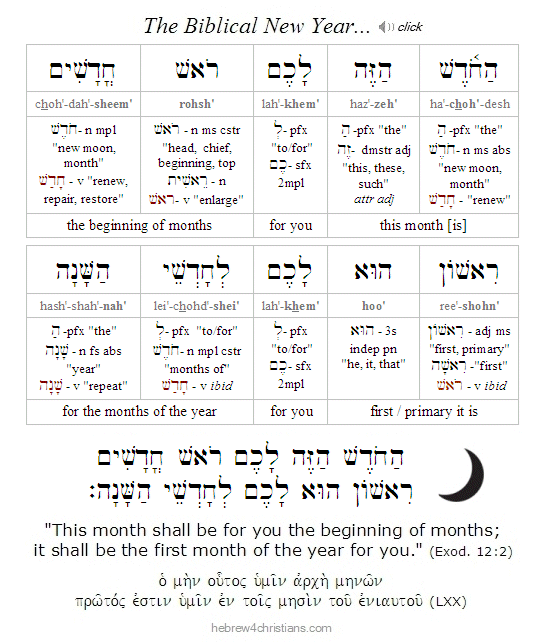 |
The new moon of Nisan is the most significant of the "new moons" of the Jewish calendar since it initiates the first month of the Biblical Calendar - and therefore represents the Biblical "New Year's Day." Of all the various Rosh Chodesh celebrations, then, Rosh Chodesh Nisan is foundational, since it presents the starting point for the cycle of the yearly festivals (mo'edim) that reveal prophetic truths about the LORD God of Israel and His beloved Son, Yeshua the Messiah, blessed be He.
יְהִי רָצוֹן מִלְּפָנֶיךָ יהוה אֱלהֵינוּ
וֵאלהֵי אֲבוֹתֵינוּ
שֶׁתְּחַדֵּשׁ עָלֵינוּ שָׁנָה טוֹבָה וּמְתוּקָה
בַּאֲדנֵינוּ יֵשׁוּעַ הַמָּשִׁיחַ אמן
ye·hee · rah·tzon · meel'·fah·ne'·kha · Adonai · E·loh·hey'·noo
ve·loh·hei · a·voh·tey'·noo
she'·te·cha·desh · ah·leiy'·noo · shah·nah · toh·vah · oo·me·too·kah
ba·a·doh·ney'·noo · Ye·shoo'·a · ha'·mah·shee'·ach [ah·mein]

"May it be your will, LORD our God
and God of our fathers,
that you renew for us a good and sweet year
in our Lord Yeshua the Messiah." [Amen]

Download Study Card
Glory Fills the Temple
Parashah Pekudei...
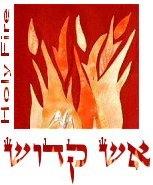
[ This week we have a "double portion of Torah, parashat Vayakhel and parashat Pekudei... ]
03.13.23 (Adar 20 5783) Our (second) Torah reading for this week is called parashat Pekudei, which is the concluding portion of the great Book of Exodus (i.e., ספר שמות). It begins with Moses' accounting of (פקודי) all the materials that were donated for the construction of the Mishkan (i.e., Tabernacle). After Moses recorded the inventory of the building materials and furnishings, he carefully checked the special priestly garments. After all the work was confirmed to be in complete accordance with the LORD's instructions, Moses blessed the people. The LORD then commanded Moses to assemble the Mishkan on "the first month in the second year [from the date of the Exodus], on the first day of the month" (i.e., on Nisan 1, or Rosh Chodashim, Exod. 40:17).
Once the Tabernacle was completed and all its vessels were accounted for and inspected, Moses anointed all its components with the sacred anointing oil, called shemen ha-mishchah (note that the word "mishchah" (מִשְׁחָה) comes from the same root as "Messiah" (מָשִׁיחַ), indicating that the Mishkan (i.e., Tabernacle) would foreshadow God's plan of redemption given in Yeshua). Moses then formally initiated Aaron and his four sons into the priesthood, marking their hands and feet with sacrificial blood and "waving them" before the Lord to picture resurrection. God's Presence - manifest as the Shekhinah Cloud of Glory – then filled the Holy of Holies in the Tent of Meeting.
At the end of the portion we read, וַיְכַל משֶׁה אֶת־הַמְּלָאכָה / "Moses finished all the work" (Exod. 40:33), a phrase that has the same gematria (numeric value) as bereshit (בְּרֵאשִׁית, "in the beginning"), the very first word of the Torah (Gen. 1:1). This suggests that the creation of the universe was for the sake of the building of the Tabernacle, and by extension, for the sake of the sacrificial love of God to be demonstrated to all of creation. The Talmud states, "All the world was created for the Messiah" (Sanhedrin 98b) and indeed, Yeshua is called "the Lamb slain from the foundation of the world" in the New Testament (Rev. 13:8; 1 Pet. 1:18-20; Eph. 1:4; 2 Tim. 1:9).
The Presence of the Glory of God that descended from Sinai upon the newly dedicated Mishkan represented a climactic moment for the fledgling nation, since the Sin of the Golden Calf had jeopardized whether the God would indeed dwell within the midst of the camp of Israel... Recall that it was only after Moses had returned from Sinai bearing the second set of Tablets (on Yom Kippur) that the glow of the LORD's redeeming love radiated from his face, and new hope was given to Israel (prefiguring the New Covenant). The King of Glory would accompany the people from Sinai to the Promised Land! (The narrative continues in the Book of Numbers, beginning exactly one month after the Mishkan was assembled.)
Constructing the Tabernacle
Parashah Vayakel...
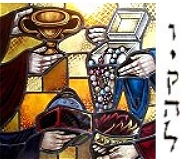
[ This week we have a "double portion of Torah, parashat Vayakhel and parashat Pekudei... ]
03.13.23 (Adar 20 5783) This week we have a "double portion" of Torah: parashat Vayakhel (ויקהל) and parashat Pekudei (פקודי). Some of this material is repeated from the earlier description of the Tabernacle (המשׁכן) to underscore the importance of the sacrificial system (the altar) and to portend the two advents of Messiah Yeshua.
Now according to tradition, Moses descended from Sinai (with the second set of tablets) on Yom Kippur (Tishri 10), and on the following morning he assembled (i.e., vayakel: וַיַּקְהֵל) the people together to explain God's instructions regarding building the Mishkan (i.e., Tabernacle). First, however, Moses reminded the people to observe the Sabbath as a day of rest, and then he asked for contributions of gold, silver, bronze, and other materials for the construction of the sanctuary and its furnishings. Each contribution was to be a "free-will offering" (i.e., nedivah zevach: נְדָבָה זֶבַח) made by those "whose heart so moved him." As a sign of their complete teshuvah (repentance) for the sin of the Golden Calf, the people gave with such generosity that Moses finally had to ask them to stop giving!
Betzalel and Oholiav were appointed to be the chief artisans of the Mishkan, and they led a team of others that created the roof coverings, frame, wall panels, and foundation sockets for the tent. They also created the parochet (veil) that separated the Holy Place (ha'kodesh) from the Holy of Holies (kodesh ha'kodeshim). Both the roof and the veil were designed with embroidered cherubim (winged angelic beings). Betzalel then created the Ark of the Covenant and its cover called the mercy seat (kapporet), which was the sole object that would occupy the innermost chamber of the Holy of Holies. Betzalel also made the three sacred furnishings for the Holy Place – the Table of Bread (shulchan), the lamp (menorah), and the Altar of Incense (mizbe'ach ha'katoret) – as well as the anointing oil that would consecrate these furnishings.
Betzalel then created the Copper Altar for burnt offerings (along with its implements) and the Copper Basin from the mirrors of women who ministered in the entrance of the tent of meeting. He then formed the courtyard by installing the hangings, posts and foundation sockets, and created the three-colored gate that was used to access the courtyard.
The "Passion" of Moses

03.12.23 (Adar 19 5783) In the solitude of his tent Moses was deeply troubled, even distraught. Undoubtedly he pondered everything in his life that had brought him to this difficult place... Alas, in light of the recent disaster at Sinai, Moses realized he was now at an utter impasse. Would God continue His redemptive plan or was this the end of the great dream? Therefore Moses poignantly appealed to God: "If I have found favor (grace) in your eyes, let me know your ways, that I may know you and continue in your favor" (Exod. 33:13). God responded by reassuring Moses that His Presence would be with him (alone) and that he (alone) would "enter His rest." But Moses protested: "Unless You go in the lead, do not make us leave this place. For how shall it be known that I have found favor in your sight -- I and your people? Is it not in your going with us, so that we are distinct, I and your people, from every other people on the face of the earth?" And the LORD said to Moses, "This very thing that you have spoken I will do, for you have found favor in my sight, and I know you by name" (Exod. 33:15-17). Moses' poignant intercession touched God's heart, causing Him to change from a mode of strict judgment (middat ha-din) to one of mercy and forgiveness (middat ha-rachamim). This was the "gospel" moment at Sinai....
Upon hearing God's words of comfort, Moses was so overcome that he exclaimed: "Oh, let me behold Your Presence!" (Exod. 33:18), whereupon God answered, "I will make all My goodness pass before you, and I will proclaim before you the name LORD (יהוה), and I will be gracious to whom I will be gracious, and will show mercy on whom I will show mercy" (Exod. 33:19, cp. Rom. 9:15). Note that Moses would receive the revelation of the Name when he "stands upon the Rock" (Exod. 33:21).
The LORD then instructed Moses to carve a new set of tablets and to meet him again at the place (i.e., makom: מָקוֹם) on the top of Sinai, where He would descend in the cloud to "declare His Name" (Exod. 33:17-34:7). This dramatic experience of revelation was later called middot ha-rachamim (מדות הרחמים) or the revelation of the attributes (or "measures") of God's mercy, and was considered a divine "addendum" to the original covenant terms. Rabbinic tradition later incorporated the recitation of middot ha-rachamim into the Yom Kippur service.
Hebrew Lesson
Exodus 34:6 reading (click for audio):
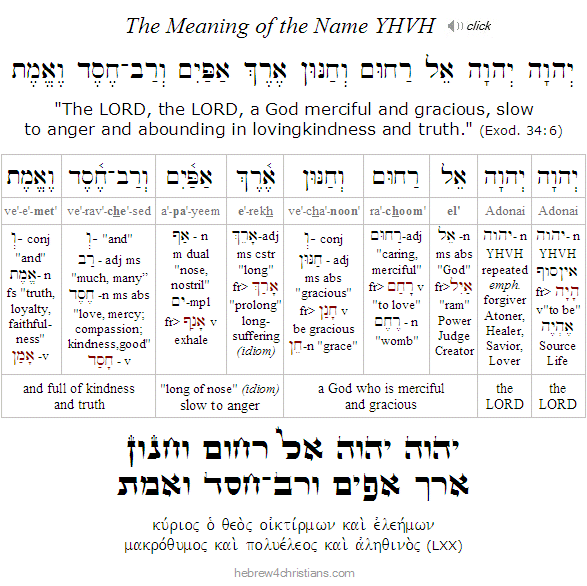 |
So what are some of these attributes? Note first that the LORD calls himself rachum v'chanun (רַחוּם וְחַנּוּן), often translated "merciful and gracious." The noun rechem (רֶחֶם) means "womb" in Hebrew, indicating that God's compassion is like a mother's deep love for her child. The word chanun (חַנּוּן) comes from the word for grace or favor (i.e., chen: חֵן), and indicates that God is a graceful giver who is favorably disposed to help those in need. The LORD is compassionate to those who call upon Him.
The phrase erekh apayim (אֶרֶךְ אַפַּיִם) literally means "long of nose," an idiom used to describe someone who is patient and slow to anger, i.e., "longsuffering" (Prov. 14:29). The word chesed (חֶסֶד), is often translated as "lovingkindess" or "steadfast love," and implies devotion and fidelity. God describes Himself as rav chesed v'emet (רַב־חֶסֶד וֶאֱמֶת), that is abundant in His kindness and faithful love.
It is fascinating to see that this revelation prefigures the New Covenant (הברית החדשה) that was given to Israel. Just as the first set of tablets, based as they were on the justice and holiness of God, were broken, so a second set was given based on the middot (attributes) of the LORD's mercy and grace. Indeed, Yeshua was broken on behalf of the law but was raised again so that all who trust in Him can truly understand that God is "merciful and gracious, slow to anger and abounding in steadfast love and truth" (Exod. 34:6, Psalm 86:15, 103:8).
It can be readily argued that the revelation of the Name YHVH (Exod. 34:5-7) was a "gospel" moment for Israel. The episode of the Golden Calf revealed that the Jews were unable to keep the law, even though they personally experienced the power of God's deliverance from Egypt and His ongoing care on the way to Sinai. Despite the judgments brought upon Egypt, despite the overthrow of Pharaoh and his armies in the sea, despite the bitter waters made sweet, despite the manna from heaven, despite the miraculous well of Miriam, despite the awesome revelation at Sinai, and despite the pledge of the Israelites: kol asher diber Adonai na'aseh v'nishma, "All that the LORD has spoken we will do, and we will be obedient" (Exod. 19:8; 24:7), the Sin of the Golden Calf revealed that something more was needed, and that the law itself was insufficient to change the inner heart of man (Rom. 3:20). The intercession of Moses on behalf of Israel - his willingness to die on behalf of the people - revealed the heart of the New Covenant (בְּרִית חֲדָשָׁה) of the LORD, the deeper revelation of the God's character of mercy and grace. Apart from God's gracious love and compassion, the law by itself rendered only the righteous verdict of death for Israel...
For more, see "God's Stubborn Love: Further thoughts on Parashat Ki Tisa."
The Love of Truth...
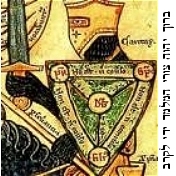
03.10.23 (Adar 18 5783) Christian (and Jewish) theology insists that spiritual truth matters, and knowing the truth about God is absolutely essential for life itself. Nothing is more important. Nothing is more vital. "This is eternal life (חַיֵּי עוֹלָם), that they may know you, the only true God (אֶל־אֱמֶת), and Yeshua the Messiah (יֵשׁוּעַ הַמָּשִׁיחַ) whom you have sent (John 17:3). The truth sets us free; it is the unbreakable seal that bears witness of reality. In the Gospel of John it is recorded that Yeshua said, "I am the way, the truth, and the life" (i.e., ᾽Εγώ εἰμι ἡ ὁδὸς καὶ ἡ ἀλήθεια καὶ ἡ ζωή). The Greek word translated "truth" in this verse is aletheia (ἀλήθεια), a compound word formed from an alpha prefix (α-) meaning "not," and lethei (λήθη), meaning "forgetfulness." (In Greek mythology, the "waters of Lethe" induced a state of oblivion or forgetfulness.) Truth is therefore a kind of "remembering" something forgotten, or a recollecting of what is essentially real. Etymologically, the word aletheia suggests that truth is also "unforgettable" (i.e., not lethei), that is, it has its own inherent and irresistible "witness" to reality. In that sense light is a metaphor for truth: "The light shines in the darkness, and the darkness has not overcome it" (John 1:5). There can be no truth apart from moral reality. People may lie to themselves, but ultimately truth has the final word.
Greek scholars note that the word lethei itself is derived from the verb lanthano (λανθάνω), which means "to be hidden," so the general idea is that a-letheia (i.e., truth) is non-concealment, non-hiddenness, or (put positively) revelation or disclosure. Thus the word of Yeshua - His message, logos (λόγος), revelation, and presence - is both "unforgettable" and irrepressible. Yeshua is the Unforgettable One that has been manifest as the express Word of God (דְּבַר הָאֱלהִים). Yeshua is the Light of the world (אוֹר הָעוֹלָם) and the one who gives us the "light of life" (John 8:12). Though God's message can be suppressed by evil and darkened thinking, the truth is self-evident and intuitively certain (see Rom. 1:18-21).
We have a moral imperative, given by God Himself, to receive the truth and to live according to the nature of spiritual reality. Those who reject or suppress the truth, however, are responsible for their actions, as it is written, "No one who practices deceit shall dwell in my house; no one who utters lies shall continue before my eyes" (Psalm 101:7).
Hebrew Lesson
Psalm 25:5a reading (click):
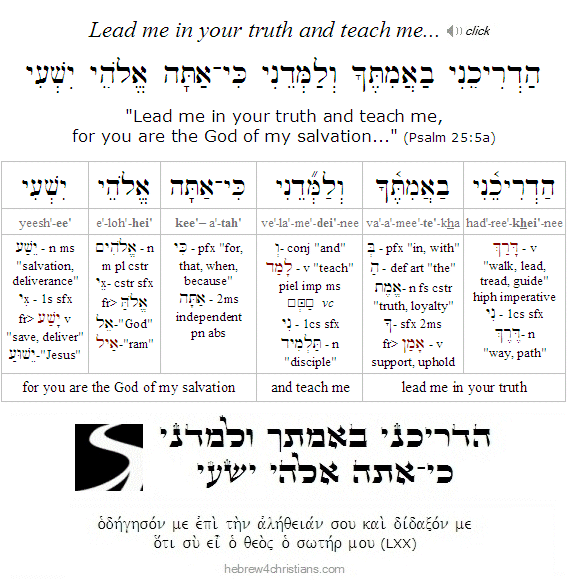 |
Our Daily Deliverance...

03.10.23 (Adar 18 5783) Just as we ask God for daily bread (לֶחֶם חֻקֵּנוּ), so we ask him for our daily deliverance: "Lead us not into temptation, but deliver us from evil" (Matt 6:13). Note that the term translated "evil" in many translations ("deliver us from evil") is a substantive rather than an adjective: τοῦ πονηροῦ, the evil one... "Give us this day our daily deliverance from the evil one...." Our daily bread and our daily deliverance are connected with our decision to "choose life" (בַּחַרְתָּ בַּחַיִּים) -- and to always choose life -- even in moments we find difficult, distressing, and even when we might wish that we were no longer living... Choosing life means refusing to escape reality by evading the significance of our choices; it means finding the will to regard life as worthy; it implies that we will eat our bread in trust that the Lord is at work even in the darkest of hours (Passover occurred at midnight)... Choosing life means refusing to eat the fruit of death and to seek Yeshua, the Tree of Life. We live one day at a time; we only have today. We are given daily bread for this hour of our need. Today is the day of your deliverance - if you are willing to walk in it. Therefore, the Spirit of the Living God cries out, "Choose life and live!"
"Do not be grieved [even over yourself], for the joy of the LORD (חֶדְוַת יְהוָה) is your strength" (Neh. 8:10). Affirming the love, faithfulness, compassion, and salvation of God is a powerful way to defeat the enemy of our souls, who regularly entices us to despair. King David constantly asked God to help him in his spiritual struggles. "Though I walk in the midst of trouble (בְּקֶרֶב צָרָה), you preserve my life; you stretch out your hand against the wrath of my enemies, and your right hand delivers me" (Psalm 138:7). "For the enemy has pursued my soul; he has crushed my life to the ground; he has made me sit in darkness like those long dead. Therefore my spirit faints within me; my heart within me is appalled" (Psalm 143:2-3). Despite whatever struggle we may face, "the LORD is near to the brokenhearted and saves the crushed in spirit (Psalm 34:18). Indeed, the Lord God is far greater than your heart's sin and will one day entirely deliver you of sin's effect and influence. Amen.
Hebrew Lesson
Psalm 34:19 reading (click):
Trusting His Heart...

[ The following is related to our Torah reading this week, parashat Ki Tisa. Please read the Torah portion to find your place here... ]
03.10.23 (Adar 18 5783) If you can't detect God's hand in your circumstances, then trust His heart... The heart of faith affirms: gam zu l'tovah (גַּם זוּ לְטוֹבָה): "this too is for good," particularly when the present hour may be shrouded in darkness... Whenever I am confused about life (which is often enough), I try to remember what God said to Moses after the tragic sin of the Golden Calf: "I will make all my goodness pass before you and will proclaim before you my Name, 'The LORD' (יהוה). And I will be gracious to whom I will be gracious, and will show mercy on whom I will show mercy" (Exod. 33:19). God's character does not change: the LORD is the same "yesterday, today, and forever." The meaning of the Name, however, cannot be known apart from understanding the need of the heart...
Hebrew Lesson
Exodus 34:6 reading (click):
 |
Earlier God had revealed to Moses that the Name YHVH (יהוה) means: "He is Present" (i.e., the word is a play on the Hebrew verb hayah [הָיָה], "to be"), and therefore the LORD God is "always there" (Exod. 3:14). The great I AM (אֶהְיֶה) means God stands outside of the constraints of time, "one day is as a thousand years" and "a thousand years as one day" before Him (2 Pet. 3:8). Just as a thousand years is but "a watch in the night" (Psalm 90:4), so one day is as a thousand years. God's Spirit broods over all things and sustains the entire universe. God is "necessary being," the Source of Life, and foundation for all other existence. God's creative love and power sustain all things in creation...
Now while the idea that God is the Source of all life in the universe is surely important, it is not entirely comforting, especially in light of man's guilt and anxiety over death. After all, we do not stand before the "god of the philosophers," but rather the personal God of Abraham, Isaac, and Jacob. The meaning of the Name YHVH - that He is merciful, gracious, slow to anger, abounding in love and truth (Exod. 34:6-7) - therefore presents additional revelation in face of man's inherent brokenness and spiritual need. Some things in life are only known in the passion of faith... things like love, beauty, honor, and so on. The Name of the LORD as the Compassionate One is only known in humility, when all human pretense is stripped away and the inner life is laid bare in its desperate need. The Name YHVH is God's response to the heart's cry for deliverance, for compassion, for mercy....
What is God like - what is His heart - is the first question, and how we answer that will determine how we deal with all the other questions that come up in theology... What do you feel inside when you look up at the ceiling before you go to bed? In light of the ambiguity and heartaches of life we might wonder if God is truly there for us. Does God care? Is He angry at me? Does He really love me? This is the raw place of faith, where we live in the midst of our questions. The Name YHVH means "He is present," even when we are unconscious of His Presence in the hour of our greatest need.
The religionist is at risk of being enslaved to the idea of God's conditional acceptance. His unconscious creed is: "If you (outwardly) obey, then you belong." The message of the cross scandalizes the realm of the outwardly religious because it boldly states, "if you believe, then you belong..." As Kierkegaard rightly observed, "And this is the simple truth - that to live is to feel oneself lost. He who accepts it has already begun to find himself, to be on firm ground. Instinctively, as do the shipwrecked, he will look around for something to which to cling, and that tragic, ruthless glance, absolutely sincere, because it is a question of his salvation, will cause him to bring order into the chaos of his life. These are the only genuine ideas; the ideas of the shipwrecked. All the rest is rhetoric, posturing, farce." For Kierkegaard, religious rituals devoid of a sense of crisis within the heart are little more than a sham. "I think of the times I tried to use him to make my life secure, and undisturbed, and painless. Also the times I was enslaved by fear of him, and by the need to protect myself against him through rites and circumstances" (Anthony de Mello). Religious behavior (i.e., rituals, ceremonialism, etc.) is an otiose substitute for trusting that God's heart (YHVH) is forever present for you.
 |
Postmodern Fatuity...

03.10.23 (Adar 18 5783) Dietrich Bonhoeffer (1906-1945), a German pastor who was surrounded by the madness of the Nazis and was murdered at their hands, regarded stupidity as more dangerous than outright evil, since stupidity is a type of irrationality, a chosen ignorance of what is real and true. Against such willed ignorance we are often defenseless, since any reasoning that appeals to transcendental moral truth finds no traction, carries no weight, and has no effect. The devil, then, seeks first of all to stupefy people, that is, to drug them or flatter and persuade them to think that there is no need to engage in serious thinking or to humbly question their assumptions... As William James observed: "A great many people think they are thinking when they are merely rearranging their prejudices." The antidote to unthinkingly accepting the biases and inculcated prejudices of the world is to humble ourselves by learning to sincerely respect the Reality of God: "The fear of the LORD is the beginning of knowledge; but fools despise wisdom and correction" (Prov. 1:7). The "progressive church" movement of today is an example for us...
Those who deny that truth exists (or those who deny that something may be known about reality) are themselves making a truth claim, namely the claim that there is no such thing as objective truth (or that knowledge of the world is not possible). This self-inflicted incoherence is a sign of irrationalism, of course, the abandonment of reason, which perhaps is the ulterior motive for such manner of thinking, after all. The person who denies truth does so to escape the demands of truth – to flee from personal responsibility before moral and spiritual Reality. It is a form of "wish-fulfillment" to deny that people are not responsible for what they believe and how they live their lives. Hence our culture's obsessive "busyness," its craving for ongoing diversion, entertainment, fantasy, escapism, and so on. Our generation regards "boredom" as evil yet finds nothing of lasting interest because it has forsaken the big questions of life and the pursuit of truth. Popular culture encourages apathy, indifference, and seeks to enslave people to thrills and or fears of the moment... The ancient pagan world at least esteemed honor and believed in the pursuit of virtue and truth, but today's post-Christian world is nihilistic, anarchist, and therefore marks a return to barbarism.
The ground of all right thinking about reality is "wonder," or the sense that life itself is something mysteriously beautiful, amazing, and therefore inherently sacred. This is sometimes called yirat Adonai (יִרְאַת יְהוָה), "the fear of the LORD" that leads to wisdom. Right thinking therefore begins with consciousness of the good (הַכָּרַת טוֹבָה), that is, with an awareness that life itself a gift, a mystery, and a hallowed question... We seek our origin, our essence, and our purpose -- and in our seeking we seek the LORD. We long for deliverance from what keeps us from healing, from love, from real hope. And as we seek, the wonder of the LORD God never ends. As Yeshua said, "Ask, and it will be given to you; seek, and you will find; knock, and it will be opened to you" (Matt. 7:7).
Hebrew Lesson
Proverbs 1:7 reading (click for audio):
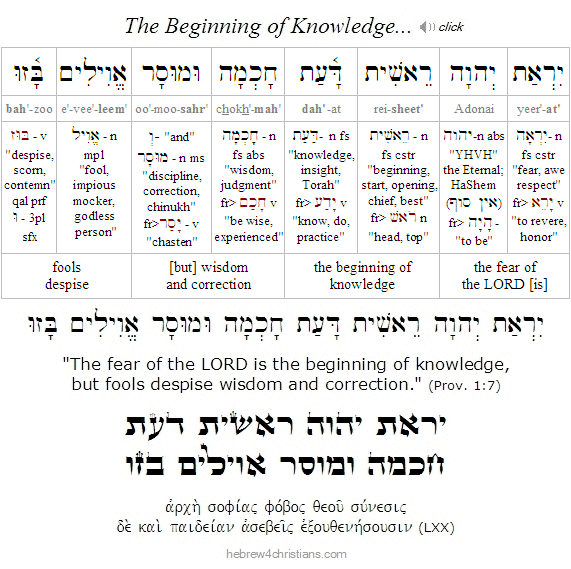 |
The Torah of Mercy...
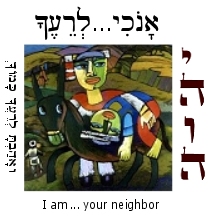
03.09.23 (Adar 17 5783) In this week's Torah portion (i.e., Ki Tisa) we read: "Therefore the people of Israel shall keep the Sabbath, observing the Sabbath (לַעֲשׂוֹת אֶת־הַשַּׁבָּת) throughout their generations, as a covenant forever. It is a sign forever (אוֹת הִוא לְעֹלָם) between me and the people of Israel that in six days the LORD made heaven and earth, and on the seventh day he rested (שָׁבַת) and was refreshed (וַיִּנָּפַשׁ)" (Exod. 31:16-17).
Upon a closer consideration of this text we might wonder how we can both "do" and "not do" something at the same time? Note that the phrase "observing the Sabbath" (לַעֲשׂוֹת אֶת־הַשַּׁבָּת) can literally be understood as "making" or "doing" (עשׂה) the Sabbath, and yet we are told to "rest" -- שָׁבַת -- meaning to cease or desist from any labor (מְלָאכָה). Indeed God calls the Sabbath day "shabbat shabbaton" (שַׁבַּת שַׁבָּתוֹן), a day of complete rest, holy to the LORD (Exod. 31:15). So how can we "make" the Sabbath and yet cease from work?
The sages have attempted to resolve this paradox by saying that the words, "on the seventh day he rested and was refreshed" (וּבַיּוֹם הַשְּׁבִיעִי שָׁבַת וַיִּנָּפַשׁ) imply that God did something after he created the universe, namely he "made rest" by celebrating the work of his hands and savoring the beauty of his creation. God "set the table" for creation and paused to reflect on its significance and purpose, and he wants us to do likewise.
We can "make" the Sabbath day a time of "rest" or menuchah (מְנוּחָה), by letting go of our weekly concerns and the usual preoccupations that surround our lives. Sabbath is an invitation to "ascend" to a higher level, to consciously re-connect with God as both our Creator and our Redeemer. We lift up the cup of God's salvation; we partake of the bread of heaven.... We glorify the great Lamb of God. If we make the Sabbath a delight, a time of holiness and honor, then God "will cause you to ride upon the high places of the earth, and he will feed you with the heritage of Jacob thy father" (Isa. 58:13-14). "Behold, the LORD'S hand is not shortened, that it cannot save; neither is his ear heavy, that it cannot hear."
The Fourth Commandment says we are to keep the Sabbath day holy (קָדוֹשׁ), and it further connects this with separating from worldly preoccupation: "six days shall you labor and do all your work" (Exod. 20:9). Resting from work, as Abraham Heschel once said, "is not a depreciation but an affirmation of labor, a divine exaltation of its dignity." And because we are called aside from the burden of the mundane, we are "lifted out" of the process of time, not focusing on what we do but rather who we are as God's redeemed people...
This is further exemplified in the ministry of Yeshua who "worked" on the Sabbath in the sense of doing acts that were derived from his connection with heaven. It can be assumed that Yeshua and his family faithfully observed the Sabbath and regularly attended synagogue (Luke 4:16). However later on, during the time of his active ministry we read that Yeshua's idea of the Sabbath included doing works of lovingkindness (גְּמִילוּת חֲסָדִים): "At that time Yeshua went through the grain fields on the Sabbath. His disciples were hungry and began to pick some heads of grain and eat them. When the Pharisees saw this, they said to him, 'Look! Your disciples are doing what is unlawful on the Sabbath.'" But he said to them, 'Have you not read what David did when he was hungry, and those who were with him: how he entered the house of God and ate the bread of the Presence, which it was not lawful for him to eat nor for those who were with him, but only for the priests? Or have you not read in the Law how on the Sabbath the priests in the temple profane the Sabbath and are guiltless? I tell you, something greater than the Temple is here'" (Matt. 12:2-6).
Here we see Yeshua's understanding that Sabbath is to be centered upon life and healing and not merely the abstention from work. When later Yeshua was accosted by the Pharisees regarding healing a man on the Sabbath day, we read that he said to them, "Which one of you who has a sheep, if it falls into a pit on the Sabbath, will not take hold of it and lift it out? Of how much more value is a man than a sheep! So it is lawful to do good on the Sabbath" (Matt. 12:11-12). This is the principle of pikuach nefesh (פִּיקוּחַ נֶפֶשׁ), saving a life, which preempts other considerations of religious observance... As Yeshua said, "man was not made for the Sabbath, but the Sabbath was made for man" (Mark 2:27).
"And Pharisees came up and in order to test him asked, 'Is it lawful for a man to divorce his wife?' He answered them, 'What did Moses command you?' They said, 'Moses allowed a man to write a certificate of divorce and to send her away.' And Yeshua said to them, 'Because of your hardness of heart he wrote you this commandment...'" (Mark 10:2-5; see also Matt. 19:8-9). Note here that Yeshua plainly explained that the "law" on divorce was given to accommodate the evil impulses of the heart, though such a law was never intended to be enacted. In other words, there are many laws given in the written Torah that, were it not for the problem of the heart, should never need to have been written down in the first place (see Mark 7:20-23). Laws against adultery, lying under oath, stealing, dishonoring parents, turning away from God, and so on, all were given in light of the "hardness of heart" (קשיות הלב) that is here referred to by Yeshua. Likewise the apostle Paul spoke of the law as being given to restrain the evil latent within the unregenerated heart: "We know that the law is good, if one uses it lawfully, understanding this, that the law is not laid down for the just but for the lawless and disobedient, for the ungodly and sinners, for the unholy and profane..." (1 Tim. 1:8-9). Indeed much of the law was written - not for the righteous, but for the unrighteous - as a "gilded cage" intended to restrain evil impulses until the blessing of salvation would transform the human heart. That is the message of the gospel, after all - that God would recreate people and impart a new nature that would willingly walk in ways of divine righteousness and truth.
The Torah clearly forbade touching those afflicted with tza'arat (or "leprosy"; see Lev. 14:1-9), though the New Testament provides testimony that Yeshua did just that. "And behold, a leper came to him and knelt before him, saying, 'Lord, if you will, you can make me clean.' And Yeshua stretched out his hand and touched him, saying, 'I will; be clean.' And immediately his leprosy was cleansed. And Yeshua said to him, 'See that you say nothing to anyone, but go, show yourself to the priest and offer the gift that Moses commanded, for a proof to them'" (Matt. 8:2-4; see also Mark 1:41; Luke 5:13). Likewise the Torah forbade touching a corpse at the expense of becoming unclean, yet Yeshua both touched corpses and brought people back to life (Luke 7:14; Matt. 9:25). How was it possible for Yeshua to do these things and not be regarded as "unclean," unless he is the Authority of the Torah of the LORD (for more on this see the Mystery of the Red Heifer and the Gospel of the Red Cow).
Again we read in the gospel: "And a man was there with a withered hand. And they asked him, 'Is it lawful to heal on the Sabbath?' -- so that they might accuse him. He said to them, 'Which one of you who has a sheep, if it falls into a pit on the Sabbath, will not take hold of it and lift it out? Of how much more value is a man than a sheep. So it is lawful to do good on the Sabbath.' Then he said to the man, 'Stretch out your hand.' And the man stretched it out, and it was restored, healthy like the other. But the Pharisees went out and conspired against him, how to destroy him" (Matt. 12:10-14). Note how Yeshua used a kal va'chomer inference (i.e., קַל וְחמר, "light and weighty") to make his point, namely, that if a light condition is true, then a heavier one is certainly true. If saving the life of an animal is important, even if doing so involves "working" on the Sabbath day, then how much more should we save the life of a human being?
When we read the Scriptures, it is we ourselves who are tested so that our heart's condition is manifest (Jer. 17:10). Therefore we are instructed are to "rightly divide (ὀρθοτομέω, lit. "cut straight") the word of truth (2 Tim. 2:15). This is our responsibility as talmidim. Yeshua clearly taught the laws of Torah and moved them "inward," to be made a part of the heart. He faulted the Pharisees for tithing "mint and cumin" while neglecting the "weightier matters" of the law – that is, the deeper truth to love and care for others (see Matt. 23:23). He repeatedly stressed the need for the law to be "written upon the heart" and not to be regarded as a set of external decrees written upon tablets of stone... It is our personal responsibility, then, to apply these matters to our lives. May God give us wisdom and insight. Shalom chaverim!
Hebrew Lesson
Hosea 6:6 Hebrew reading:
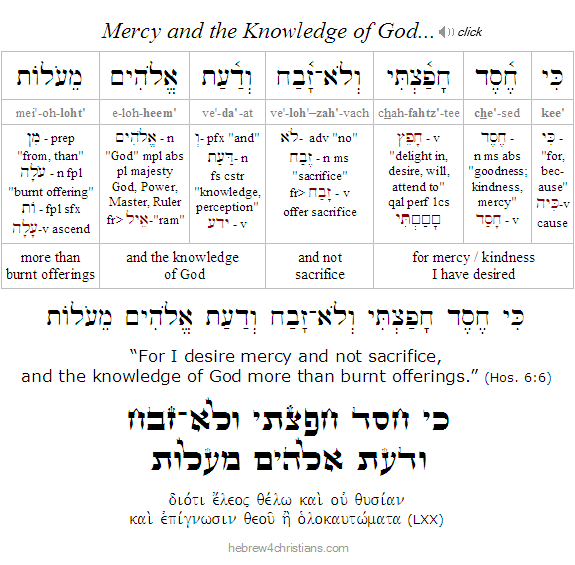 |
The Fear of the LORD...

03.09.23 (Adar 17 5783) Some people are afraid that God will punish them for their sins, but the true fear of God, yirat shamayim (יִרְאָת שָׁמַיִם), is the tragedy of losing our closeness to Him... This is the fear of the Lord. The sages say that where it is written, "What does the LORD ask of you except to fear the LORD" (Deut. 10:12), we should read instead, "fear with the LORD" (לְיִרְאָה אֶת־יְהוָה), that is, we share his concern that we might forfeit the sanctity of a heart-relationship with Him due to carelessness and sin... We fear our sin because it blinds us from awareness of God's care and love. The fear of God can therefore be understood as God's fear that we will miss the blessing of intimately knowing him.
The LORD has promised to never leave nor forsake us, though we can choose to turn away from his love and care for our lives... We are not permitted to fear other than that we have no fear of God, for that indeed is a fearful state of soul. May it please God to help each us never to leave nor forsake ourselves by getting lost, by forgetting what is real, and by abandoning hope in the miracle for our lives... May the LORD help us not be grieved, not to hurt ourselves, and never to abandon our hearts to the despair of shame...
Note that the fear of the LORD, or "yirat Adonai" (יִרְאַת יְהוָה), is not the fear of punishment but rather the awe of God's love and intimate concern for your life... It is "techillat chokhmah" (תְּחִלַּת חָכְמָה), "the start of wisdom," imparting awareness of the sacred gift of your life, your destiny, and your true end before heaven... If there is a negative aspect to the "fear of the LORD," it may be regarded as the fear of damage to your heart and soul – that is, the fear that sin will blind you to God's passion for you...
Hebrew Lesson
Prov. 9:10 Hebrew reading:
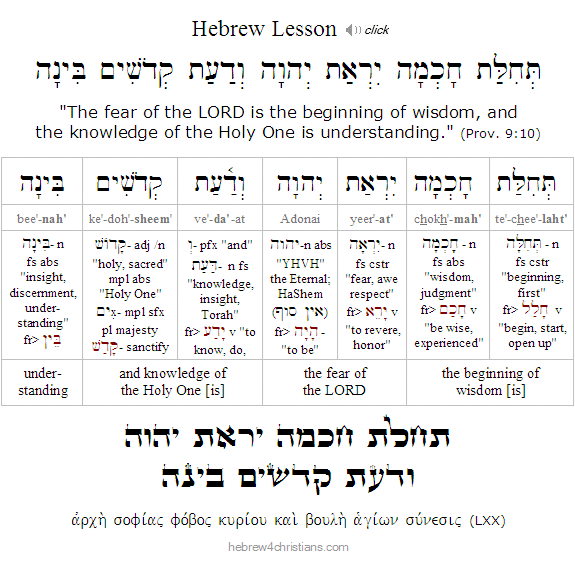 |
Some may object that all people (including unbelievers) should fear God (i.e., because God might send them to hell), but that appeal only makes sense if we assume the person has some sort of faith - no matter how indistinct or rudimentary... But a guilty conscience does not indicate spiritual rebirth, though it may be a step on the way... The doctrine of the wrath of God is an important thing to consider, to be sure, and it is profoundly connected with his holiness and righteous judgment regarding sin, but it is essentially eschatological, a reciprocal response of heaven that ratifies the individual's willing rejection of God's salvation given in Yeshua, the one who mediates God's truth and his mercy (see Psalm 85:10). For the believer in the One who loves us so much he became the "Son of Man" to die as our substitutionary sacrifice, however, the fear of God is better expressed as reverent awe over his compassion: "That Messiah may dwell in your hearts through faith -- that you, being rooted and grounded in love, may have strength to comprehend with all the saints what is the breadth and length and height and depth, and to know the love of Messiah that surpasses knowledge, that you may be filled with all the fullness of God" (Eph. 3:17-19)."
 |
Torah of the Sabbath...

[ The following is related to our Torah reading this week, parashat Ki Tisa. Please read the Torah portion to find your place here... ]
03.09.23 (Adar 17 5783) Every Shabbat we recite kiddush and remember that God is both our Creator (Gen. 1:31-2:3; Exod. 20:8, 31:7) and our great Redeemer (Deut. 5:15). As it says in our Torah portion for this week (Ki Tisa), "Above all you shall keep my Sabbaths, for this is a sign (אוֹת) between me and you throughout your generations, that you may know that I, the LORD, sanctify you. You shall keep the Sabbath, because it is sacred for you, as a covenant forever (בְּרִית עוֹלָם)..." (see Exod. 31:12-17). When we usher in Shabbat on Friday evening, we bear witness that God is our Creator, our Redeemer, and our Savior. Note that the Hebrew word for "sign" (אוֹת) is formed using a Vav (וֹ) surrounded by an Aleph (א) and a Tav (ת), a word that pictures being surrounded by God's Presence. We enter into the all-encompassing rest that God provides - relying on His power and grace alone to make us whole. "It is finished," and the Sabbath testifies of the rest we have in Messiah, our Creator and Redeemer. We let go and are renewed by the grace of God.
Hebrew Lesson
Exod. 20:8 Hebrew reading:
We are not legalistic about Sabbath observance, of course, since that surely misses the point. As Yeshua taught us: "The Sabbath was made for man, not man for the Sabbath" (Mark 2:27). Note that well. The Sabbath was made -- it is the result of God's work performed on our behalf: "Come unto me, all ye that labor and are heavy laden, and I will give you rest" (Matt. 11:28). There remains a "Sabbath rest" for the people of God, which is the principle of God's power effecting life within us and resting in his provision. The Sabbath is a delight – not a burden; a time for celebrating the finished work of Yeshua (Isa. 58:13; Heb. 4:9).
And of course the principle of Sabbath "surrender" applies to every day of our lives. After all, the "daily sacrifice," or korban tamid (קָרְבַּן תָּמִיד), was offered to the LORD every morning and evening upon the altar, which means we find our rest in Him every day, trusting in his sacrificial love to do the work of salvation within us... Surrendering to this truth enables us to be a "living sacrifice" (i.e., korban chai: קָרְבָּן חַי) and to die daily (Luke 9:23).
It is clear that the Sabbath will be honored in the Millennial Kingdom to come, and indeed, in heaven itself. Speaking of the coming Kingdom of God that will be established upon the earth, the prophet Isaiah foretold: "From new moon to new moon, from Sabbath to Sabbath (שַׁבָּת בְּשַׁבַּתּוֹ), all flesh shall come to worship before me, declares the LORD" (Isa. 66:23). Since this vision concerns the prophetic future, it is clear that the Sabbath day (as well as Rosh Chodesh, or the new moon) will be observed as well. Likewise, in the heavenly Jerusalem to come, the Tree of Life is said to yield "twelve kinds of fruit, yielding its fruit each month" (Rev. 22:2). Notice that the "twelve fruits" (καρποὺς δώδεκα) from the Tree of Life are directly linked to the "twelve months" of the Jewish year (κατὰ μῆνα ἕκαστον ἀποδιδοῦν τὸν καρπὸν αὐτοῦ: "each month rendering its fruit"). In other words, the sequence of the holidays (i.e., the mo'edim) - including the weekly Sabbath - was intended to teach us revelation about God.
Hebrew Lesson
Isaiah 66:23 reading with commentary:
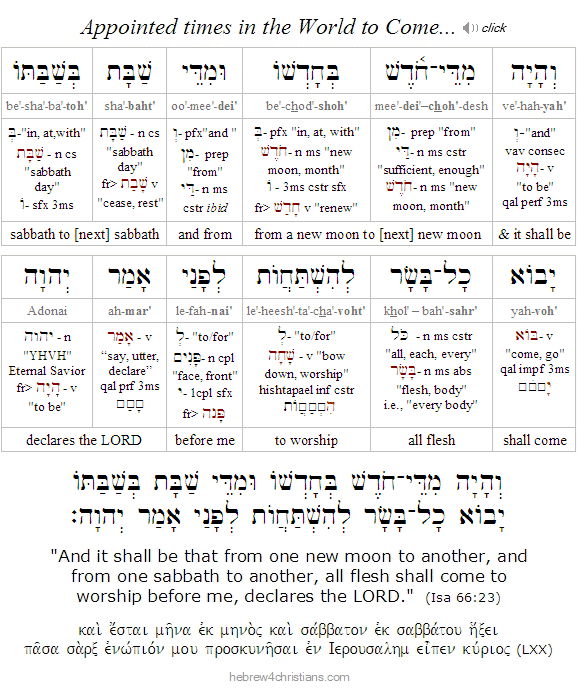 |
Healing the Sick Soul...

03.09.23 (Adar 17 5783) Sickness of the soul is just as serious as sickness of the body, and indeed many of our physical sicknesses come from being sick at heart - by living in fear or despair, or by allowing unresolved guilt or anger to destroy ourselves. The Scriptures state that just as a body can become sick with illness, so can the soul: "I said, 'O LORD, be gracious to me; heal my soul (רְפָאָה נַפְשִׁי), for I have sinned against you'" (Psalm 41:4).
Hebrew Lesson
Psalm 41:4 reading (click):
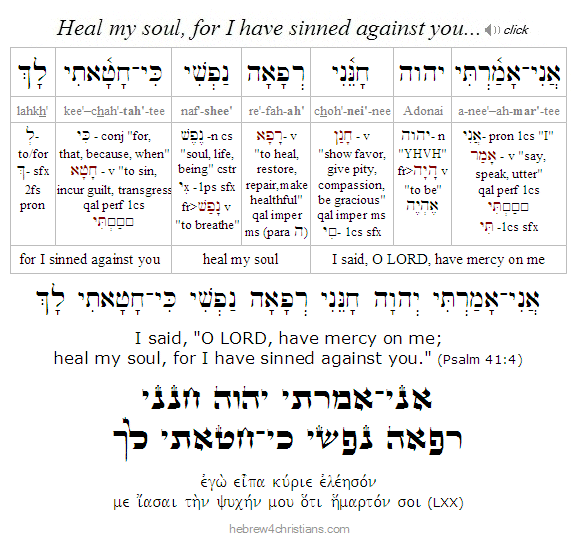 |
Note the connection between healing of the soul and the confession of sin in this verse. Often we are sick because of inner secrets that need to be brought to the light (1 John 1:9). "Therefore, confess (ἐξομολογέω, lit. 'confess out') your sins to one another and pray (εὔχομαι) for one another, that you may be healed. The prayer of a righteous person (i.e., tzaddik) works great power" (James 5:16). Being yashar - honest and upright - produces spiritual power and life. The word translated "pray" (euchomai) means to "wish (εὐχὴ) for oneself (or for another) the good." Confession (ὁμολογία) means bringing yourself naked before the Divine Light to agree with the truth about who you are. Indeed, the word homologeo literally means "saying the same thing" - from ὁμός (same) and λόγος (word). We need to confess the truth if we are to be free from the pain of the past.
Followers of Yeshua are called to be healers (Luke 9:1). The most common word for healing in the New Testament is therapeuo (θεραπεύω), a word that means to serve, to care for, and to restore to health. Unlike showy ministers who draw crowds to demonstrate the power of miraculous "faith healing," spiritual healers take the time to listen to others, to hear their pain, and to extend compassion and grace to them. They help open the inner eyes of the heart by extending hope and a new vision about what is real... Indeed, lasting healing focuses less on being cured than on finding a hope that will never die.
Postscript: What eternal good would it do, after all, to be "cured" of some disease if a soul was not also delivered from the power of darkness and sin? What would such "healing" mean, in light of the truth of eternity? After all, if the evil one may afflict people with sickness, surely he may also remove it to keep a person in a state of bondage... Some people, after frantically searching for a cure to their sickness, finally must let go and accept that they are going to die... If they have come to real inner peace, if they hold hope of eternal life within them because of the message of Yeshua, then even though they might not be physically "cured" in this world of shadows, they are indeed forever "healed" for life in the "high country" of the world to come...
 |
The Limits of Science...

[ "Science, like any other human aspiration, is liable to self-deception. If we are uncritical we shall always find what we want: we shall look for, and find, confirmations, and we shall look away from, and not see, whatever might be dangerous to our pet theories." - Karl Popper ]
03.08.23 (Adar 16, 5783) Part of what "renewing your mind" means is learning to question the assumptions of worldly culture and resisting the temptation to flow with "preconscious" acceptance of habitual ways of seeing and thinking. Take the enterprise of "science," for example, and the frequent appeals made by its advocates that modern science should be regarded as the voice of authority about what is real... Just a moment of reflection, however, will indicate that the scientific enterprise is a faith system that inescapably believes many metaphysical (i.e., non-scientific) axioms, including assumptions about time (i.e., that the future will "resemble" the past), about motion (i.e., that natural processes are "uniform"), about space (that there is an external world that is knowable to the human mind); about the capability of the mind to define and represent things (e.g., that measurement "makes traction" or "corresponds" with this external world and can be used to predict outcomes); about values (i.e., that it is "better" to know rather than not to know; or that the scientific method is an "good way" to develop inductive inferences, or that a given theory is "elegant," etc.). Note that not one of these various axioms are based on the scientific method itself (which is based on evidence and repeatable empirical measurement), but they are brought to science as assumptions used to frame or organize a particular "paradigm." In other words, science is a system of faith about what constitutes "reality," and like any other faith system, it needs to undergo testing to see if its inferences and claims provide the best explanation for what is real. For instance, does the naturalistic view of reality espoused by evolutionary cosmologists best explain the meaning of life? Does it account, for instance, for the origin of the electromagnetic pulse of the individual human heart? For the aesthetic wonder of the beauty? For poetry, or the longing of heart for love? for friendship? truth? for eternal life?
There are limits of scientific knowledge and its apprehension of reality (as clearly explained by Immanuel Kant). Do phenomenal cause and effect inferences have anything to say to us today? Of course *good* science is a humble endeavor because it realizes its conclusions are tentative and subject to falsification. Good science that is based on verifiable research that has undergone the rigors of peer-reviewed testing is an avenue of knowledge about things, though of course it is not infallible. Moreover, not all that is claimed to be "good science" deserves the title. Some science is "politicized" and other "science" is employed for purposes of manipulation and marketing. Other science is wildly speculative and undeserving of the name "science" itself. For example consider that the theory of macro evolution that claims (without any empirical evidence whatsoever) the universe simply exploded into being out of absolutely nothing for no logical reason whatsoever... It should be obvious that if we define science as "the observation, identification, description, experimental investigation, and theoretical explanation of phenomena," macro evolutionary theory does not qualify as science, since it is not based on the direct observation of how the universe originated, etc., though the observation of expected results if it were true can be admitted, so long as it is understood that such evidence is inductive and therefore not demonstrable by logic (that is, if p then q, q, therefore p is not a valid form of reasoning). And as for the "noumenal" realm of reality, silence cannot comment. "Whereof one cannot speak, thereof one must be silent."
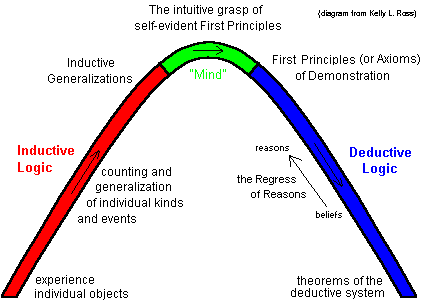 |
Many people ascribe to "science" godlike powers that it simply does not have, just as are many people are unaware that science is grounded in philosophical assumptions that transcend the realm of scientific knowledge altogether. It is wise, therefore, when presented with a scientific claim that something is true, to respectfully ask for the logical reasons and the warrant (i.e., datasets, methodologies, etc.) for believing the claim is justified. Remember that relying on self-professed testimonial is not sufficient warrant since such testimony may be biased, as for example when pharmaceutical companies claim the efficacy of a particular medication or vaccine. As a matter of fact, genuine scientific consensus is rare, and we should remember that scientific knowledge is an ongoing process that ever-approximates what is true. For example, it was not long ago that science thought the earth was flat, that leeches and bloodletting were prescribed to cure illnesses; that phrenology and lobotomies were used to "cure" mental illness, and so on. Be wise and test truth claims, chaverim.
If there are peer-reviewed studies that independently confirm the probable truth of a given hypothesis, then that is to be respected and taken into consideration, but unthinking acceptance of statements made by unqualified authorities (such as politicians, mass media broadcasters, or pharmaceutical CEOs, etc.) about the efficacy or interpretation of scientific data is not.
"Of all tyrannies, a tyranny sincerely exercised for the good of its victims may be the most oppressive. It would be better to live under robber barons than under omnipotent moral busybodies. The robber baron's cruelty may sometimes sleep, his cupidity may at some point be satiated; but those who torment us for our own good will torment us without end for they do so with the approval of their own conscience." (C.S. Lewis: God in the Dock)
Hebrew Lesson
Proverbs 14:15 Hebrew reading:
Testing Scientific Truth Claims...
Here are a few things to consider when evaluating scientific claims. Check to see how a given piece of scientific reasearch was conducted and look for the following:
- Are there any conflicts of interest, for instance was research funded to support the claims made by an advertiser, company or pharmaceutical? "Dr. Faux says the vaccine is safe and effective" even though he obtains handsome royalties from vaccine makers.
- Might there be a false cause or correlation for the conclusion? A coincidental correlation of data does not necessarily imply causation. "Vaccines heal infection because vaccinated people later do not have an infection." There might be other reasons...
- Is there any question begging or suppression of contrary evidence? "Boosters help fight against infection because they increase the protection of the vaccine." Not so fast; you are assuming the conclusion before stating your premise... Regarding data suppression, questions must be asked regarding the integrity of the data collection methodoloies. For instance, may there be supression of the inefficacy of vaccines (or vaccine injury) regarding statistical outcomes? Is "CRP" testing an accurate method or not?
- What sample size was used? Might there be hasty generalization? ("After extensive testing, we have found these results" - when the sample size was statistically insignificant in relation to the population. This is the fallacy of composition, that is, that since a small group has a characteristic, then so does the whole group.
- Control groups must be used. In a scientific study, a control group is used to establish causality by isolating the effect of an independent variable. Researchers change the independent variable in the treatment group and keep it constant in the control group. Then they compare the results of these groups. However, in reality it is nearly impossible to have two groups that are entirely similar to each other, so often other factors must be investigated before a conclusion may be reached.
- Is there "cherry-picked" data or the suppression of data that would affect the conclusion of the research? "Cherry picking is the deliberate practice of presenting the results of a study or experiment that best support the hypothesis or argument, instead of reporting all the findings" (Morse, 2010). There is fradulent science in the world today. For example, the rank suppression of vaccine injury claims and the outright censorship of contraindicated data points leads to unwarranted claims of safety and efficacy.
- Are there significantly accredited peer reviewed studies? Research published by experts and are reviewed by other experts in the field before the research should be deemed accredited. Of course there is the possibility of scientific collusion of fraud between researchers, and that would need to be investigated as well. Ideally, peer-reviewed studies should both support the conclusion of the research as well as qualify the results in case there are errors in the methodologies that have been overlooked or minimized.
- Has the science become "politicized"? For instance it has been disclosed that there was illegal collusion between governmental agencies and social media giants such as Twitter, Google, and Facebook to suppress testimonials regarding adverse reactions and dangers of Covid vaccines. Is the "science" being used for propaganda or control purposes? Corrupt governments have long used lies and disinformation to instill fear in those they govern for their own political advantages. Sadly there are serious reasons to investigate this possibility regarding scientific claims today, particularly about medicine. Let's not forget the persecution of countless people for having "vaccine hesitancy," or the draconian policies of educational institutions, governmental agencies, military chain of command, and so on, that resulted in loss of jobs and emotional pain to many people. Let's not forget the vilification (and "canceling") of doctors of science and medicine because they expressed intelligent reservations about the "one-size-fits-all" propaganda model used for administrating a response to the Covid epidemic.
 |
Purim and Deliverance...

03.07.23 (Adar 16, 5783) Do you remember this scene from the Fiddler on the Roof? A young man named Labish approaches the dear and wise old Rabbi and asks him, "Is there a proper blessing for the Czar?" Everyone is astounded at the idea. A blessing for the czar? The gentle Rabbi responds that indeed there is indeed a proper blessing for the czar: "May God bless and keep the Czar -- far away from us!" (Amen!)
The holiday of Purim is one of the most joyful of the Jewish year. We remember that long ago, in the city of Shushan (in ancient Persia), a wicked political sycophant named Haman attempted to blame the Jews for being different and to initiate a pogram for their extermination. The Jews were saved through the intervention of a queen named Esther (Hadassah) and her cousin Mordechai, both of whom were providentially enabled by God to overturn the evil decree of the King of Persia (the story is told in the Book of Esther). Throughout the centuries, in various places, many others have likewise tried to destroy the Jewish people, but none has succeeded. עַם יִשְׂרָאֵל חַי / am Yisrael chai: "The people of Israel live!" God's sovereign hand works all things together for good, even if at times things appear bleak and desperate (Rom. 8:28).
Hebrew Lesson
Psalm 31:4 reading (click for audio):
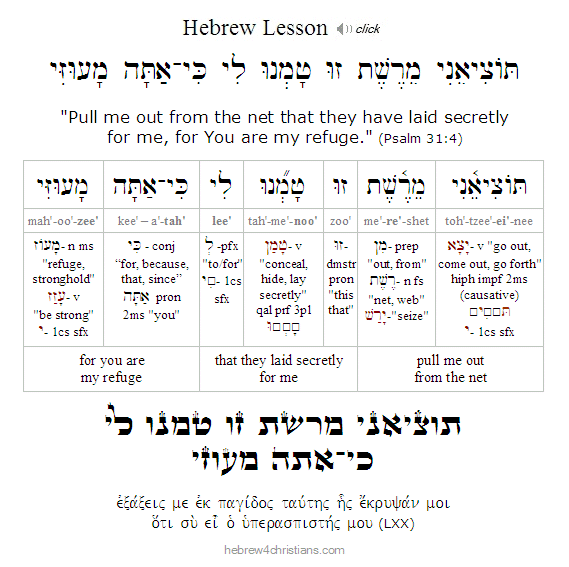 |
The name Purim (פּוּרִים) refers to the "lots" (i.e., dice) that Haman used to determine the "best day" to carry out their nefarious plan (there is irony regarding the word, however, since the word "pur" (פּוּר) also can refer to being "crushed" or "brought to nothing"). Haman's dice rolled "Adar 13," but since the Jews were delivered on the following day, the holiday is celebrated on the 14th of Adar. In other words, Adar 14 was ironically transformed from a day of potential tragedy and grief into a time of great rejoicing! (In Israel, Purim is observed a day later still (i.e., on Adar 15th) and is called Shushan Purim, since the deliverance of the Jews of Shushan did not occur until the 15th.) Among other things, the delicious irony of the Book of Esther reveals that there is no "chance" in God's universe, since He is the Master of the universe and supervises all it outcomes - even the "roll of the dice" (Prov. 16:33).
During the festive holiday of Purim it is customary to dress up in costume and listen to the Book of Esther (i.e., megillat Esther, מְגִלָּת אֶסְתֵּר, or "the megillah") recited from the Hebrew scroll (before we hear the Megillah read, we recite three Purim blessings). Some people will dress as the noble Mordechai, others as the foolish king Ahashuerus, others as Esther, and so on. Part of the fun is that we are told that it's very important that we hear every word recited clearly, so we must keep very quiet as the story is being read. However, whenever we hear the name "Haman," we whirl groggers (ra'ashanim), blow whistles, stamp our feet, and make such a commotion that we can't hear his name. This is the only time we are encouraged to be boisterous when the Scriptures are being read.
After reading the Megillah, many communities put on their own "purimspiel" (Purim play) to reenact the dramatic story, with children dressed up as the characters of the play... Others put on "Purim puppet shows" at this time. It is a time of merrymaking and fun. Later we eat a festive meal (called a seudah, סְעֻדָּה) and enjoy three-cornered pastries called oznei Haman (אָזְנֵי הָמָן), or "Haman's Ears," for dessert (legend says that Haman's ears were twisted and triangular in shape). In Yiddish, these are called a hamantaschen (המן־טאַשן) and are often filled with prunes, chopped nuts, apricots, apples, cherries, chocolate, and so on. Eating Haman's Ears fit the delicious irony recounted in the Book of Esther....
 |
Esther and God's Providence...
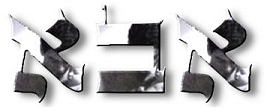
03.07.23 (Adar 15, 5783) Much is made over the fact that the book of Esther is the only book of the Tanakh that does not explicitly mention the Name of God. However, the idea of God's sovereignty and hashgachah (divine providence) is clearly implied throughout the entire story. Indeed the sages teach that the message of Purim concerns the kingship of God (ממלכת האל), with the word "the king" (המלך) appearing over 100 times and the word "kingdom" (מלכות) appearing ten times in the scroll. In most cases the word "king" refers to King Achashverosh, though the sages say that when Achashverosh is not explicitly named, it may also refer to the King of the Universe.
The phrase hester panim (הסתר פנים) means "hiding of the face" and is often used when discussing the Book of Esther. In this sense of the term, hester panim is somewhat like the sun on an overcast day: Just because you don't see it doesn't mean it isn't there. God's providential love is at work at all times, whether we perceive it or not. This is suggested in the name of the scroll itself: the phrase Megillat Esther (מגילת אסתר), literally "the Scroll of Esther," can be rearranged to say megallat ha'seter (מגילת הסתר), "the concealed scroll."
In light of this nes nistar (נס נסתר), or "hidden miracle" of the Jew's deliverance, Esther and Mordecai ordained that Purim should be observed as a "day of feasting and merrymaking" and of sending gifts to the poor (Esther 9:22,28). By the way, Purim (פורים) was so named because Haman had cast lots (purim) to determine the day on which to destroy the Jews.
So what does Purim teach us? Well first of all it teaches that the LORD is in control of everything, even if may seem otherwise. Nothing happens apart from God's sovereign will, and therefore everything works together for the ultimate good for those who trust in Him (Rom. 8:28). The term hashgachah pratit (השׁגחה פרטית) refers to God's personal supervision of our lives (hashgachah means "supervision," and pratit means "individual" or "particular"). Since He is the Master of the Universe (אדון עולם), God's supervision and providence reaches to the smallest of details of creation - from subatomic particles to the great motions of the cosmos. God not only calls each star by its own name (Psalm 147:4), but knows each particular lily and sparrow (Matt. 6:28-30, 10:29). Each person created in the likeness of God is therefore under the direct, personal supervision of God Himself -- whether that soul is conscious of that fact or not. As Yeshua said, even the hairs on your head are all numbered (Matt. 10:30). The God of Israel is called אלהי הרוּחת לכל־בּשׂר / Elohei ha-ruchot lekhol-basar: "The God of the spirits of all flesh" (Num. 16:22), and that means He is LORD even over those who vainly attempt to suppress His Presence and reality. Second, Purim teaches that God's plans for Israel will never (ever) fail and that those who disregard Israel in their theology do so at their peril. Third, the story of Esther provides a warning for those tyrants and princes of this world who oppress God's people: Like the false usurper Haman, you are likewise doomed to failure, and the LORD will vindicate all who trust in Him for deliverance.
There is great comfort when we understand that God has complete authority over everything in the universe -- including our ultimate welfare (John 10:27-28). When we pray to the LORD God of Israel, we intuitively understand that He is completely sovereign and Lord over all things... All power, glory, authority, and dominion is His alone, and all that is in the heaven and in the earth is His (1 Chron. 29:11-12). We do not worry that He is somehow incapable of handling our troubles or that He is unable to help us. No, we acknowledge that the God most High (אל עליון) sustains all things by the Word of His power (Col. 1:17). He is "the blessed and only Sovereign, the King of kings (מלך המלכים) and the Lord of lords" (1 Tim. 6:15). Whenever we think clearly in light of the revelation of Scripture, we apprehend the truth about God's sovereign glory and power...
Hebrew Lesson
Proverbs 16:9 reading (click):
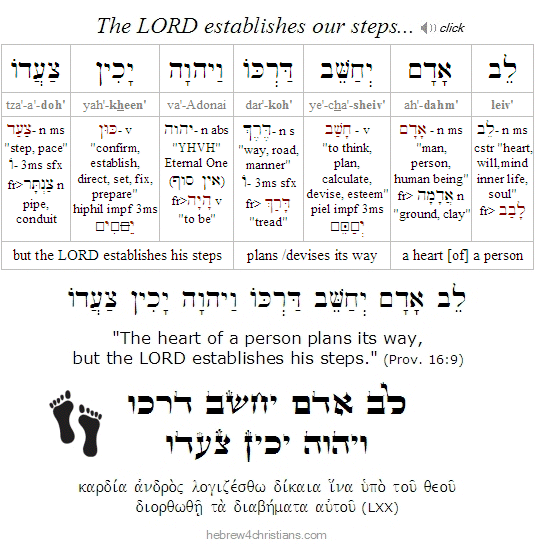 |
|













































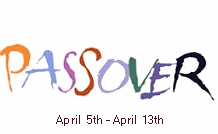

![Spring Holiday Timeline (H4C]](../../../../About_HFC/Site_News/Archive-2023/roshchodeshim-line.gif)
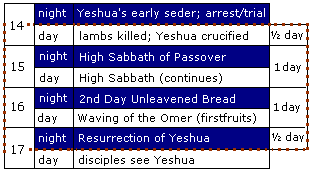







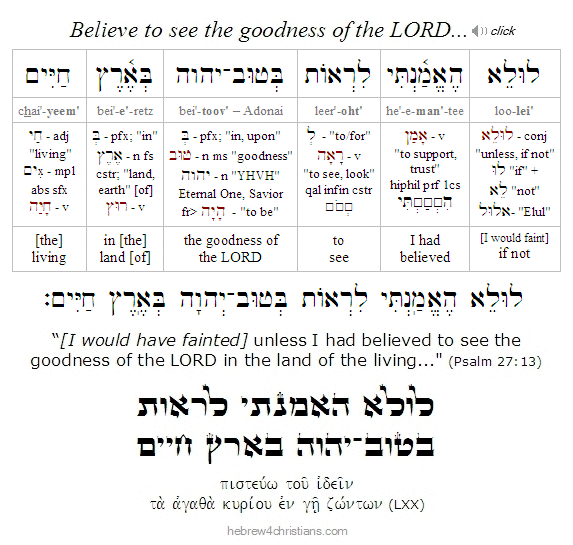
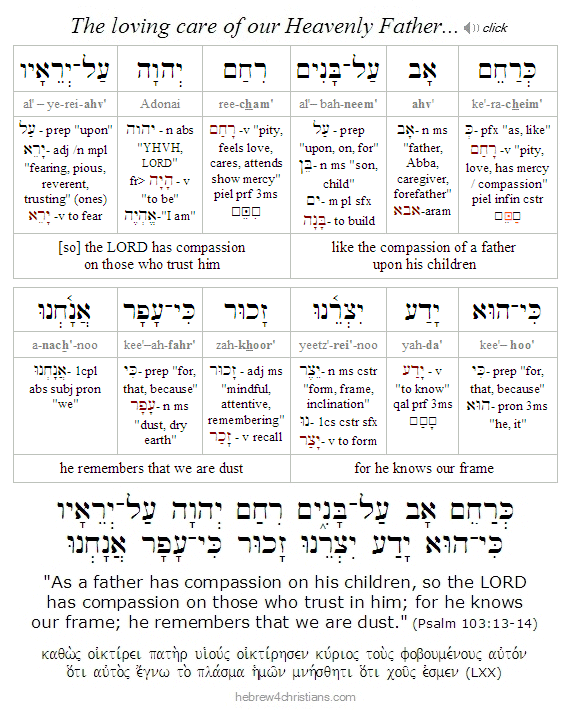

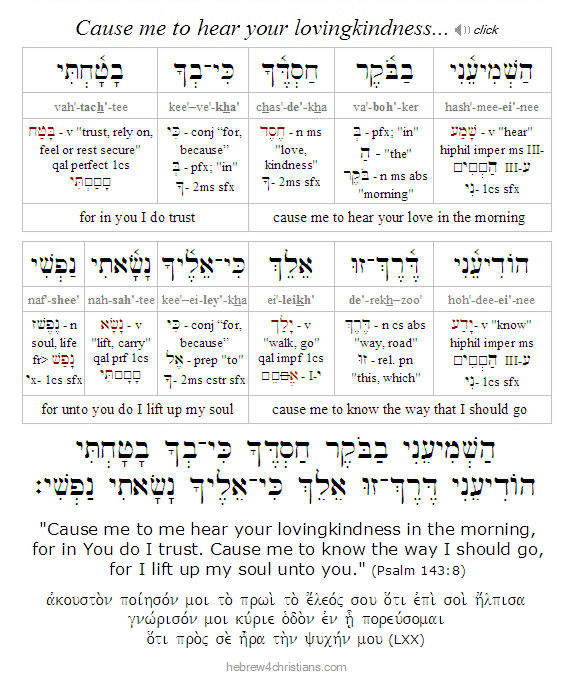

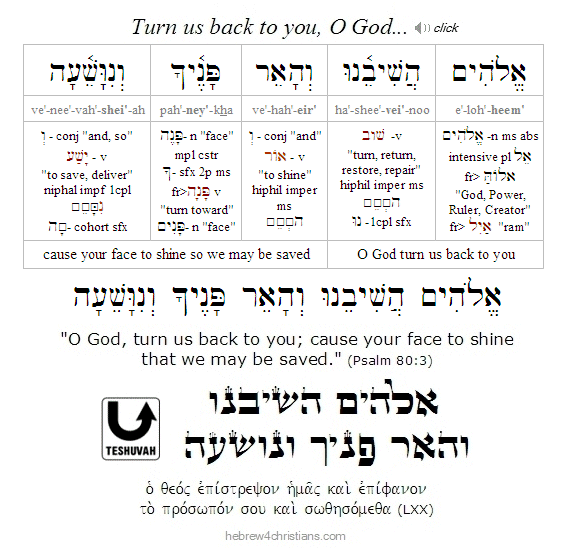
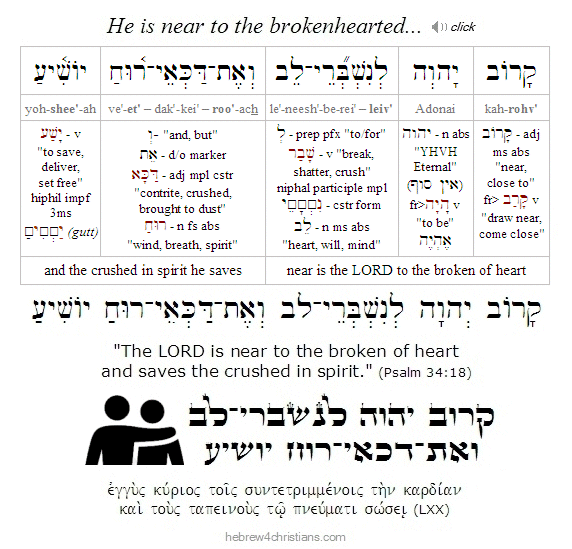





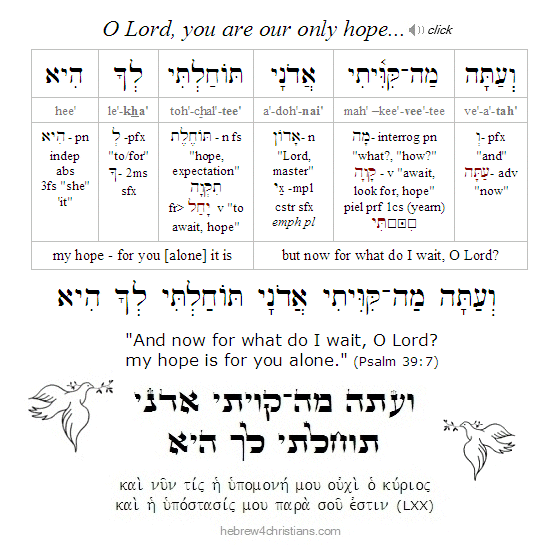
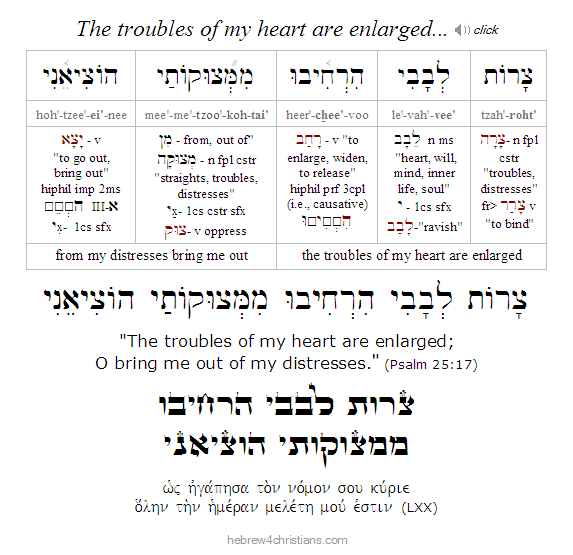
![Spring Holiday Timeline (H4C]](../../../../About_HFC/Site_News/Archive-2023/March/shabbathagaolline.gif)

